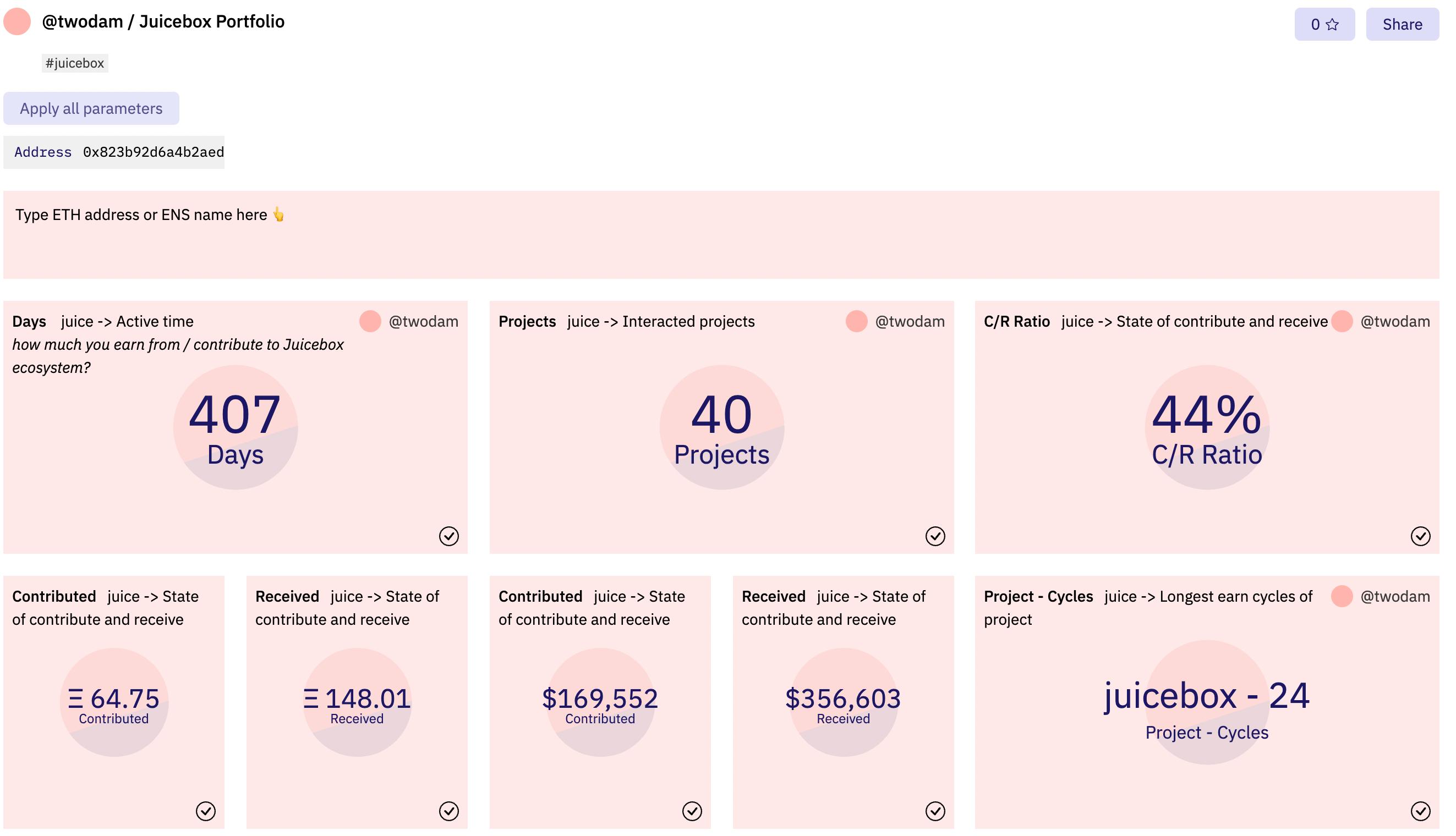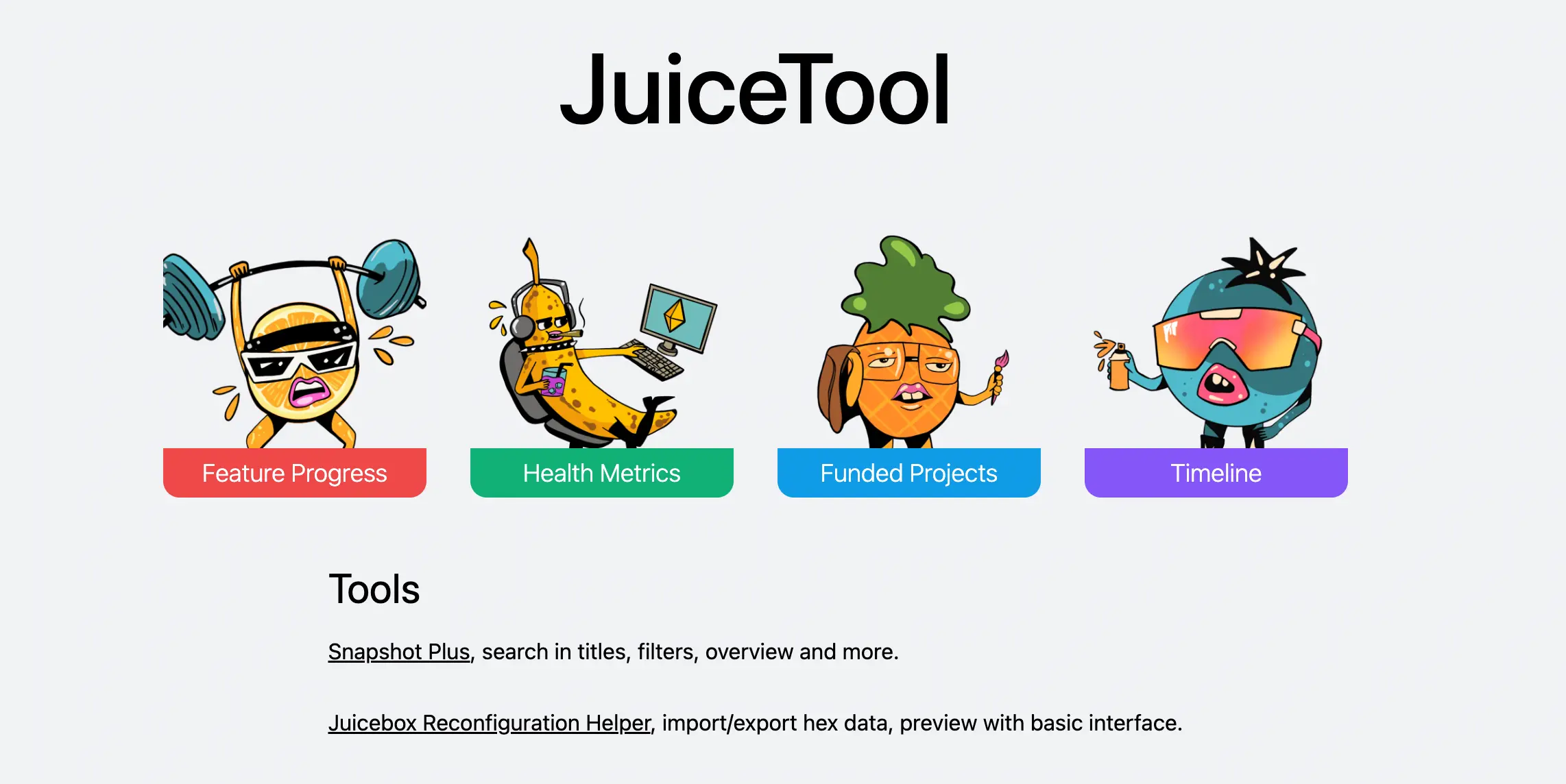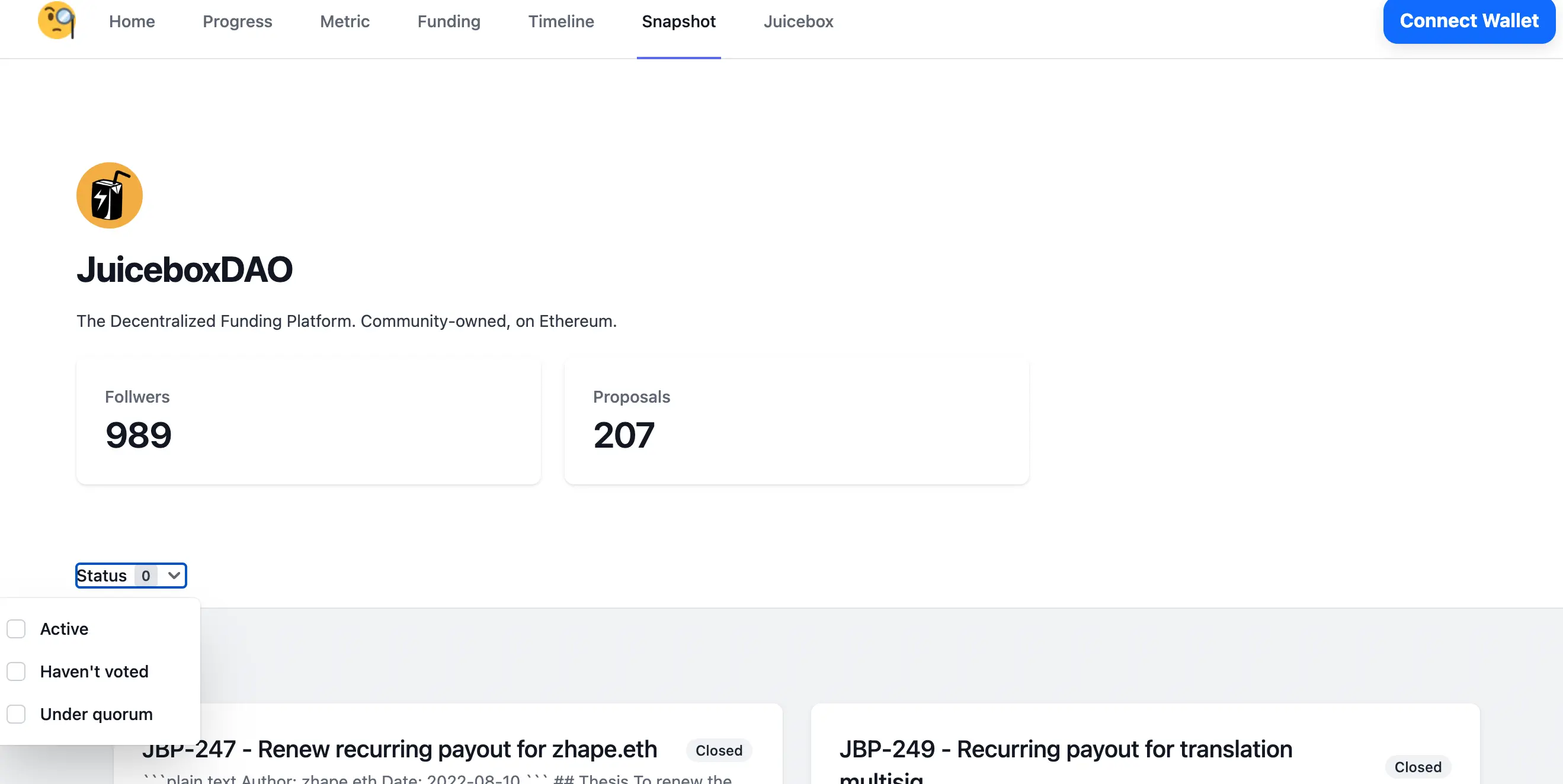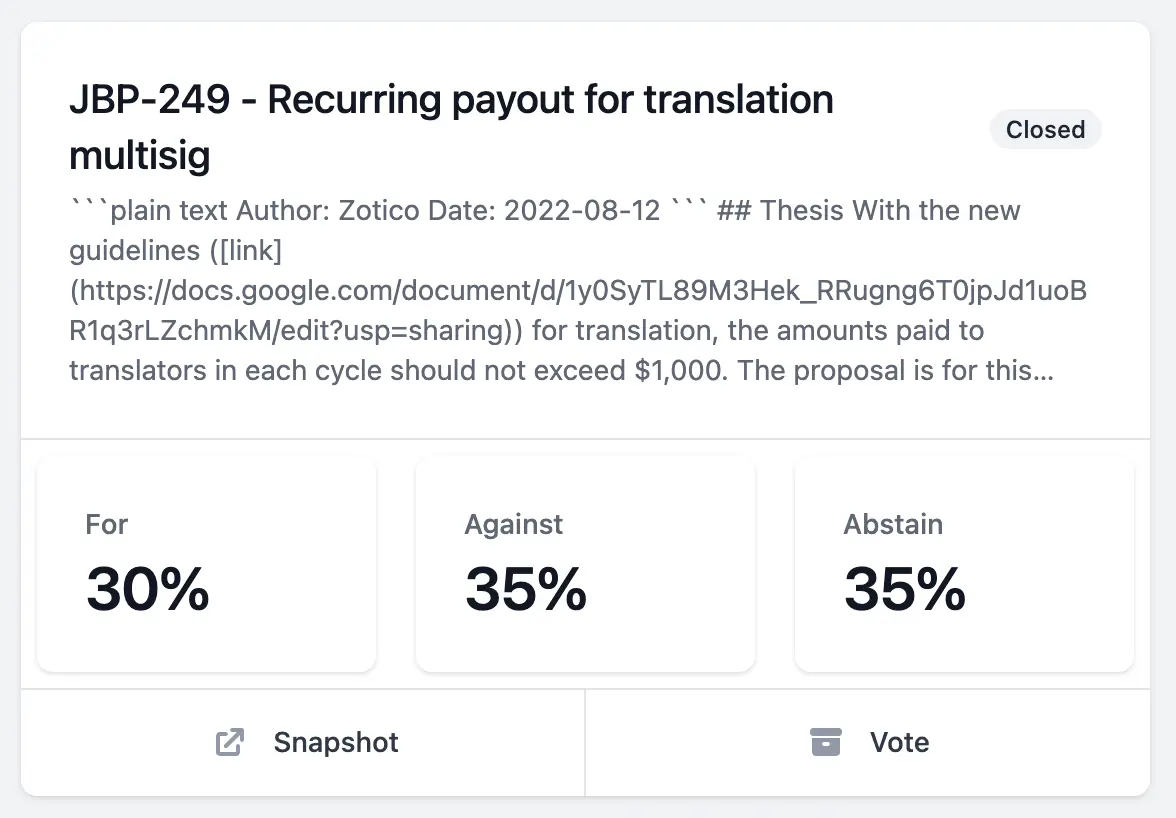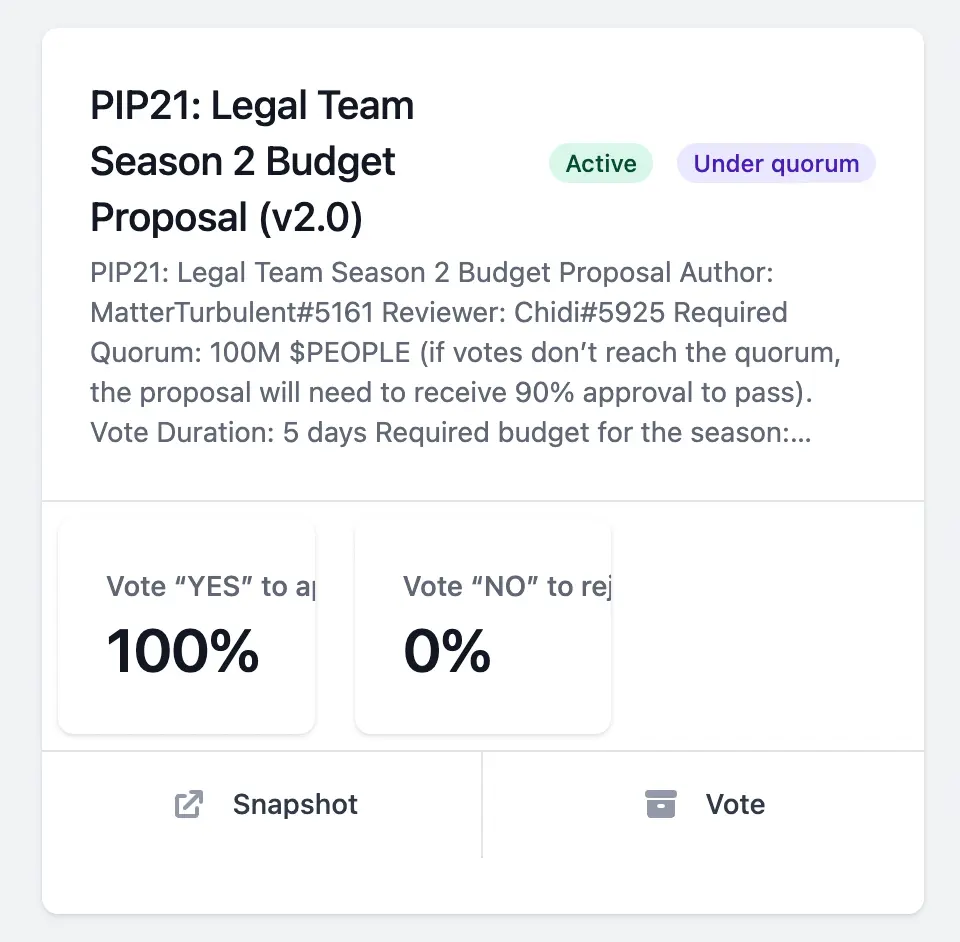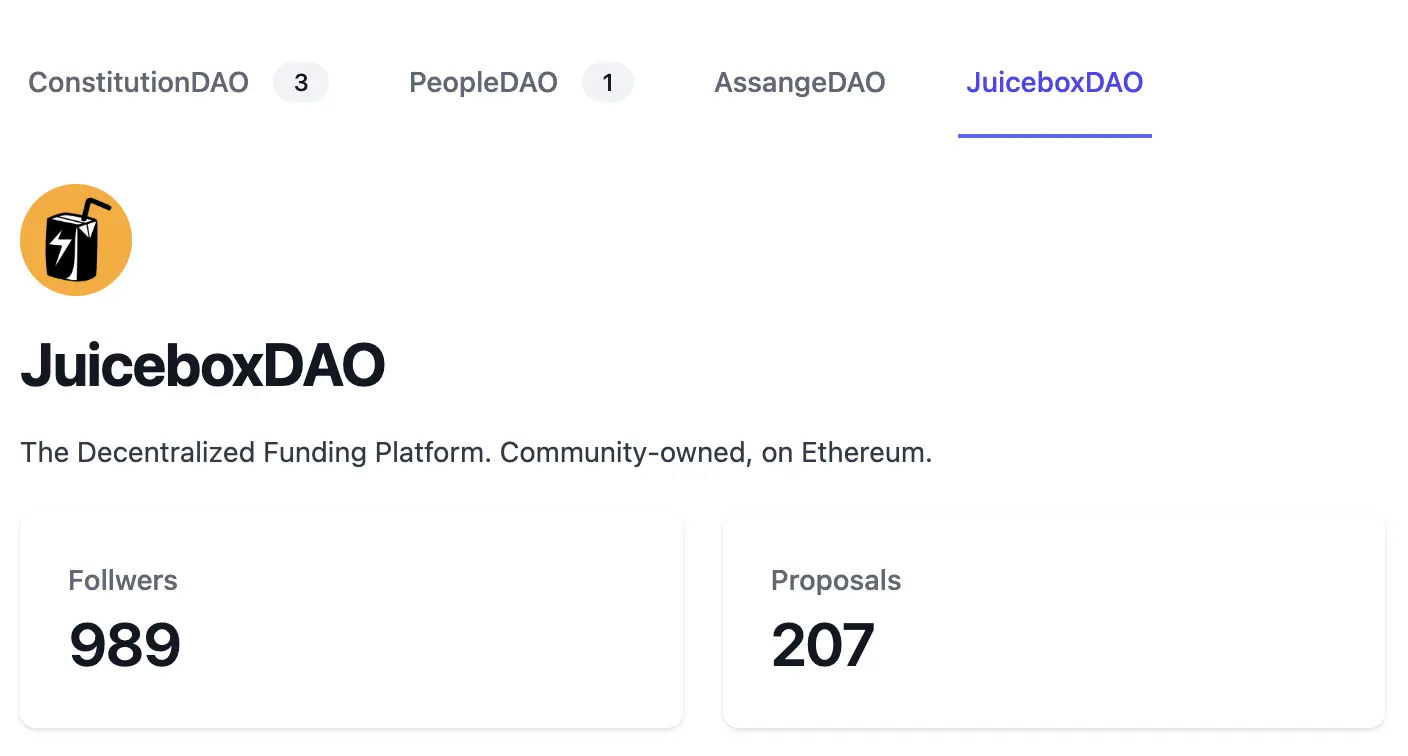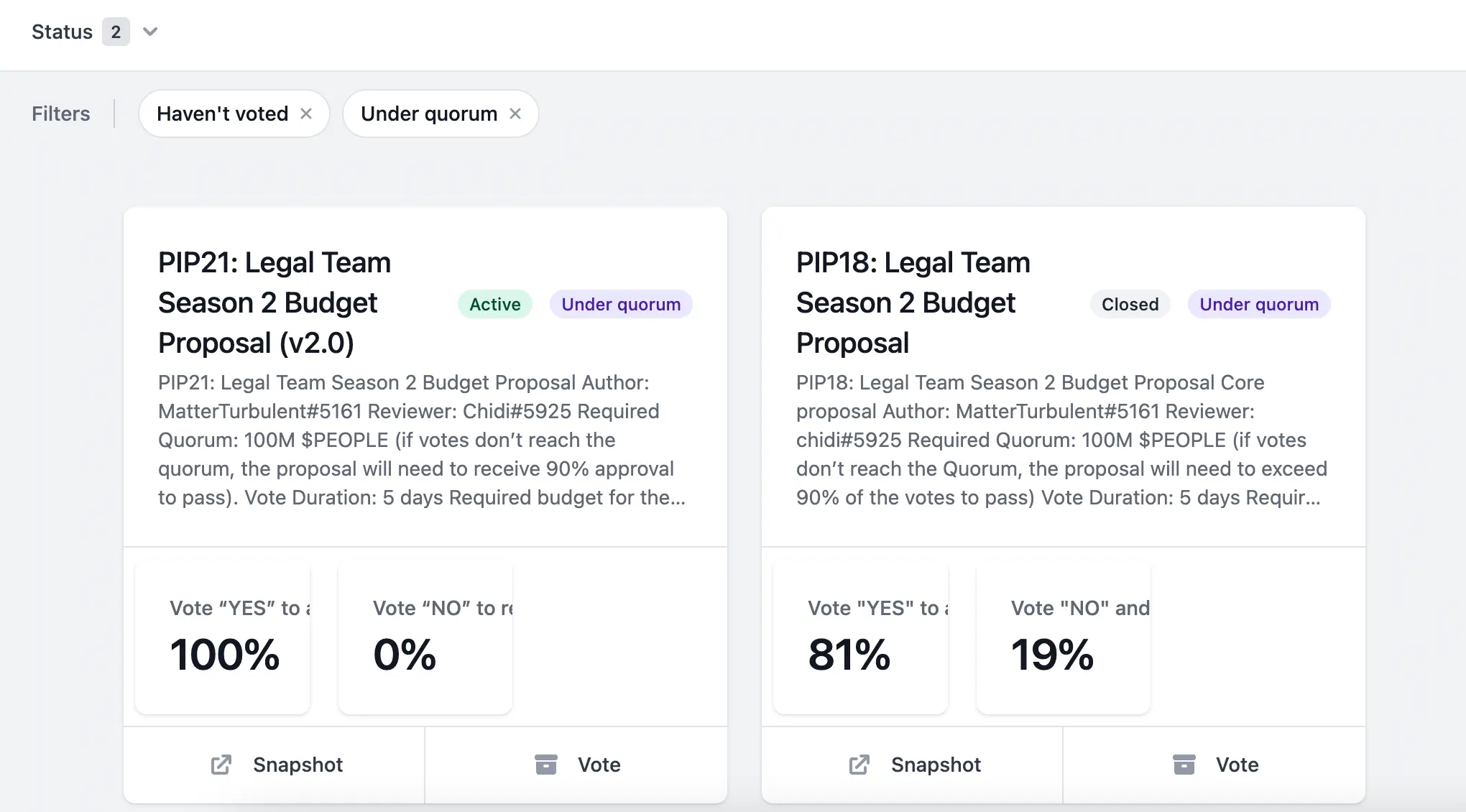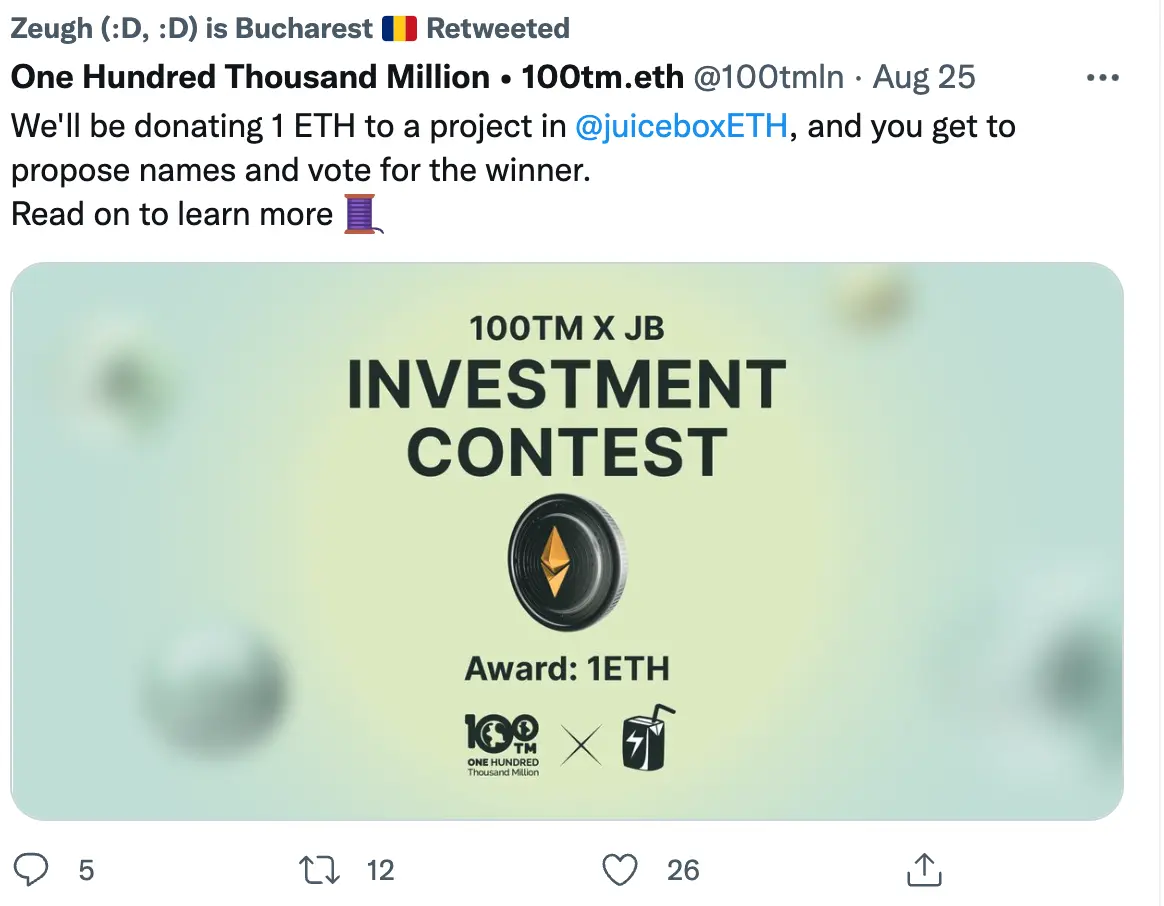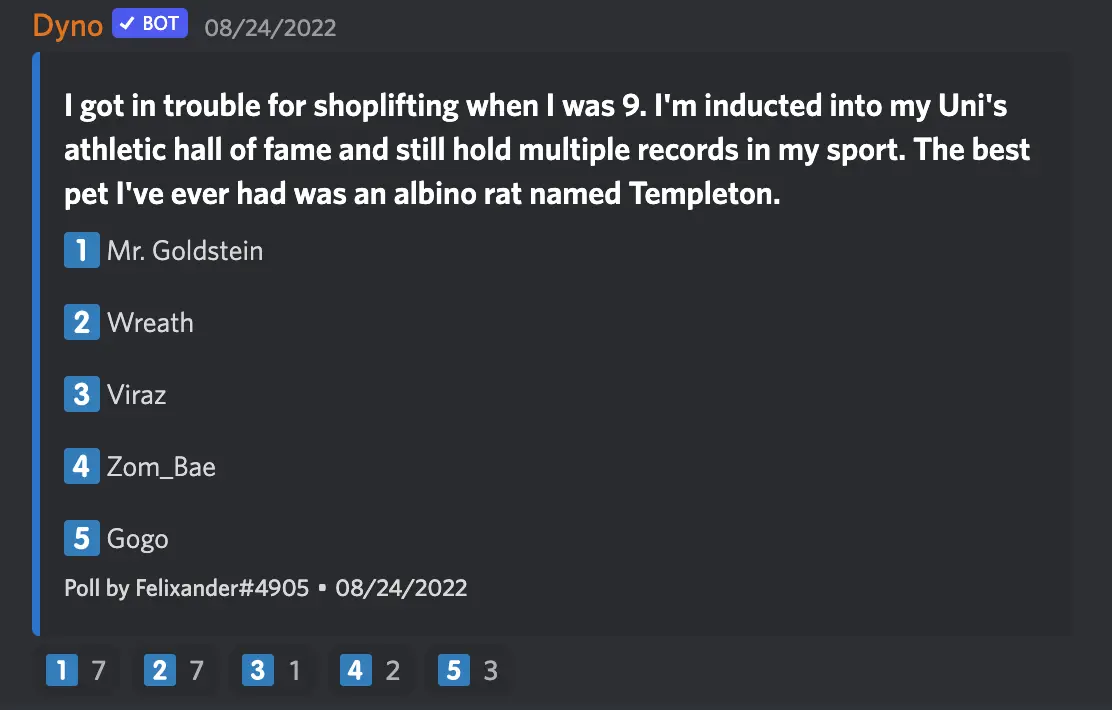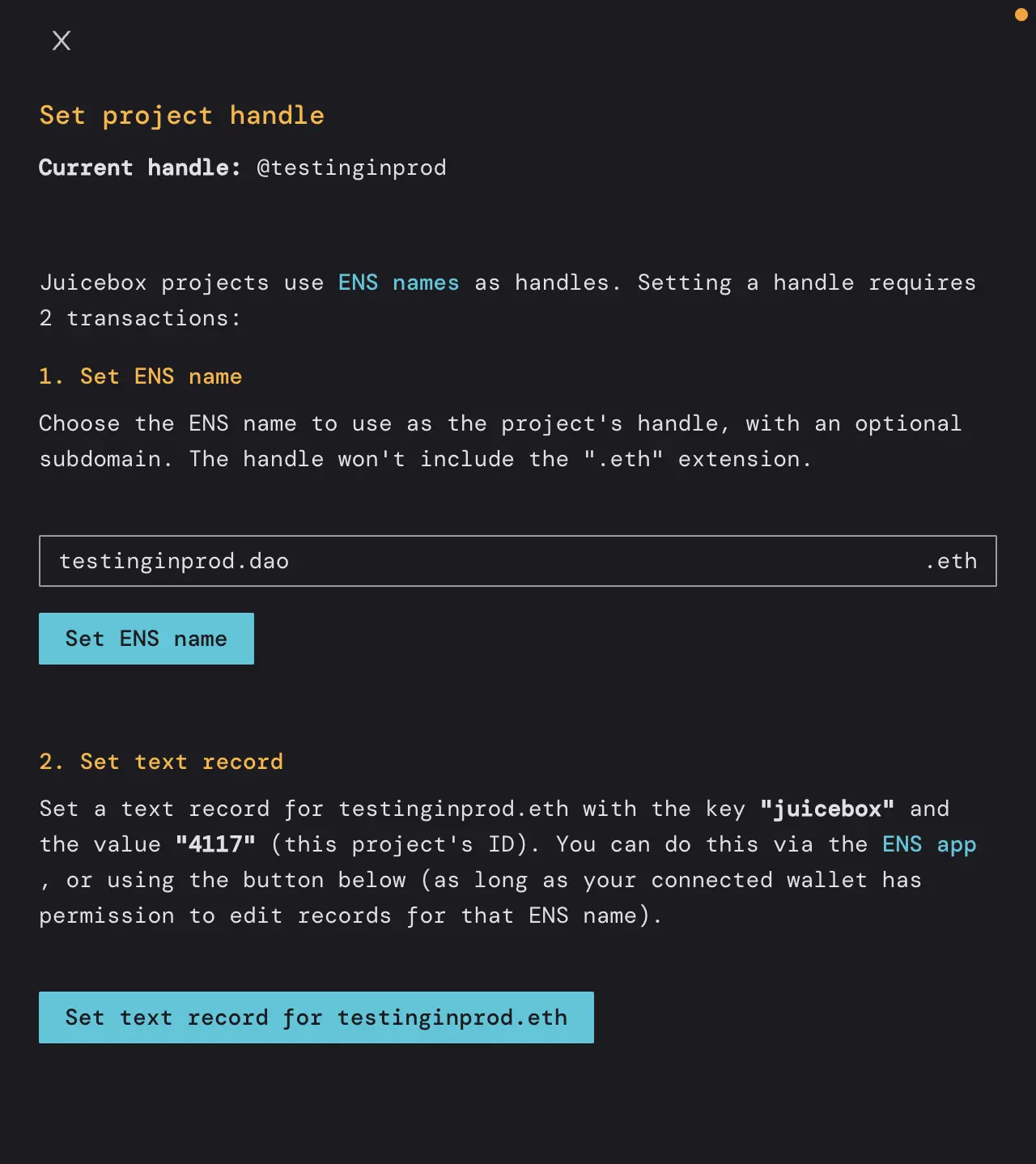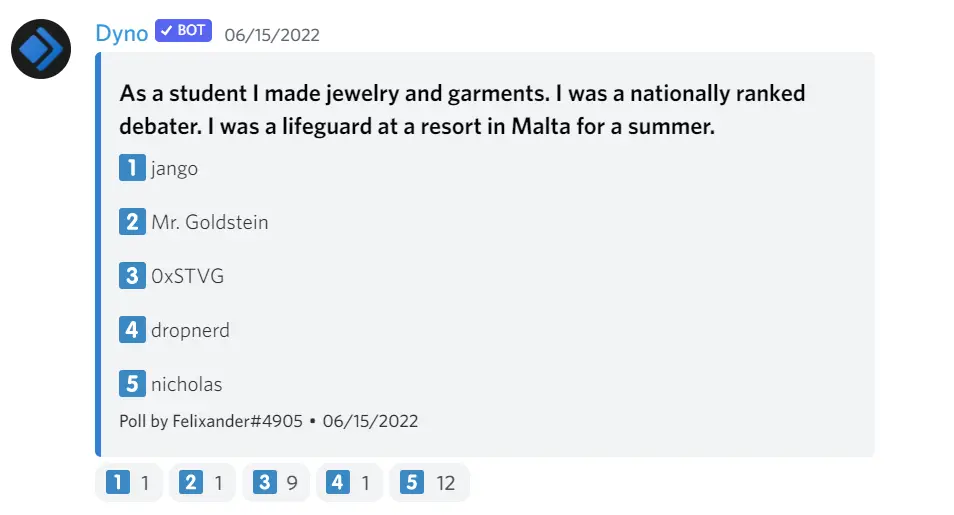Review of JuiceboxDAO x Morganstern's Ice Cream event with @Zom_Bae
Zom_Bae: I feel like the way we had it set up as Juicebox headquarters was fantastic. It was very nice for us to have one place to come together every single day and we know like what hours we were going to be there. I like the free flowing aspect of it where you know people who just come and go. For most part I think having projects running on Juicebox having the opportunity to post meetups was fantastic.
I think one of my biggest takeaways from it is that while we all kind of get to know each other by working together over Discord, Twitter or whatever it may be, I think getting to meet in real life and in person is invaluable. And this didn't necessarily start as like a Juicebox community meetup, it's kind of how it turned out and I'm glad it did. I think it strengthened a little bit our bonds and we created some. I think that was pretty magical and pretty special. I can't wait to do one on other continents so we can spread this Juicebox fan vibe everywhere. That was super cool.
I think there's a couple of things that weren't considered that we'll learn like through the process of doing it. One of the biggest things was the space isn't conducive to shitty weather. The weather was absolutely perfect the whole time we were there so our outside space was phenomenal. I think that's something we should take into consideration if and when we decide to do other events, I think that's a big one actually.
And then also it was just really rushed. The fact that we pulled this together in less than a month is pretty incredible. And the way it went so smoothly. It's pretty pretty dope got to say.
Let's see, a couple other things like I think just the short time span to get it all planned. Programming could have been a little bit better and I take full responsibility of that, but I think overall it's a fantastic event. It's got me chewing on this idea of what I've been spitting out as calling them like "unconferences" whether it's like NFT NYC or like the ETH conferences around the world. Just wear Juicebox clothes and plan something a little different so we can bond over fun things like cooking classes or we can go learn how to like surf or you know, jam sessions around a campfire because inevitably we're going to talk shop. It's like even when there were like meetup hours ever still was drawn to certain conversations and building and creating and how to make you know JuiceboxDAO Juicebox protocol the whole ecosystem better. So I really kind of like the idea of it if that makes any sense.
nicholas: I was really impressed. I think it's really cool that Juicebox funds a multi-day phase where Juicebox projects with smaller budgets can just create a little event without booking it from advance or too much prep. I think that's a really cool model that we discovered through this experiment.
Zome_Bae: A hundred percent. I wish more people took advantage of it, but being the first time and during quick time span. Yeah, I appreciate that a lot, too.
nicholas: Yeah, exactly. I think it's super powerful if there's enough density of Juicebox projects in a place. I think that's a pretty worthwhile governance proposal to fund to reserve a space that anybody can just come in and grab a slot. That's really cool.
Zom_Bae: Yeah, since you mentioned that I don't know if anybody noticed the Juicebox events project that I created right before this event. That's kind of the what my vision for that project was. I don't know I gotta think it out a little bit more but instead of trying to fund these project or these events all at once, you know, thirty thousand dollars was a lot for ice cream. It's something where we think this is worth doing to just pump a little money in every funding cycle. So it doesn't feel like such a big hit.
jango: Yeah, I feel really great about how this one played out. I think it's certainly something that was really interesting to see and the momentary aspect is awesome. I think ice cream sets a really cool tone, I think New York City set a really cool tone in that particular block in the city. It's a really cool tone Danny absolutely crushed it. And I'm excited to figure out how to support those and evolve those at the moment, but it's also going to be interesting to see what we do with everything that we dreamed up or felt or did in that moment.
Zom_Bae: And yeah, I had more than a handful of people. I think I just have this vibe like she doesn't know what crypto is. I'm not done people come up to me who are new to the space and we're just kind of timid but felt so comfortable around our group. She's like that people are just like everyone here is so nice and welcoming a couple of people.
I think it's a testament to our group of people and but that also actually reminds me of one thing in conferences like that. We should have better way to disseminate information not only for people completely new to web3 or crypto, but also for people who know the terminology and know all the technical aspects of it. Just finding ways to onboard the beginner which I know Juicebox might not be the best thing for beginners, but we can do it. I know that's the thing we can do so having whether preparing QR codes to send them to the educational tools whatever it may be. I think this will come into like the marketing realm and strategy realm down the road.
Kentbot: So it was fantastic and just as like someone who is launching projects having a place to just hunker down and be at home while you're trying to do it was super fantastic. So, thank you to everyone for making it so great and Zom_bae on the stage.
I got a text from Nick a couple of minutes ago, and he's so excited about the whole thing, he wants to actually take all of the flavors that we made and put them on the website and make them like actually permanently the Juicebox collection becomes like a part of what's for sale at Morgansterns. So I think that's super interesting just in terms of us starting something and this is now gonna have like some perpetual aspect to it. So, you know, we'll figure out what that means, maybe we can make like a buck a pint or something and put that into the Juicebox events and start to get like some money coming back into that. So maybe events could make money for us, like maybe at least cover their own costs.
Zom_bae: Yeah. For sure. Let's plan. That's so exciting. I'm glad he thought it went well, I didn't get a whole lot of time to talk to him because he was insanely busy. So I'm glad he's stoked to keeping on with us. That's great.
jango: Yeah, that dude's is seemed just eager to just get the ball rolling on crazy shit which is really exciting. And he leads us to a big wild ideas and is a very just get-shit-done like strict dude in person, which is a fascinating balance that he's of course.
He created a hell of it, we can make up like any flavor and I think from his perspective thinking about what a Morganstern's community funded ice cream flavor like monthly or whatever would look like and maybe certain cut of those sales go back into the community treasury, so there's like some incentive for the DAO to choose appealing flavors or wild flavors or whatever be a wild endgame for this stuff.
Zom_bae: jango's dropshot was the first one to go every single day. I was shocked. I think there was no way people were gonna order that, but they are gone.
jango: I was nervous. I wasn't sure like the day before it dawned on me like damn y'all, the shenanigans just don't resonate in real life like we've just been playing in crypto Twitter and Discord land.
Zom_bae: But yeah. So as everyone who was there you know has more time to think about it after this initial feedback there in the town hall chat. There's a link back to the notion planning doc and at the very bottom if you guys have any thoughts or feels about anything at all. The events moving forward, whatever it may be definitely throw it in there. There're cool things coming.
DAO NYC and DAOPlanet reveiw
jango: DAO NYC was a good scene. It was very panel driven, so there were a few rooms and like a five-person panel with a topic and I was part of a fundraising panel.
It honestly kind of felt like live Twitter, because someone would ask a hot take question and you'd go around just giving the hot take answer or whatever. And it's like bite-size chunks, but it was like facing out towards the crowd and folks like lounging around sitting around.
But it wasn't the same tone as what Juicebox's had which is like casual in the street hanging out, it felt a little bit more put together tight, like you check in and get a badge and and go up and have strict time frames for things. But it was really well organized for what it was. There were some builders as well as a bunch of VCS around and folks from various maybe sponsorship perspectives too.
As far as our involvement, I think the panel was cool. I'm super down to to do these panels every now and then. It feels just kind of like talking to folks on Discord, but you have a very constrained amount of time and you're not totally chilling on the street where you can just keep bouncing an idea and growing an idea for indefinitely, instead you're kind of stuck to a little talking point. I know a lot of folks did it at the DAOPlanet one too. I'm curious what your thoughts were and how it feel for y'all, but I think a lot of the impact we can have will tend to be like in real life over time.
Each of us being able to meander around and talk to folks that come from different perspectives and different backgrounds approaching the space in their own way and finding like how to meet them where they are and then take them to to like a point of view that that you have is going to be increasingly more important. Stuff like this might start happening with more frequency or not I don't know, but it's a cool thing that everyone should take up the opportunities if you're available to expose if you feel like it.
And then the amount we paid for, it's kind of feel paying or sponsoring that stuff for me kind of like giving back to a lot of the ecosystem, because a lot of folks from around the ecosystem are hanging out there that day and it's cool just to be a part of the ecosystem in that way. Is it very efficient for for JuiceboxDAO itself directly? Maybe not, or not as much as ice cream felt to me, but it felt like a worthwhile thing being in the conversation in that sense, but it's something I would actually approach with a little bit more critically next time.
yeah, I don't know I think like apart from the fact that we sponsored that allow us this panel seat, which I don't think is particularly valuable. And so the event was just like finding the people that you want to jam with for a bit and then duck into a corner and do so.
It's cool to have a space where that shit can happen too, right? I don't know what exactly I would do differently like I know the folks that tally were great and super cool to hang out with. I trust that they're also debriefing and trying to evolve that scene. But I think out of priorities, the only thing is to double down on what we did with ice cream and approach more ecosystem routing out contributions to the ecosystem with a little bit more caution.
Zeugh: I'm just super happy that you guys are having those events because sometimes they're not about conversions in the end like actually get into projects launched, but they do go a long way in getting the ideas and the visibility of Juicebox, but also of the ideas that we're having here going further.
seanmc: Alright, I just wanted to hop in and thank you everyone so much for giving a grants to jokeDAO. We're like super grateful and we're gonna make awesome stuff and I'm gonna be in the Town Hall and I'll show on what we're working on too, but super excited and super grateful. So thanks so much.
Actually, we have a little bit of alpha if people want to check that out. That's our V2 UI that will be releasing maybe in like a week or two weeks. But yeah, I can definitely give updates at any point.
NFT rewards
jango: We're just writing that contract and we're just refining how it's organized to try to reduce the number of transactions necessary when you're launching a project to just to the one to deploy your NFT and the other one to deploy your project or reconfigure your funding cycle or whatever.
And so that should be wrapped like my goal is to deploy the contract piece of it on Friday. I think it's becoming more of a stretched goal, but once these steps taken, we're all ready to finalize wrap-up, review and document. That's where all my attention is right now. And I think the UI with its leveraging a cloud function that @tankbottoms wrote to actually create the metadata or something. Maybe @aeolian can step in here or someone from front end.
aeolian: Yeah, I'm a little bit behind on the NFT stuff. As far as I'm aware, @tankbottoms and @JohnnyD are working closely, @tankbottoms basically built a cloud function to handle the uploading of IPFS stuff. And then Johnny is working on the UI on the actual Juicebox.money website. I think it's going quite well, I think just with the NFT NYC everyone's kind of like
scheduled to be kind of back on deck the last couple of days. So let us check in and @Kenbot will certainly reach out when we have more updates.
jango: Yeah, I'm feeling really good about like this NFT rewards thing that was a big takeaway for me from a lot of the conversations we had. I talked Nicholas a lot over the days there and there might have been a few misunderstandings about how things were working like the underlying bits and what we were striving for. But I think this week is the week to really get the core of this knocked out and feeling deployable.
Kentbot: Awesome, so when you say deployed that's basically it'll be available on Rinkeby and then we're gonna test and play around there or like what?
jango: that's a good idea. We should just do a Rinkeby version, but it's all tested, right? we've written tests so theoretically it should work fine. So there won't be a lot of rinkby to mainnet delay. The biggest delay is probably just gonna make sure that we have the messaging right in the front end and that we're interacting with things correctly. And so if the contracts go open Friday, then we maybe have in like early next week to bounce the front end idea around maybe all hands on deck from both front end and contract side. But I don't think there's like a Rinkeby play time like the contract is pretty formalized already or ready by the end of the week.
Project Handles
aeolian: Yeah, I can definitely talk to that. So yeah the status of project handles contracts all the contracts side of things as being deployed. So that's really awesome. The current hang-up at the moment that we're kind of tossing around is how we handle the routing on the front end. So the routing on the actual website how someone actually what URL our projects eventually has. I don't know if a few people across the group here have been involved in those discussions. We're pretty close to coming to a reasonable solution, but anytime we're talking about routing, it ends up being quite a sensitive topic because there's a lot of edge case considerations that we need to make, so yeah, it's definitely close. Also Peri who's leading that is sick at the moment. So it's definitely still happening. Hopefully we can get something together by the end of the week.
jango: oh, yeah, it's it's delicate for sure. And the V1 to V2 contract stuff is deployed earlier today, which feels like that's a wrap from the back end thing and I think last we saw a preview from front end that's also looking pretty promising to go out soon, which will be a big step in our migration process.
aeolian: Totally. Yeah, that's another thing on the front end agenda for this week very big couple of weeks in front end, also this last week has been kind of big as well regarding some kind of security things which we're currently talking about on this town hall, but yeah, it's been it's been crazy couple weeks.
Namecheap Hacks
aeolian: I can definitely talk about the namecheap stuff as well. So those that weren't aware, Namecheap is the domain name provider that we use and many many people use in web3, but also beyond web3 as the host for their domain name. That's where juicebox.money lives. So they were actually compromised, in a way that is essentially a DNS hijacking. So Juicebox wasn't affected as far as we can tell but there were a few prominent DeFi projects that were affected. Fortunately for us and other people, the namecheap CEO and the team in general is pretty reacting quite well. They actually coincidentally in the last few months released a premium product where we can isolate our DNS from the kind of generally used DNS service that namecheap offers. So we've upgraded to that, and we're getting that free of charge as far as I can tell which is great. But yeah if you see any rumbbling about that on Twitter, that's what it's about. And yeah, we'll probably be doing a post-mortem on that as well. Well, yeah as far as we can tell Juicebox wasn't affected.
So basically we discovered a vulnerability inside, but it doesn't end up being quite impactful for the website. So we use a service called pinata for pinning our IP address starter and that is essentially how we upload project details and project logo things like that. So we paid for a custom gateway for that product and basically the end result is that because we're exposing our API Keys someone could basically unpin project metadata and that would mean that projects are basically unavailable on the website. Of course, they're still fully on chain, and nothing's affected there, but it just means that they wouldn't be displayed like when you went to load the project page nothing would come up.
The remedy step is basically that we would go ahead and re-pin all that project metadata using our custom gateway. But yeah, the end result is someone could basically write a script to take down every project off the website. And so that's pretty bad. So we acted quite quickly I'd say, but essentially now we are using our own API server for the pinata stuff. So it's a proxy server where we're not exposing any API keys and the IPFS unpinning functionality is not available from that service. So basically that vulnerability has been mitigated. It's worth noting as well that no one has actually exploited that vulnerability. It was just something that our team found internally. Yeah, please look out for the post-mortem on that coming in the next week as well.
nicholas: and I'm just curious as the last note on that. Is there any kind of duplication that data because if they had been un-pinned I presume that's the only copy. Is anyone else pinning that data because if it happened like would there be another copy anywhere of the project metadata?
aeolian: No, when you pin the same data, it's going to be available at the same content hash.
nicholas: Is anyone else pinning it are we pinning it on a node process on AWS or something or or on someone's local machine.
aeolian: I mean it's still living on IPFS. It's just instead of pinning it on the client browser but pinning it via our proxy server.
nicholas: I wonder if it would be worth having a second copy some other process pinning it, just in case anything would ever happen to pinata.
aeolian: Totally, it's it's a really good consideration, there's definitely some redundancy we can build into a pinning process for sure.
tankbottoms: And we have copies of all the pins on our firebase function.
nicholas: Oh, nice. Cool.
jango: Sweet thanks @aeolian for recovering that. Was that exposed during the trending solution that we had that at one time where the front end would pin like recently downloaded list or something? For efficiency.
aeolian: This particular thing has like those API keys have been exposed from JuiceBox. Yeah,
jango: Well bummer and grateful. No one did a thing and grateful you all did a thing. Thanks for recovering and bringing it up for future folks to be wary of.
Bookkeeping work flow with @gulan and @jango
jango: Yeah, I wanted to introduce you @gulan's section real quick. Just saying with all of this movement from V1 to V2 and movement of funds into the multisig to manage these larger scoped efforts like these events and these audits or bounties. It's like the bookkeeping role in keeping these things tight and allow multisig to execute stuff with confidence is like kind becoming a little complex it seems and I think @gulan is like the reason that things can manage to happen on these tight timelines still.
So yeah, like I was thinking about proposals and well, we're probably trying to do some walkthrough of the life cycle of proposals to bookkeeping to proposing aggregate reconfiguration onchain to multisig's signing, because the last time around there's slight gimmick in that process at the very last minute and we had to overwrite a transaction and we got it in just the nick of time. So be sweet if we all understand and recognize the process and then obviously work to automate it away via tooling.
gulan: I will start out by saying is great meeting and seeing all of you last week for those that were there. That was amazingly educational event and very happy to have gone. It was great to see you all.
So I'll start this by just doing a brief overview of kind of my process that happens on a per cycle basis and that always starts with proposals. We have that first two days of releasing the whole governing cycle. We have the first two days that kind of people actually putting the natural language of their proposal and maybe there was some type of edits that we need to make to make the actual proposal executable whether that be for our governance process or for actual funding through funding cycle.
(sharing screen)
So, you know just going here reading every proposal making sure it's executable or not is the first step. So moving forward keeping that stuff really tight making sure that there's no ambiguity for two different people to be looking at the proposal to kind of come with two separate sets of conclusions on how to execute, is what we're trying to achieve.
The second step is actually making a snapshot review document. So this is kind of putting all of the proposals and the configuration assuming that they all pass and having one where assuming that they all fail and this is really good to put down into writing because it illustrates exactly where the money should go or at least to my assumption of where the money should go.
And so that way when we get to the third step which is actually draft a config file. We've already had the community take a look at bookkeeping at least for two or three days to get the right idea from there. We finalize the config file and we save it into the Google Drive and then the final step is to actually add each individual line item transaction to our accounting sheet and I try to convert the natural language of someone's proposal into an actual machine readable line item, which in the future we can totally automate from. But some of these columns are very easy. So anything new that pops up, I just add a column to the right. I try to make sure that allow for as much flexibility in the proposal stage as possible and I use the sheet to to convert that into some type of machine readable thing for historical data to actually see kind of what the payouts were for an individual, going back to the first funding cycle. I keep this USD pivot table and this is just a manually created cell by cell pivot.
The one kind of big hole that I'll touch on here real briefly that we're in the process of discussing is the actual multisig payouts. I'm not sure how deeply I should dive into it, but when ETH was going up this wasn't really an issue because when we allocated budget towards a particular project whether that was in US Dollars or in ETH as long as the ETH price was going up, we always had a budget. But we're now kind of in a whole different world where we've allocated ETH that represents a US dorrlar amount that ETH no longer represents now. So, this new world, I guess of us being a little more cognizant of that we're gonna have to do more detailed in the proposal stage. I'll definitely keep an eye out on that.
And then the two kind of takeaways that I have on my plate to reduce this problem. It's my understanding that most people don't understand how the bookkeeping process works and how funds get denominated into US dollars. Obviously when you put money into Juicebox you put in ETH and then we pay it out in US Dollars, so for these one-time payments that are in US dollars, it's kind of confusing. So I'm going to make a document that goes over the process and how we should kind of unify this process moving forward for US dollar payouts.
Yeah, so I think number one, I'd have said for my vantage for in terms of risk, I feel kind of weird doing the bookkeeping and potentially sitting on the multisig just because of like legal concerns, I think yeah.
I mean if there is a way for me to submit payments after like doing some type of natural language or if we can automate all this stuff away, that makes sense to me. I don't know how to do that. But if there's a way to make it a JSON and somehow easier for Juicebox to process. I personally like having the stuff with @twodam because we have submitted a proposal and then someone else review it while they do the config. That to me has been a very sure way to make sure that no mistakes have been made but there's always room to streamline it, I guess.
jango: Yeah, I think both the things that @filipv suggested are goals that we're striving towards. I think we're making baby steps and understanding very tightly stretched proposals, which is that what we've just recently solved in some sense. We've created processes for them. The end game is is for sure to leverage Juicebox tools to better make the stablecoins and ETH positions, that's not like something you have to prioritize because we have manual solutions for now. But it's for sure a goal and going through these steps that @gulan outlined. I'm going to put a link to one of the current transactions that are pending, and we can kind of look at how it structured.
The front end actually submitted it to the blockchain and for me it's almost the end and I think the name of the game is just go from spread sheet to that formatting automatically. So this is a list of all the queued transactions right now which a little bit of multisig after this call to discuss on the docket here and tease out the details to make sure we're signing the correct things, but if you take the 133 for instance, open up 133 the data. This is configuring the V1 JuiceboxDAO treasury and you can see the the parameters and the values there and at the end you see payout mods and then a bunch of objects in an array which are how the payouts are formatted here. It's quoted in a percent so there's a few things that we have to get right going from your model to this. But like right now the fragile point that we're trying to make sturdier is like a human effort to have to parse all this and make sense of it to approve it when intuitively we're just gonna trust that whoever is putting up the transaction and sending the screenshots over are submitting the right stuff, but we should have algorithm to like verify.
gulan: Yeah so I can tell you that pretty much the data in this format seems really easy, I mean, I don't want to speak too confidently, but from the conversations that I had previously, just bringing in data from Snapshot and Notion which was building an automation for that. It required a little bit of structuring and I got pushed back initially for trying to fully structure all of that input data because it seems like we could definitely structure at least 90% of cases, put it through a simple machine like the accounting set that I set up and have it export into it config file like this like it seems very very doable to me if that's the end state that we're looking for to kind of automate these steps away. I'm very happy to let the needle more in that direction for sure.
jango: It's definitely gonna require the effort to manage stuff because now we have like many transactions here, right? We have transactions going to the V1 treasury to reconfigure it. We have transactions going to V2 treasury to reconfigure it. They both have unique parameters, and obviously we're tending towards the V2 sides slowly. But in the meantime, there's just a lot to juggle and if we can one thing out of time to find ways to automate I think we had at least like just the V2 stuff again. We can even put pressure on ourselves to move quicker by just automating stuff and then eventually plug it into Nance so that all the way from notion we have some weight format language to get all the way to the config file if everything is approved along the way.
nicholas: I think beyond some of this process details that it's probably a little mind numbling for people. I think broader issues that there're some challenges that as you said have become apparent in the DAO market with the way that funding cycle configuration works and particularly from the perspective of someone writing a proposal, it's not clear how to write a proposal to be totally executable and perfectly specified. So I think we're gonna have a meeting probably tomorrow or the next day ideally with @twodam in the picture as well. I'm time zone wise and hopefully we can sort of come to some solutions that make it easier because basically if you're making a payout if you're doing a payroll payout the funding Cycles are USD denominated and so, you know giving contributors getting a thousand dollars and then the price of ETH fluctuates, and they get a thousand dollars worth of ETH at its new price. That's fine. But if you're doing a funding cycle configuration to pay a specific dollar amount and the price of ETH is fluctuating and it can actually be a real problem. So we've seen this with a bunch of proposals in the last cycle specifically the bug bounty ones. There's all this like weirdness around USD denominated grants to Juicebox projects like BuidlGuidl and jokeDAO like we're denominating because the funding cycles are denominated in USD. We're saying we're going to give $20,000 or $40,000 to Juicebox projects but ultimately they got paid out in ETH. There's something a little bit weird like a mismatch between we might as well just be allocating to projects based on ETH, but I think there's some protocol limitations here that we're pushing up against. But it is a bit of a mystery from the proposal author perspective. So hopefully we can come to the best system.
jango: I think a lot of the issues are like in this V1 to V2 transition. We were utilizing the multisig quite a bit and with these bug bounties we're not just paying out the Juicebox projects, but in normal circumstances even with BuidlGuidl in Juicebox and jokeDAO, I think the answer is more put funds from V1 treasury into V2 and schedule payouts in V2 to those treasuries. We should be paying USD denominated ETH right? And I think the functionally correct thing that we're doing is paying USD to denominate ETH at a particular point in time. At that point that project can do with it what it wants. But if it happens if there's an intermediary step then you lose the fidelity of what USD denominated ETH is like at what time. If this synchronizes three transactions within a small scope of time to distribute fund from V1, dump it back to the V2 treasury and then in the projects treasury to do the conversion, if we were to specify sending USD to someone then we can't do it through Juicebox directly and then that swap should happen. we should move towards doing so automatically building the tools for that. But it's gonna be imprecise for a while. Let's do the best we can.
nicholas: I have two questions for you. First one is at what point is the exchange rate between a USD denominated payout and the amount of ETH being transferred, is it decided by oracle when someone hits the distribute button?
jango: Yeah decided at the moment of "distribute".
nicholas: okay, so because there is one perspective where there's like a two-week delay between when temp check proposals are frozen and when funds are actually distributed, but it's actually not that bad because the oracle establishing exchange rate at distribution time. So there's potentially like only a few minutes lag even if you do need to swap the ETH to USDC as long as you can get the multisig signers together right after the distribution. However, in V2, you're saying it's not possible to do USD or stablecoin payout directly from a funding cycle.
jango: We'll get there.
nicholas: Okay, it's down the road. Because like one thing that @gulan and I noticed as we were dealing with this like it really does require a full-time bookkeeping person to manage a complex funding cycle payout
jango: Absolutely.
nicholas: all right, in the first example, we're trying to get ChoiceDAO to choose Juicebox, and from their perspective, it's going to be a hard sell because if they're able to perceive some of these problems like they're already gonna have to deal with a multisig on Juicebox in some way like just added complexity like obviously that's feature also. For people who have like ukraineDAO chose Utopia payroll system on top of the gnosis, if we don't make it easier to manage bookkeeping, I think that's a dangerous comparison that perspective projects will be making.
jango: Very much on the same page, but we'll figure out if there's a priority for right now or are we trying to ship NFT rewards and stuff like that. The way to solve that is going to be through standing terminal and just routing funds between your treasuries and running payouts for any levels the terminals.
nicholas: It is conceivable to have a funding cycle configured to do both stable and ETH.
jango: Yeah right, you'll still just have one funding cycle, but you'll have any number of payment terminals that you can store funds in and have your community redeem from and pay to. And then make the payout from your treasury to addresses and to other Juicebox projects. We can imagine the payout to your other currency and in that distribute transaction that you're moving funds over. And then Juicebox can schedule payouts out from there. We'll get to the point where we can actually codify these proposals, but I think for now we just have to simplify the proposals and just deal with the trade-offs.
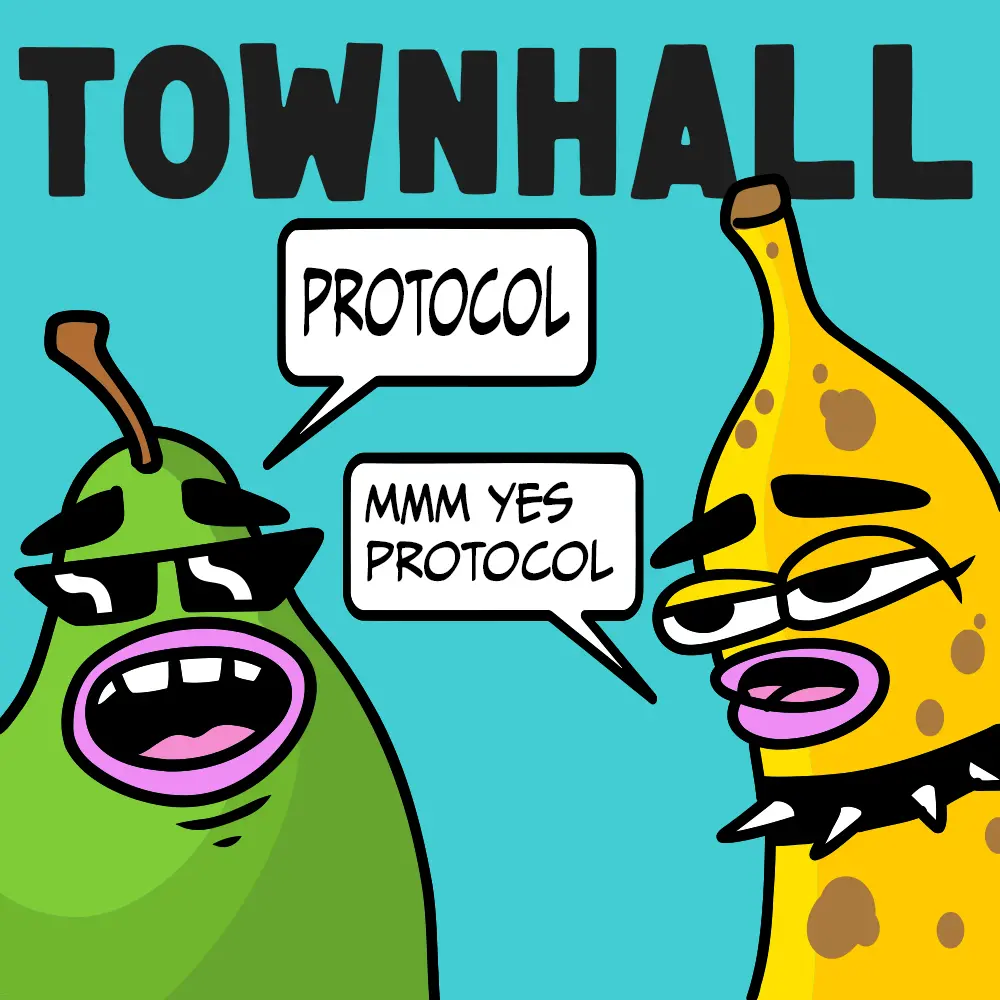 Art by Sage Kellyn
Art by Sage Kellyn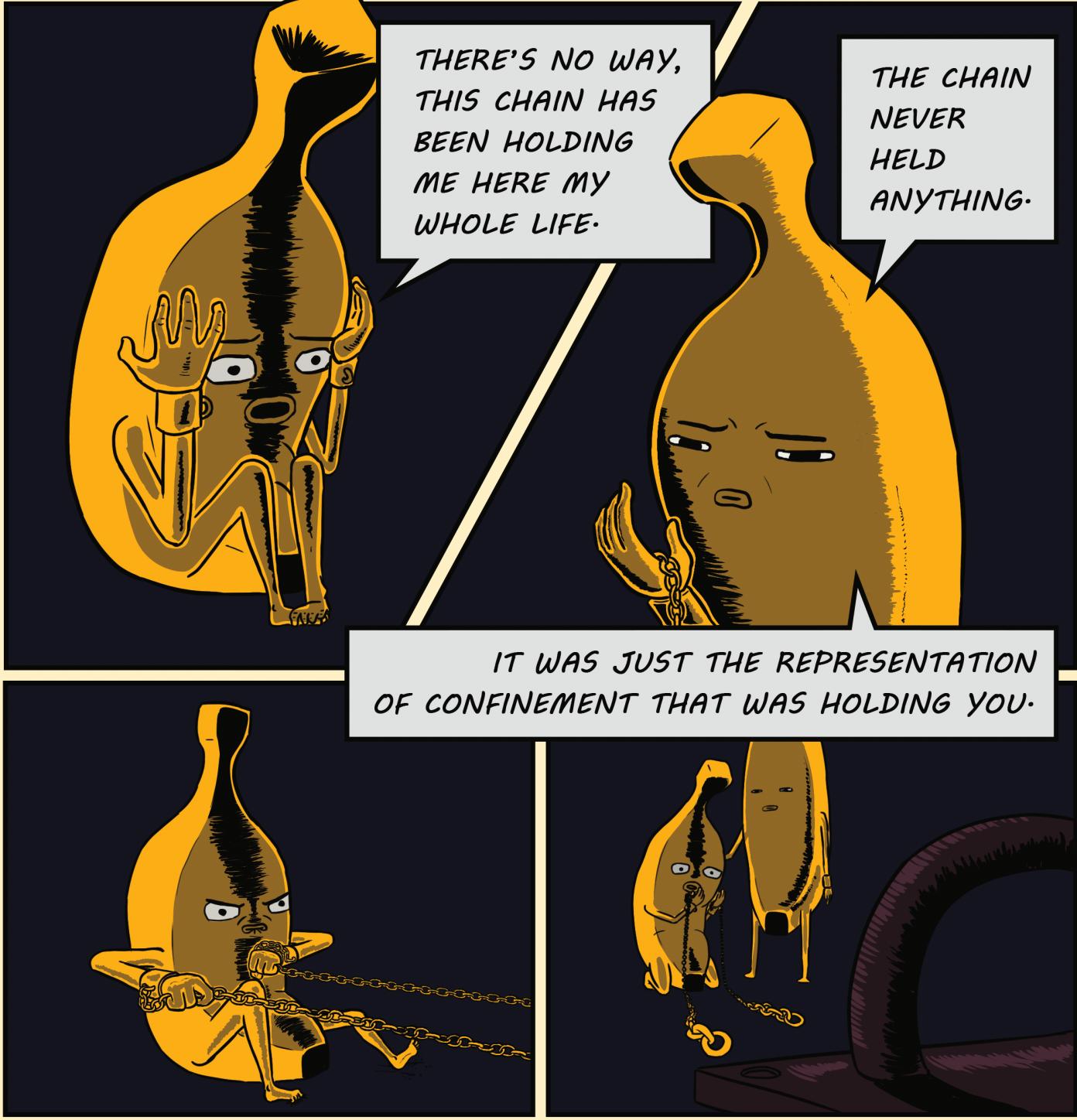
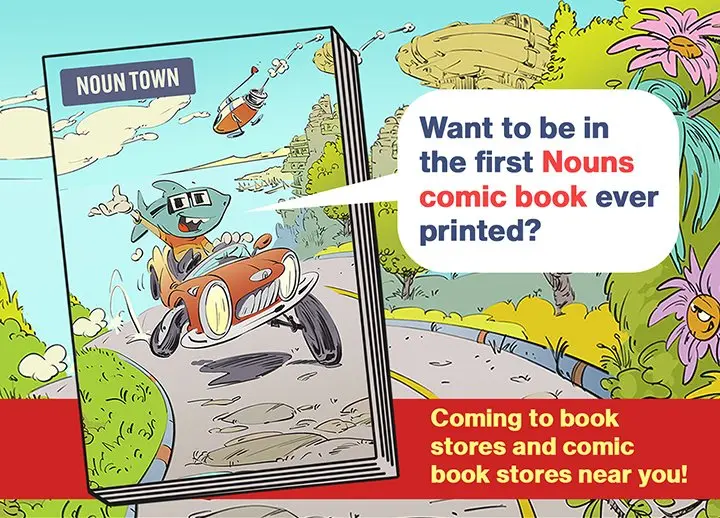
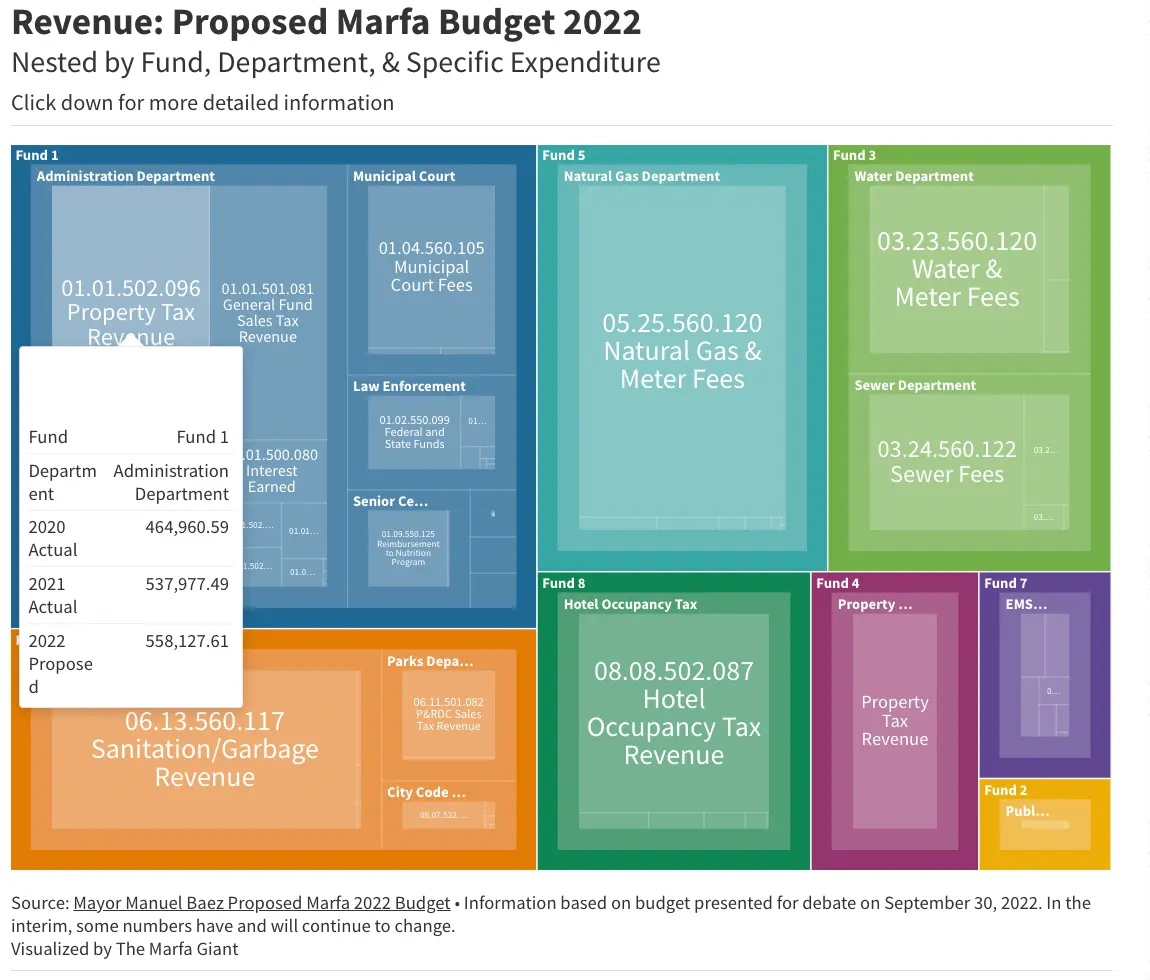
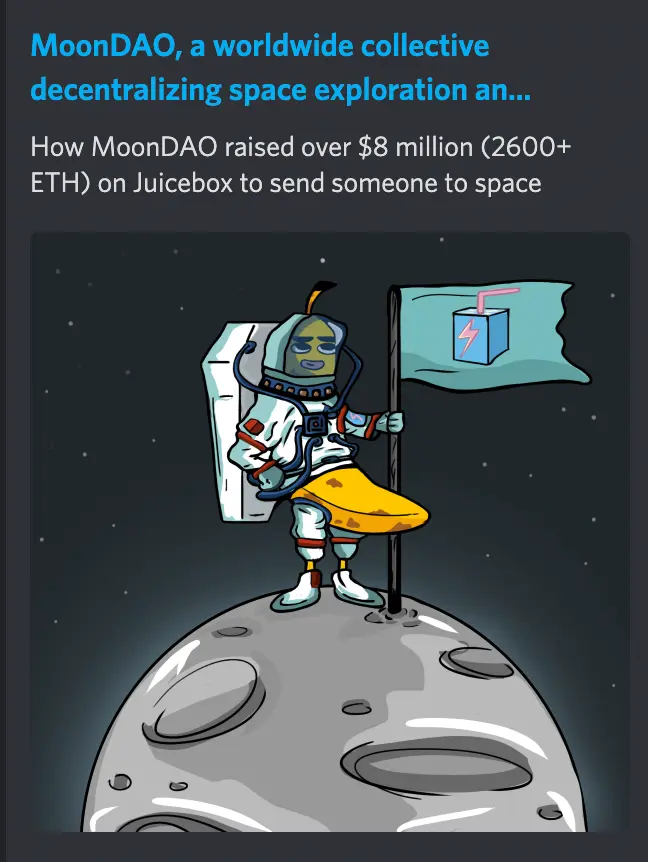
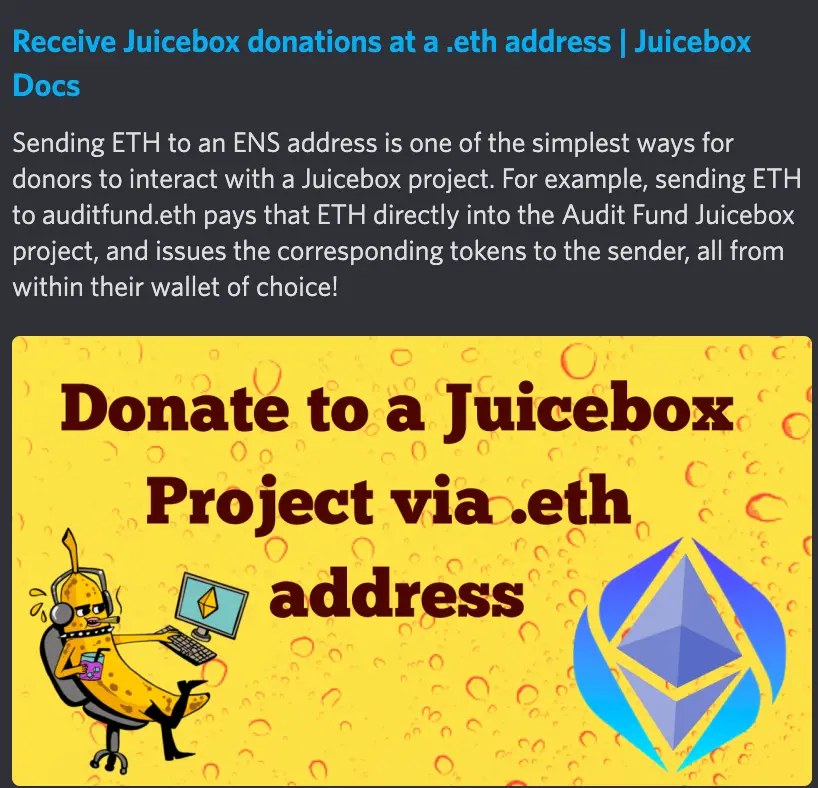

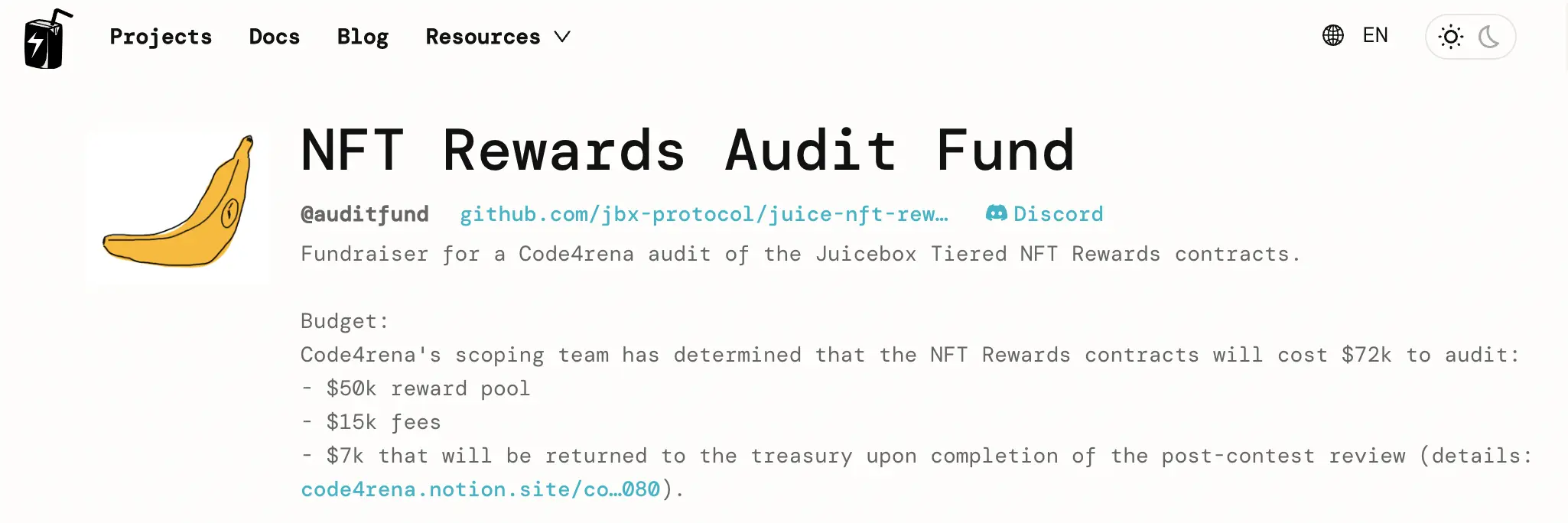
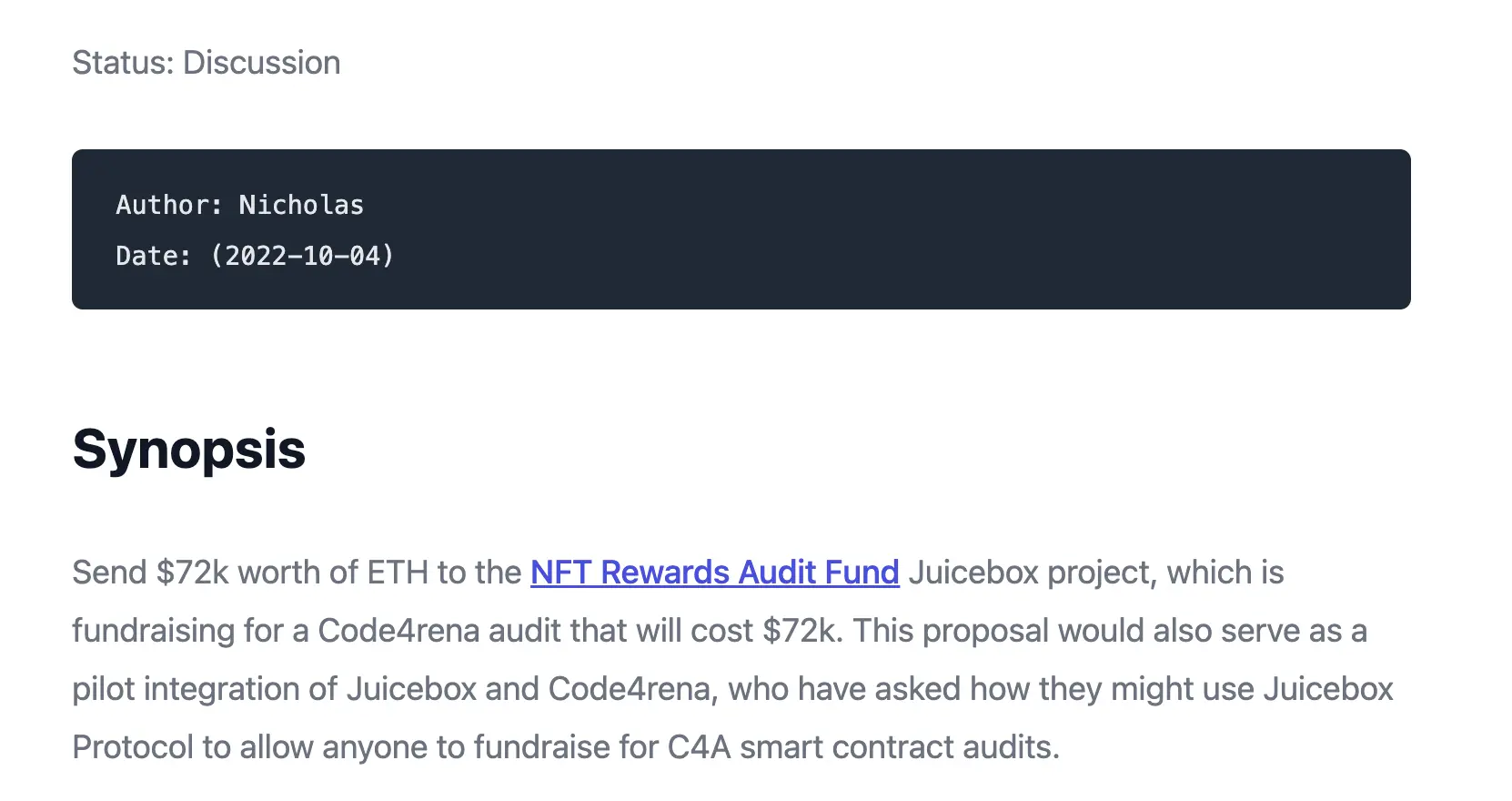
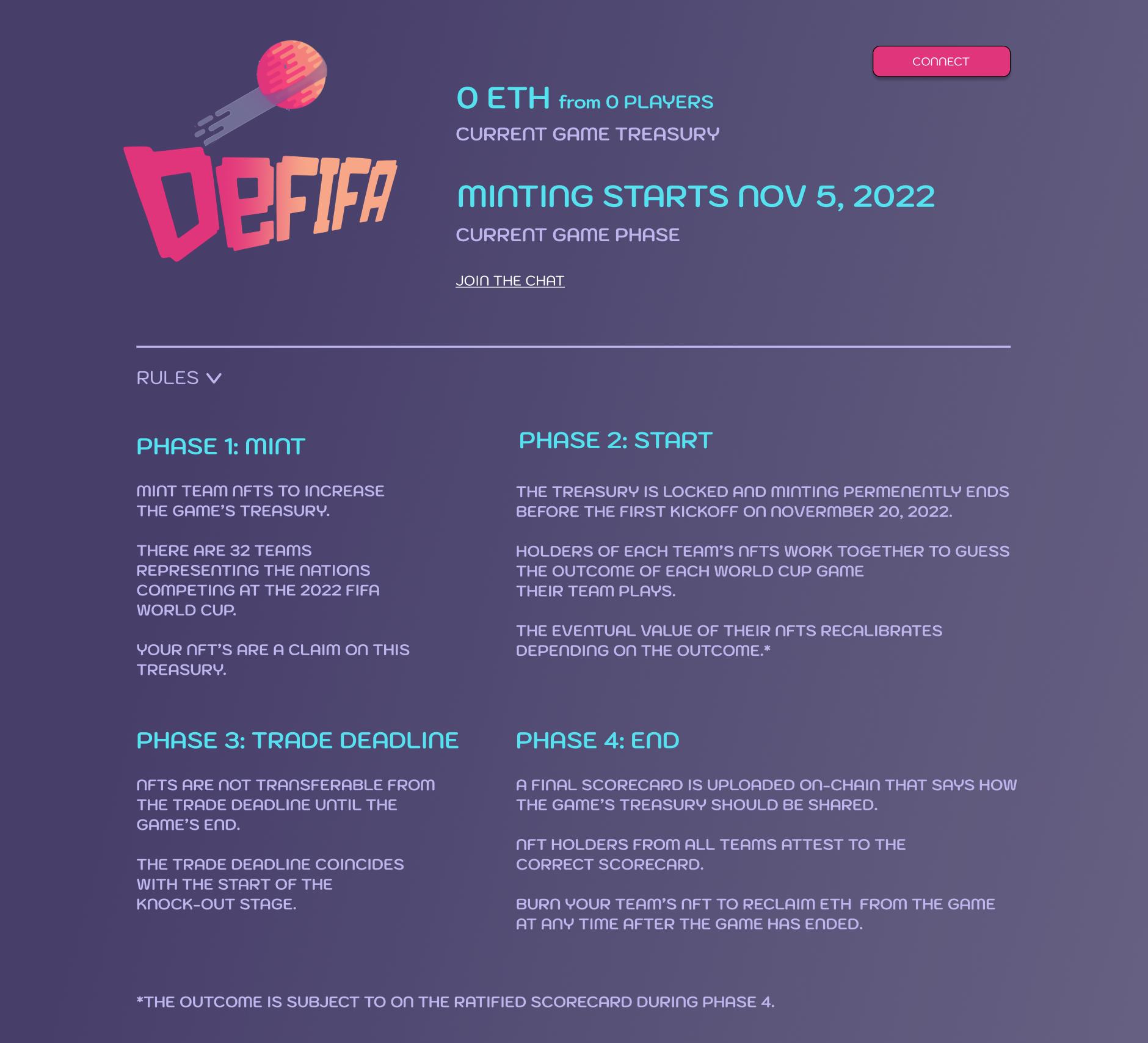
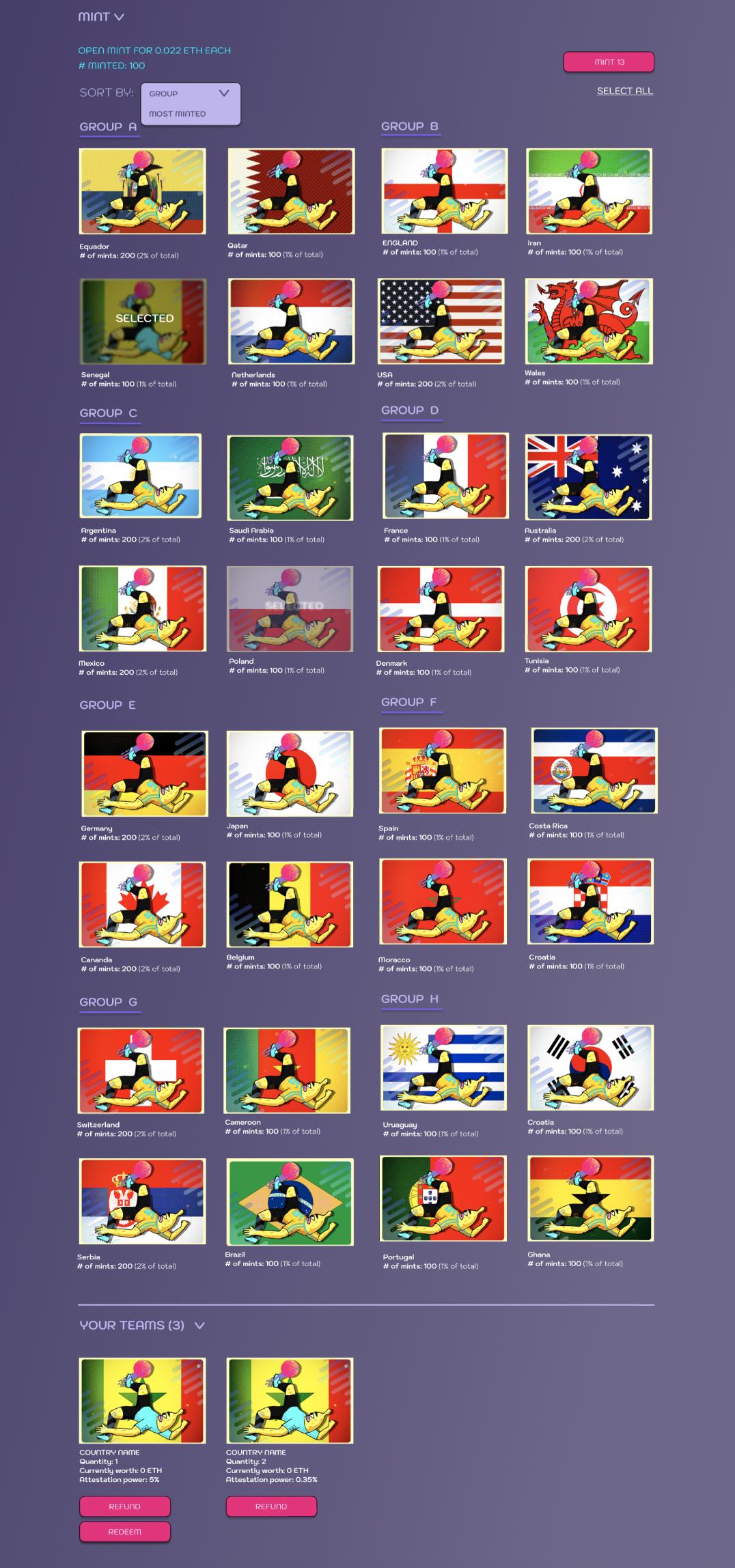
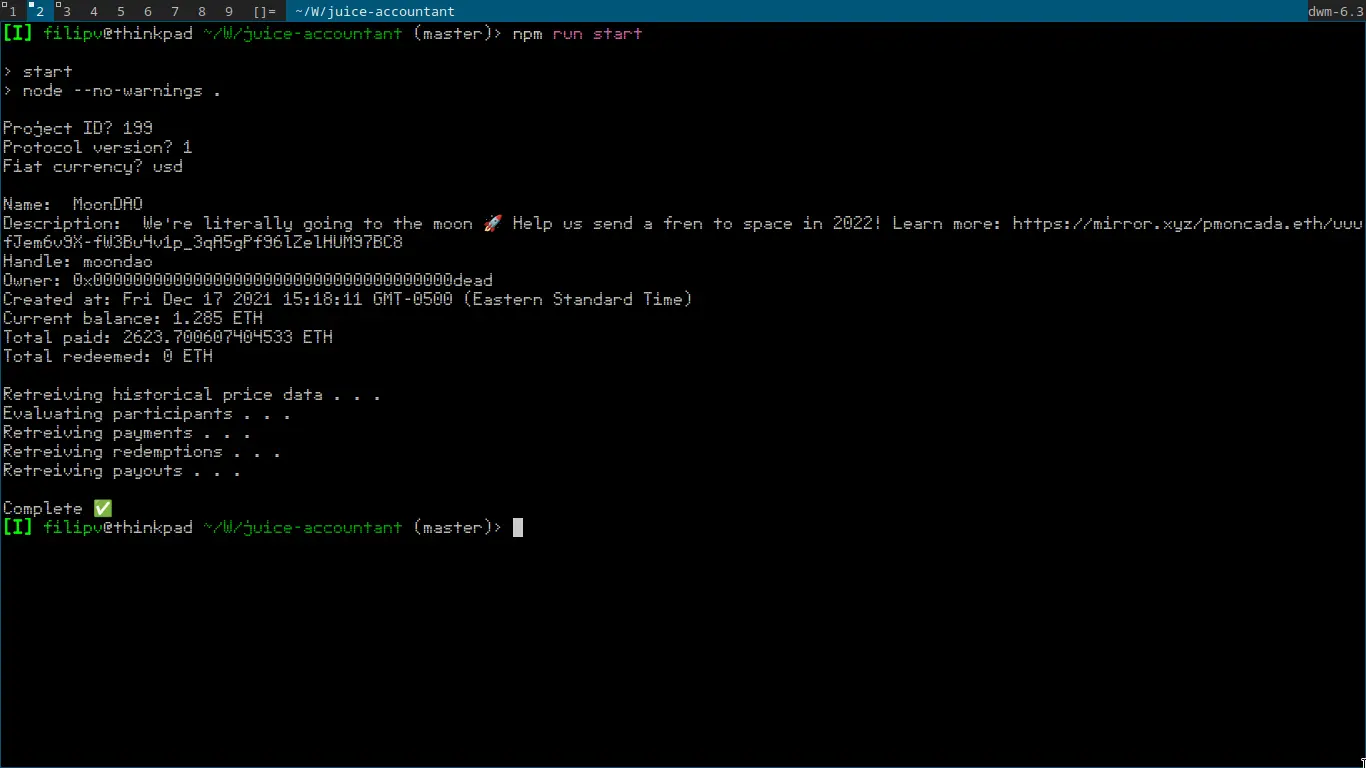

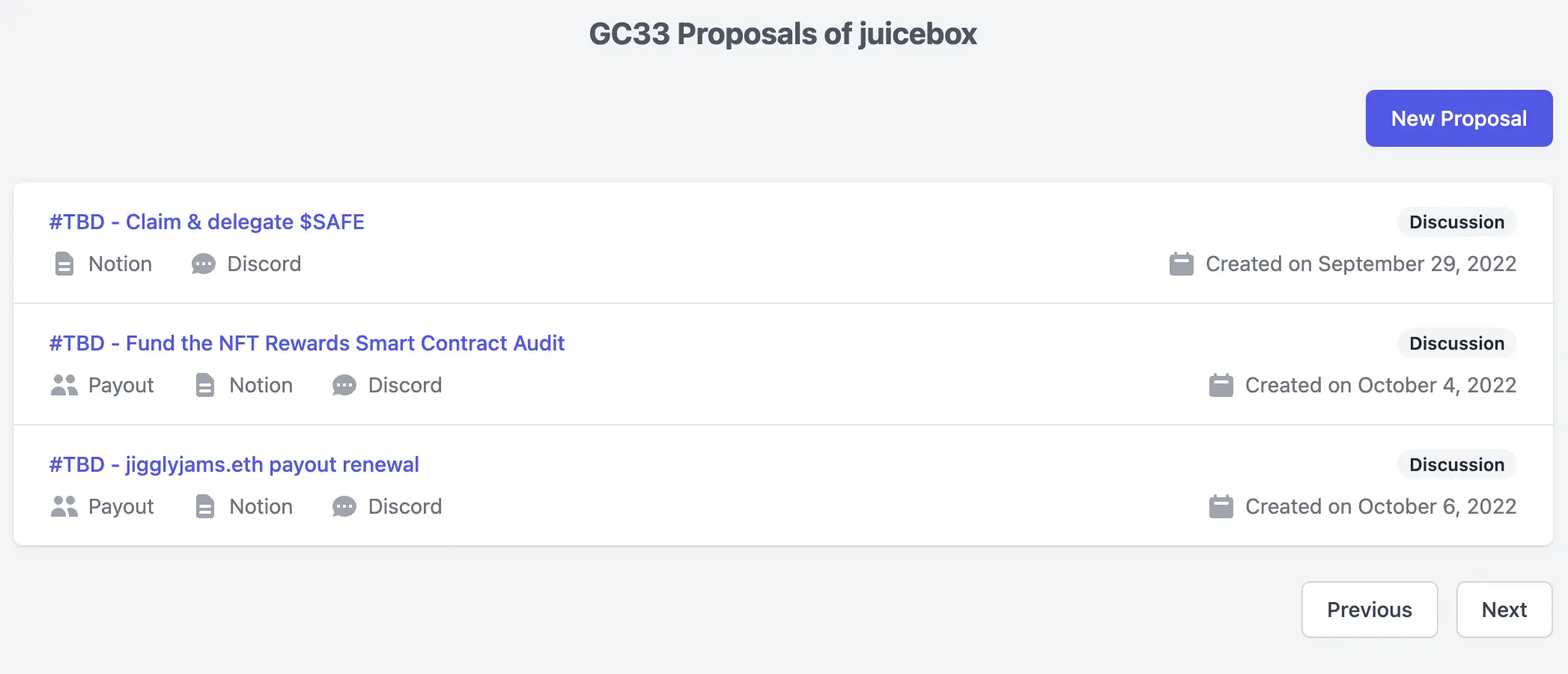 (Here it shows # TBD, becuase we don't give the proposals any proposal ID until it passes the temperature check. )
(Here it shows # TBD, becuase we don't give the proposals any proposal ID until it passes the temperature check. )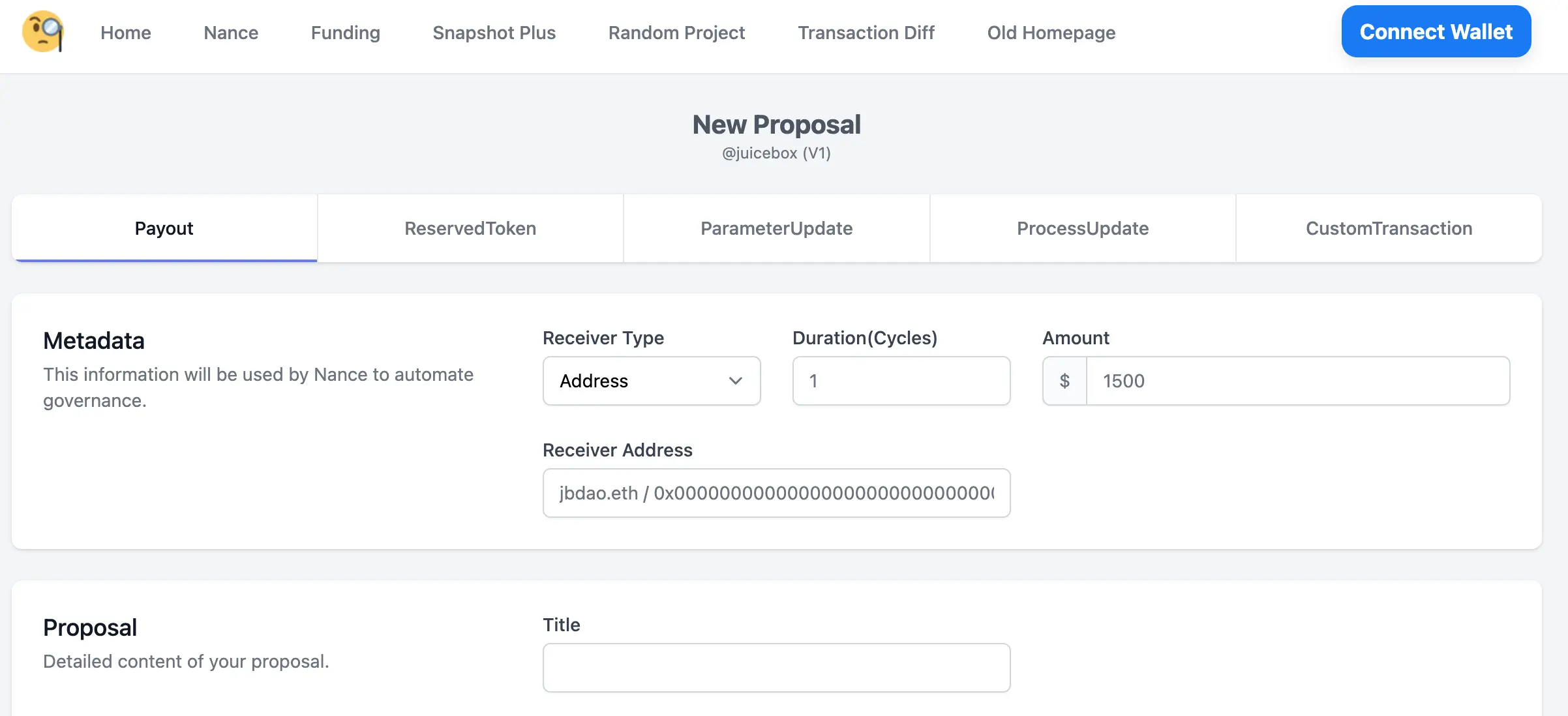 This template allows you to select a payout that goes to an address or a project, and specify the amount and number of cycles. And also it will resolve ENS name in the
This template allows you to select a payout that goes to an address or a project, and specify the amount and number of cycles. And also it will resolve ENS name in the 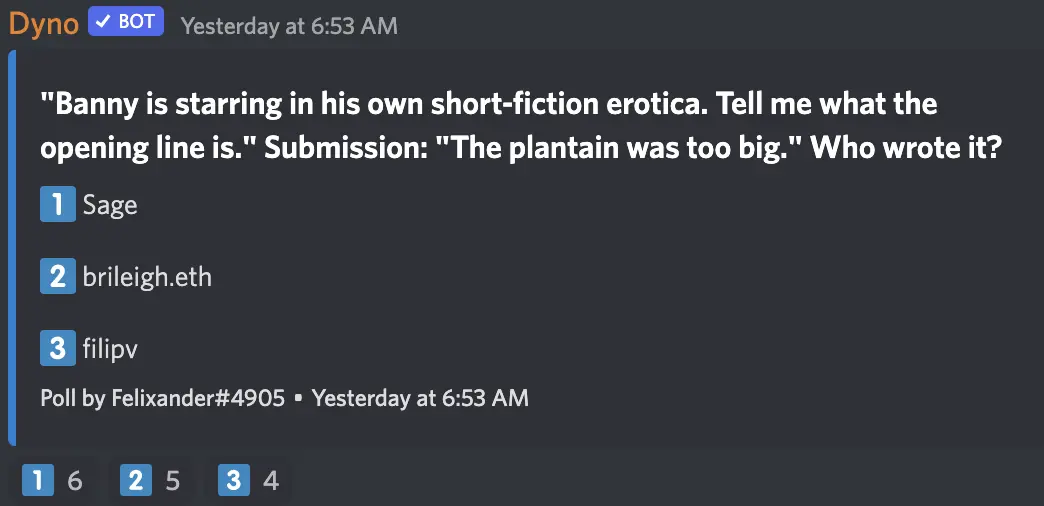
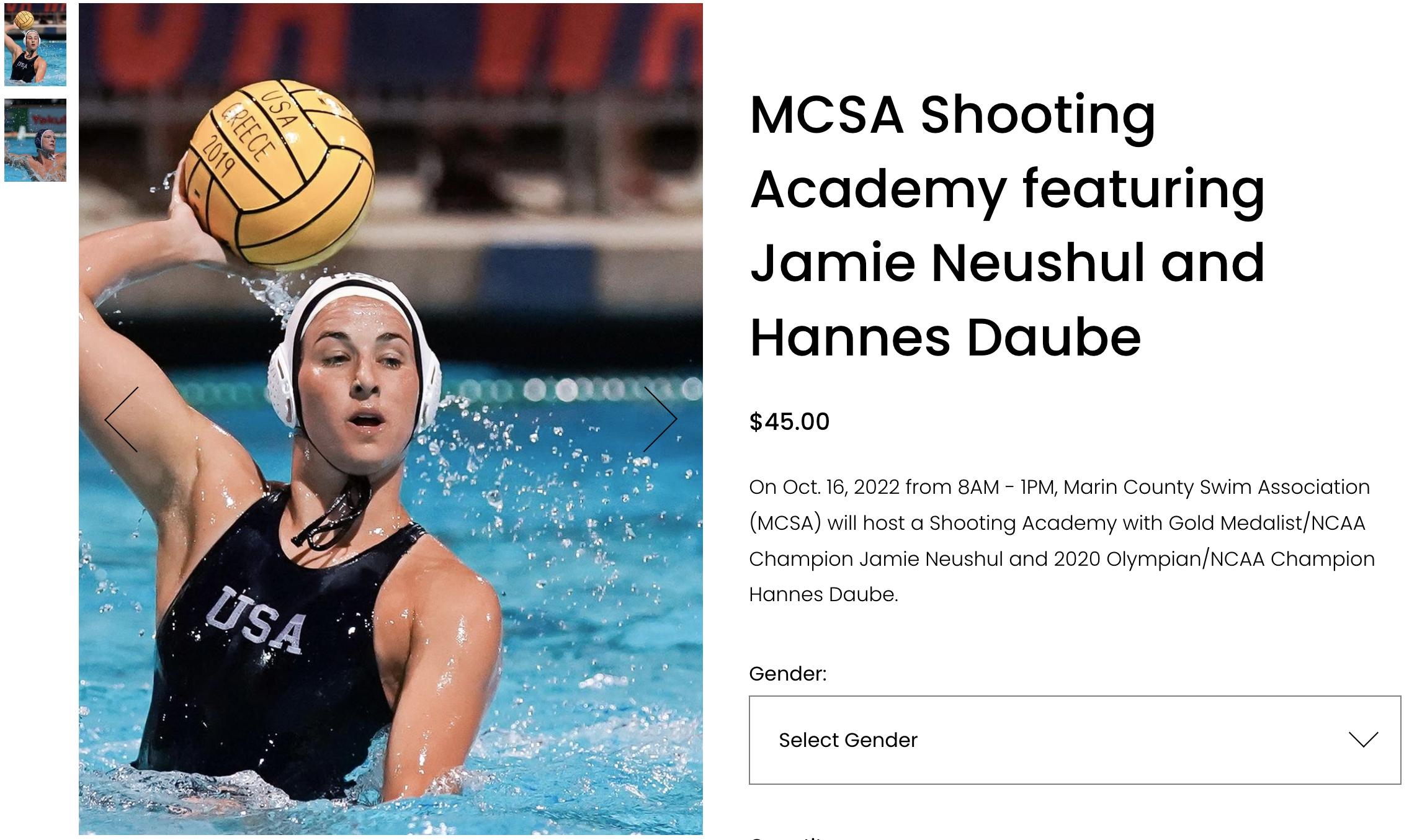
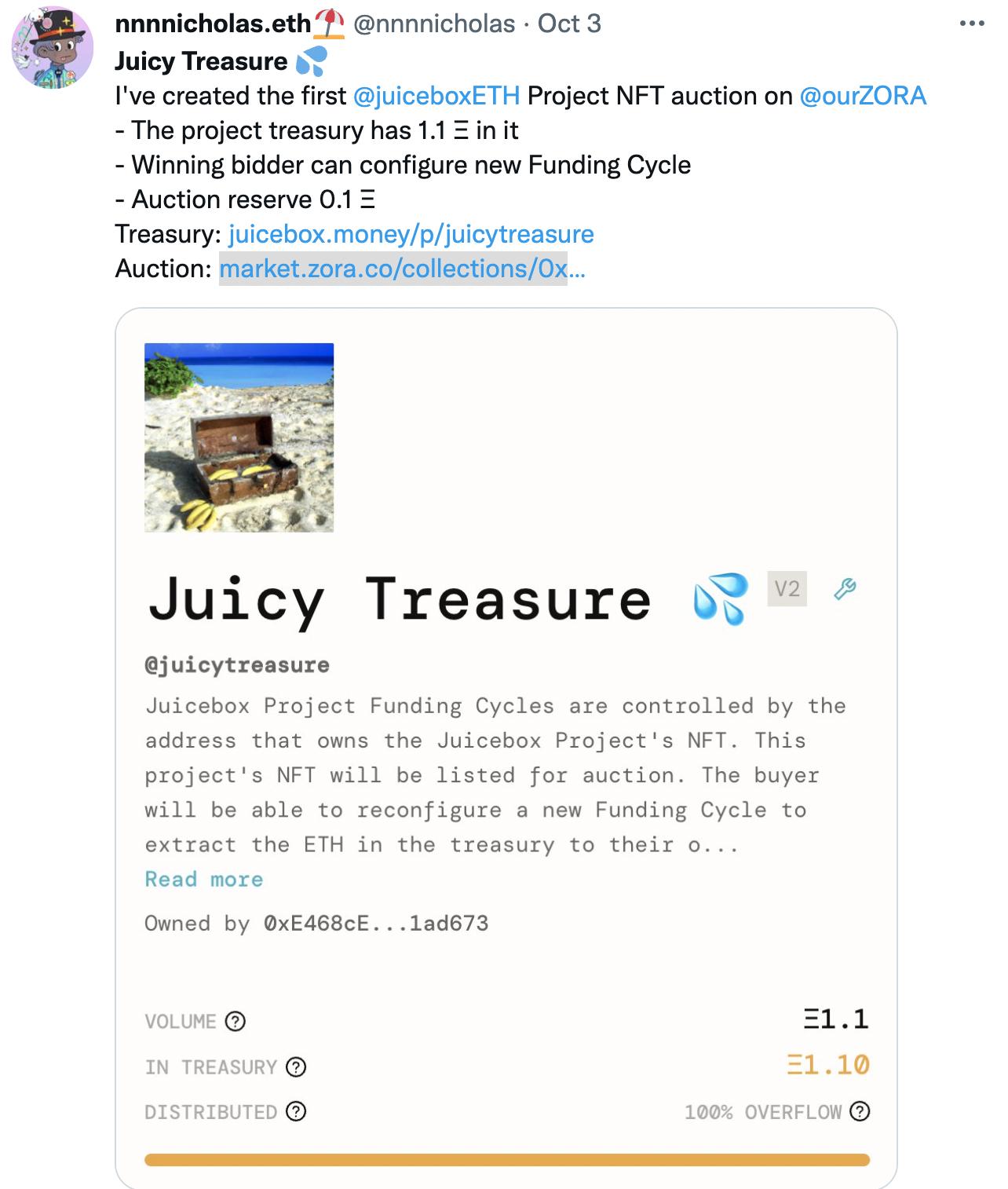
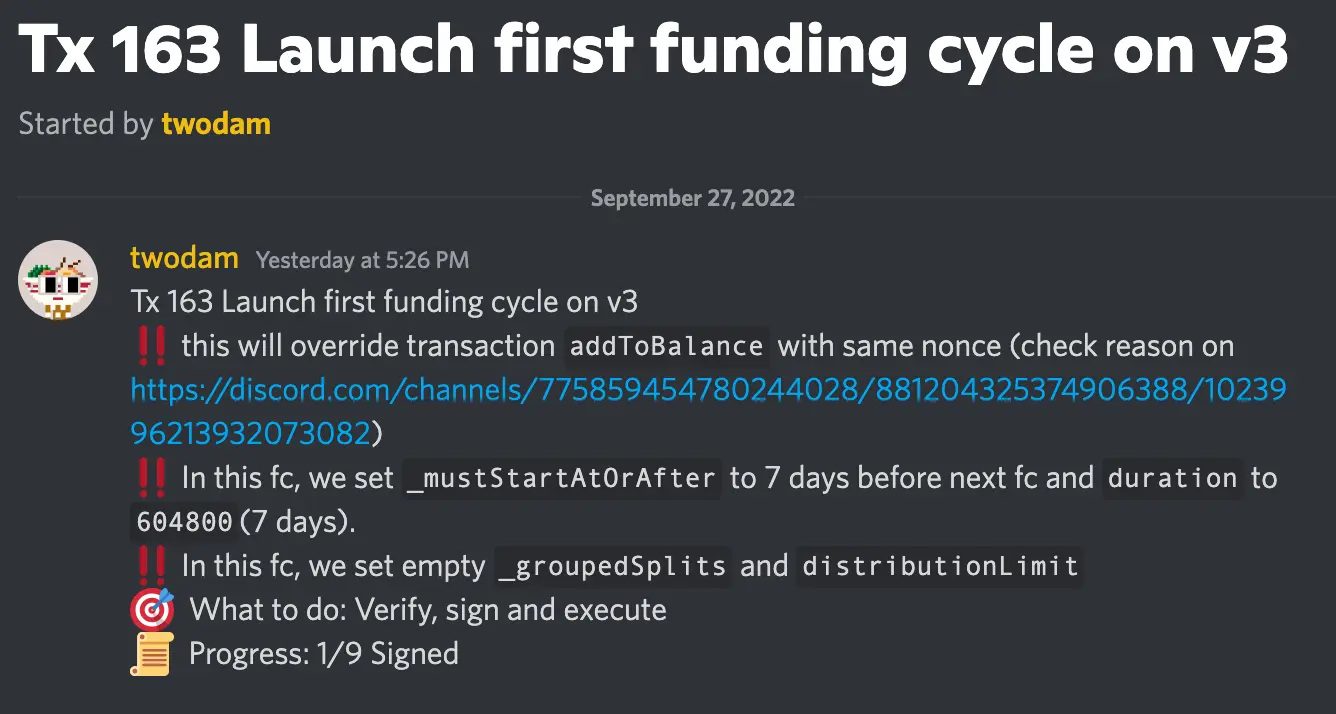
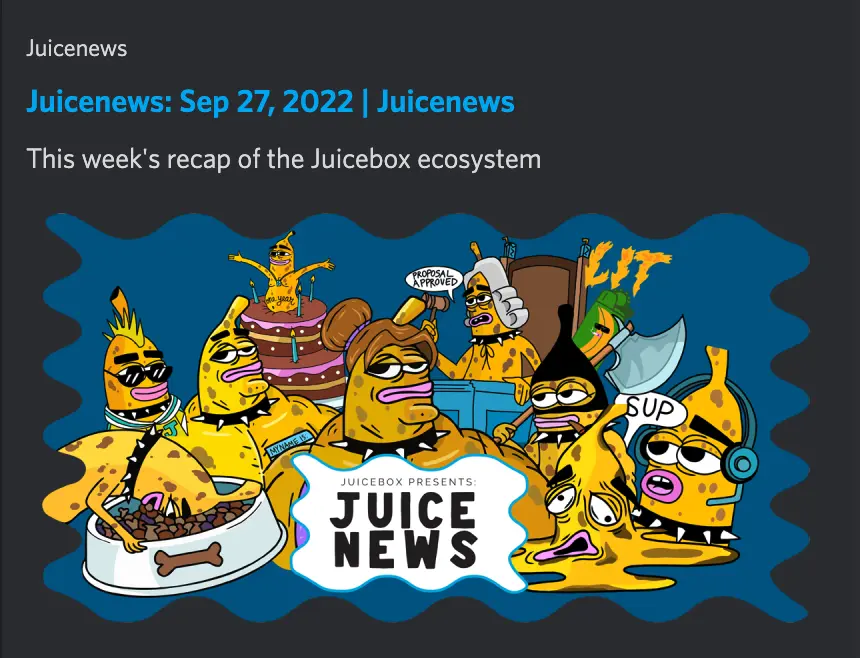
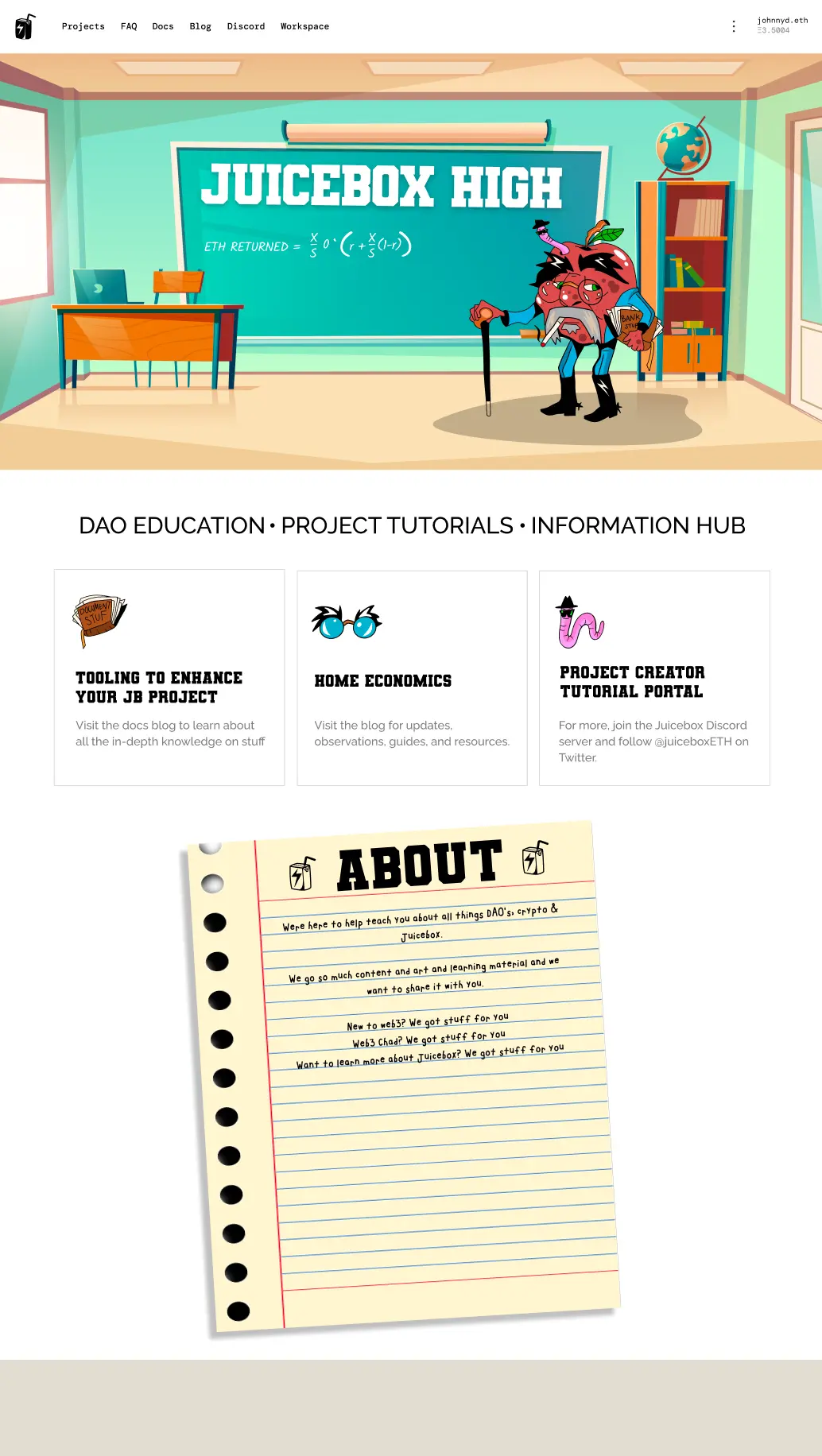
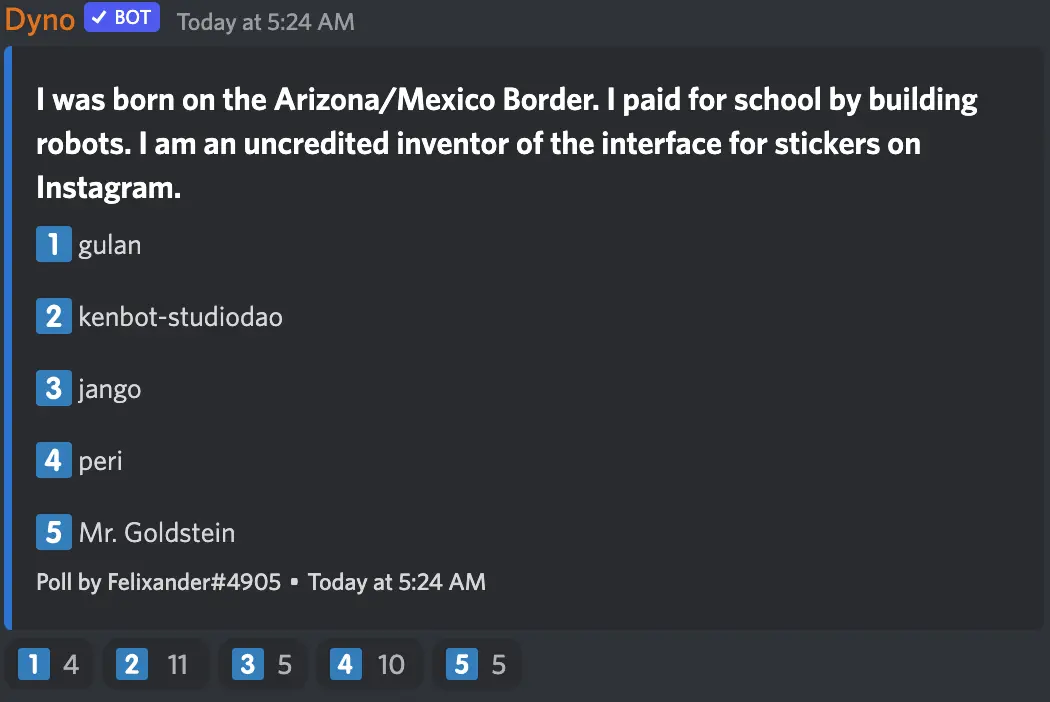
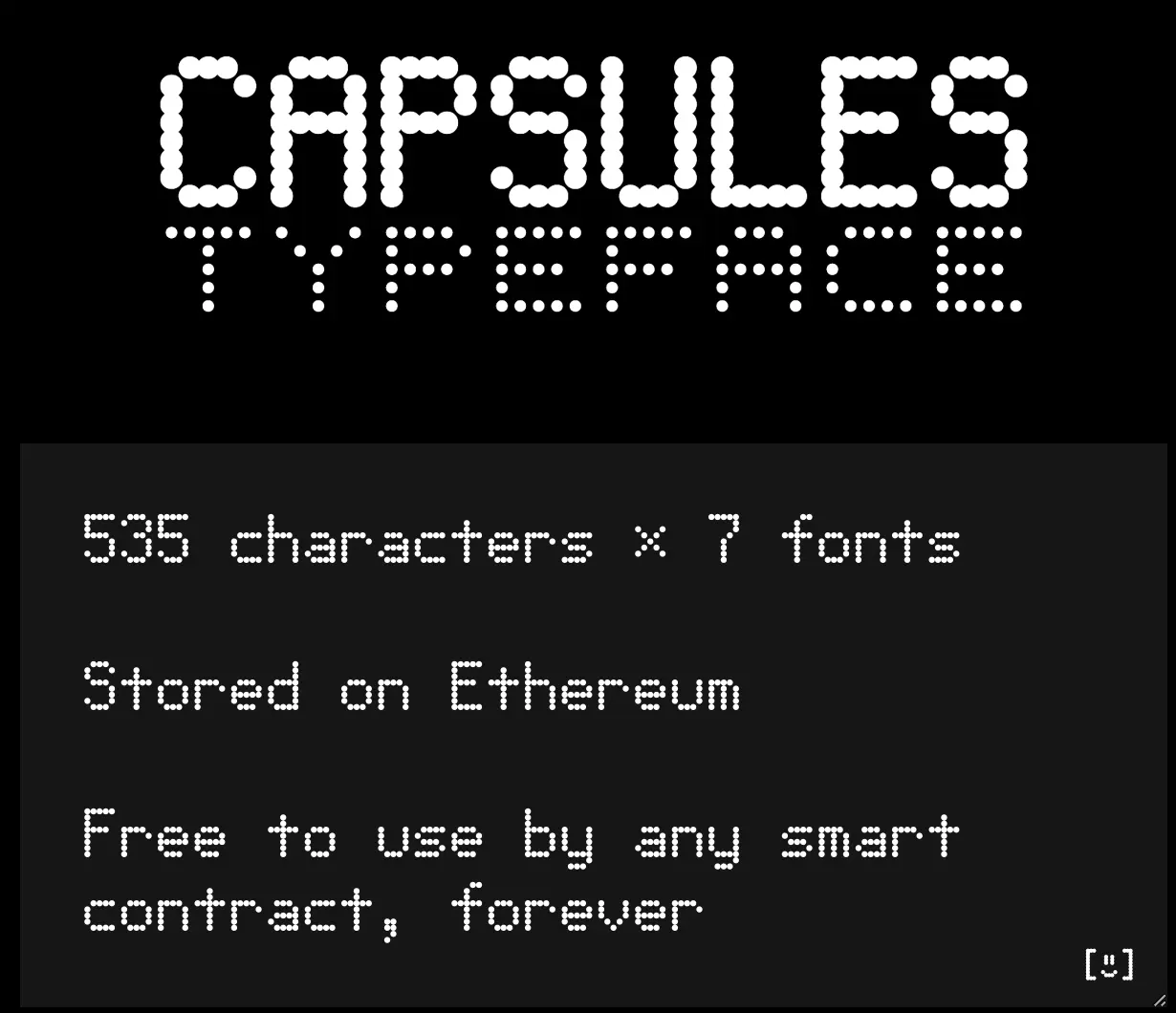
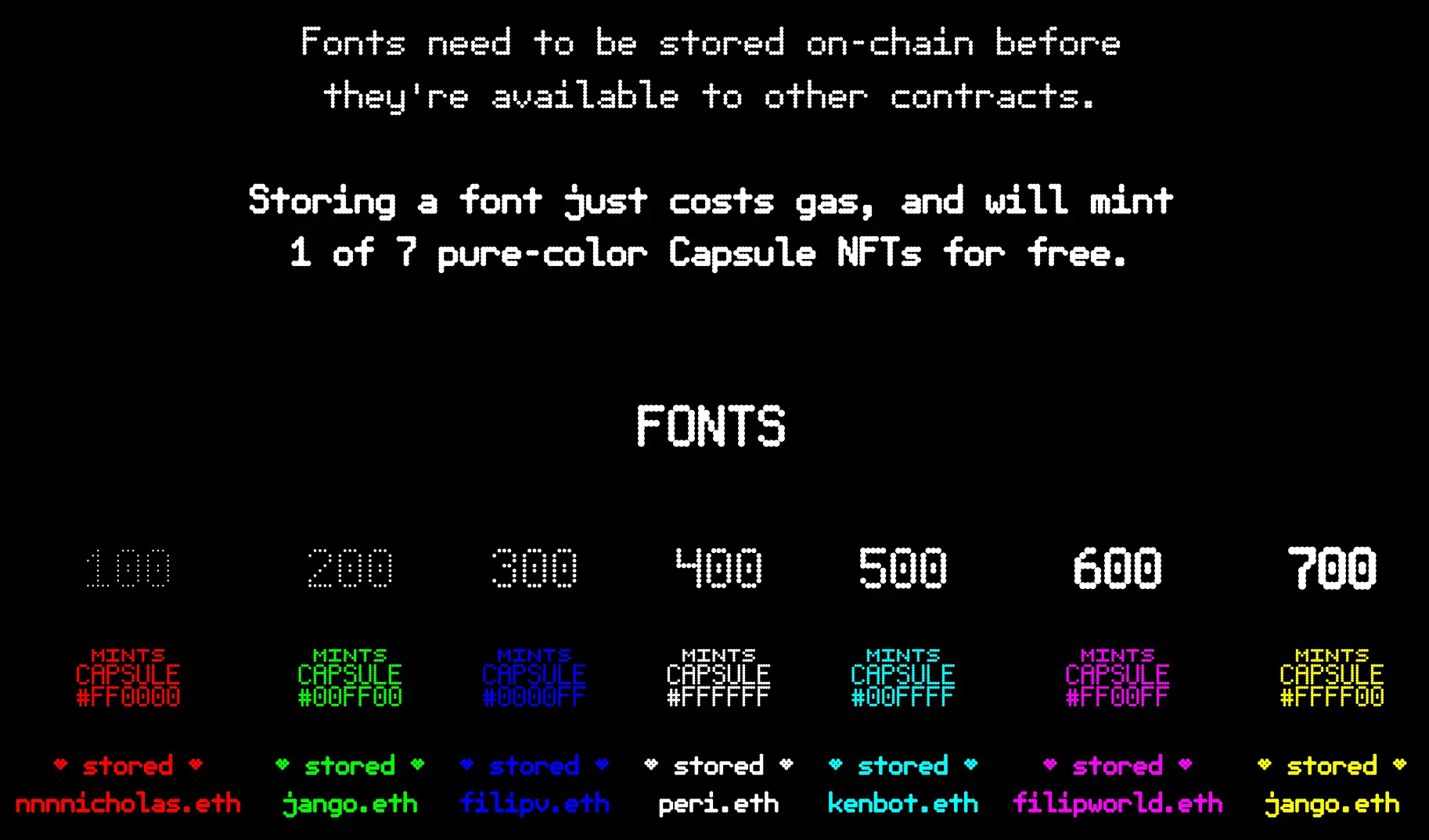
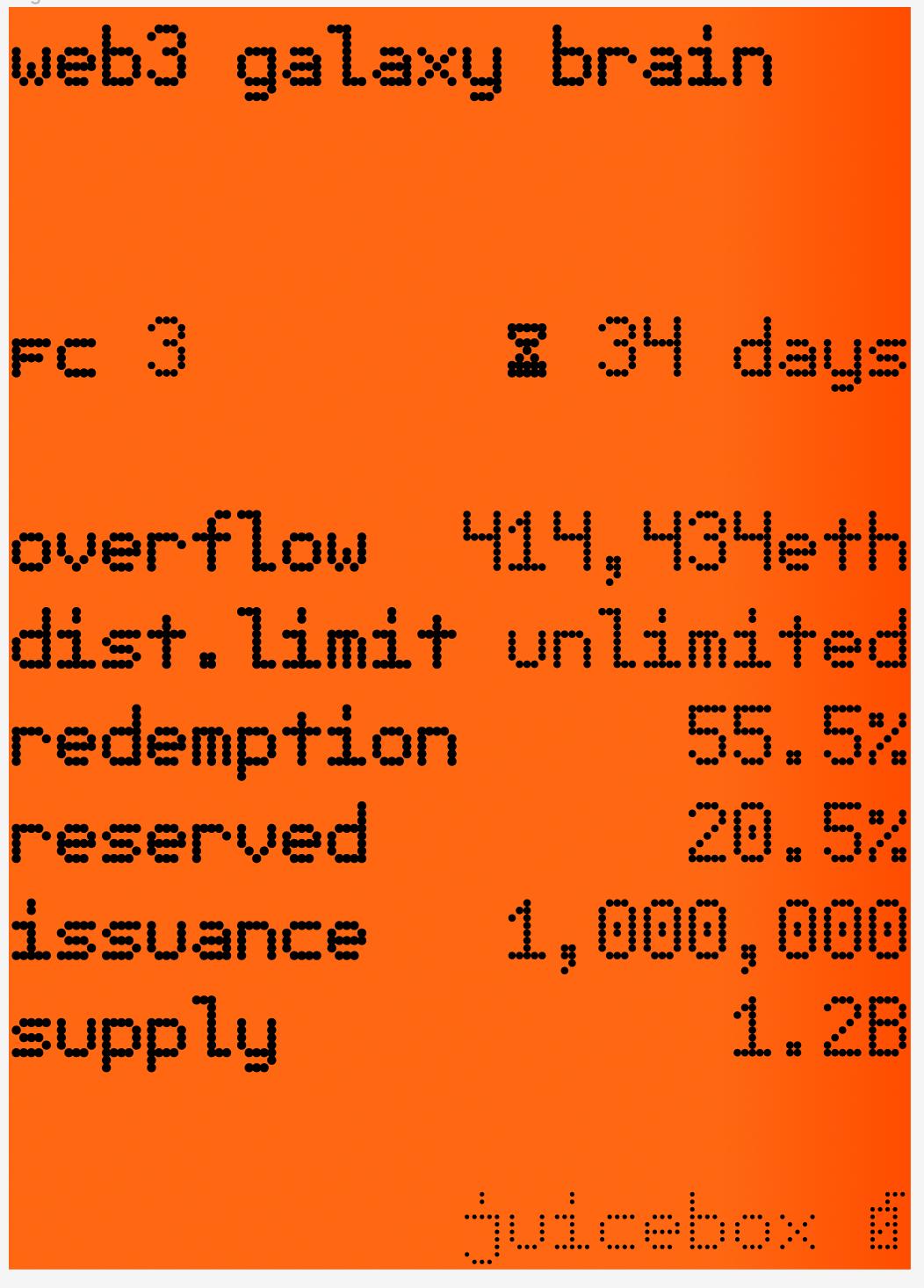
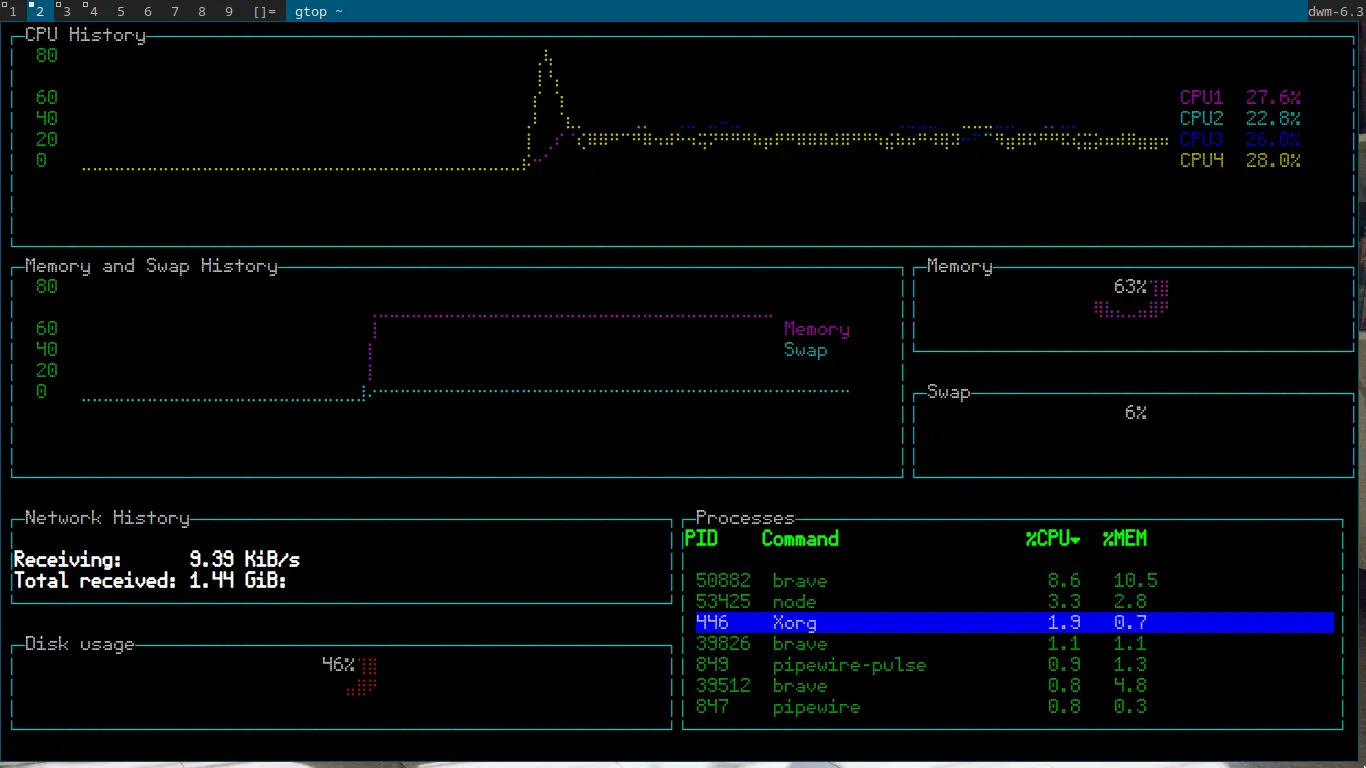
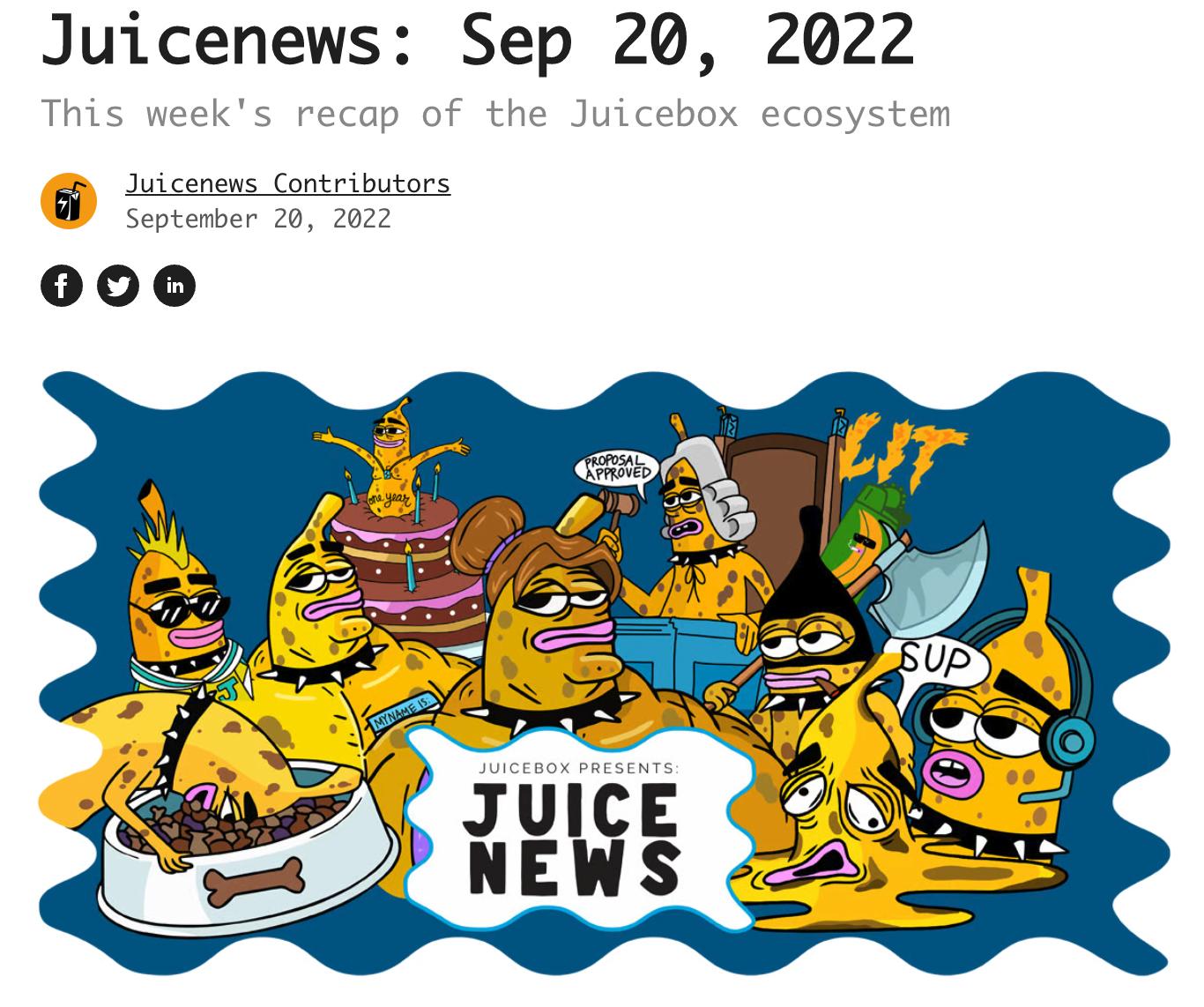
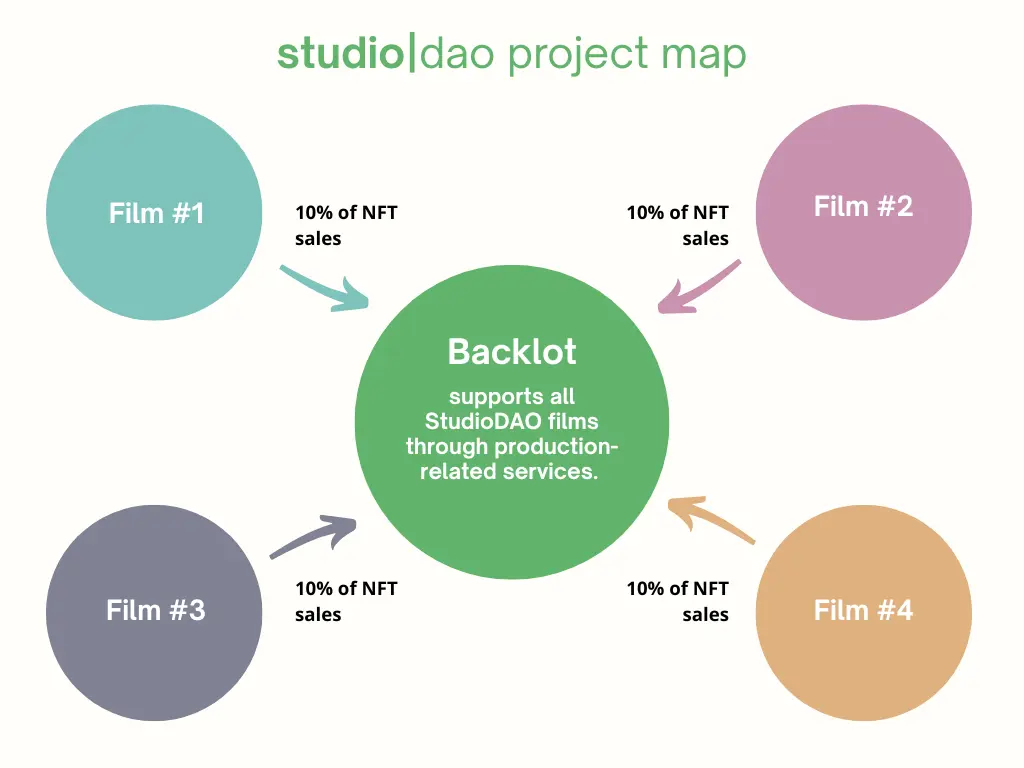
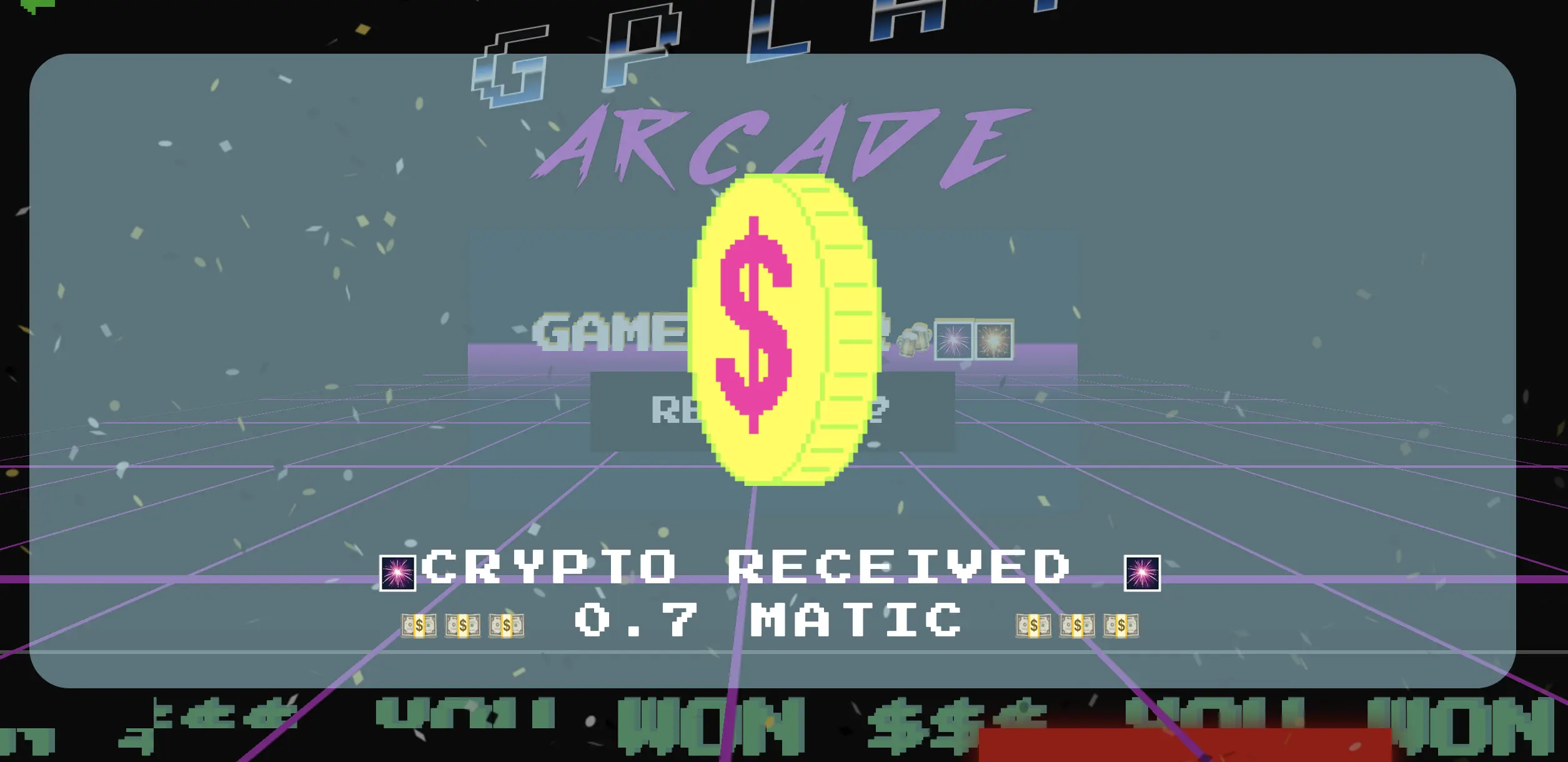
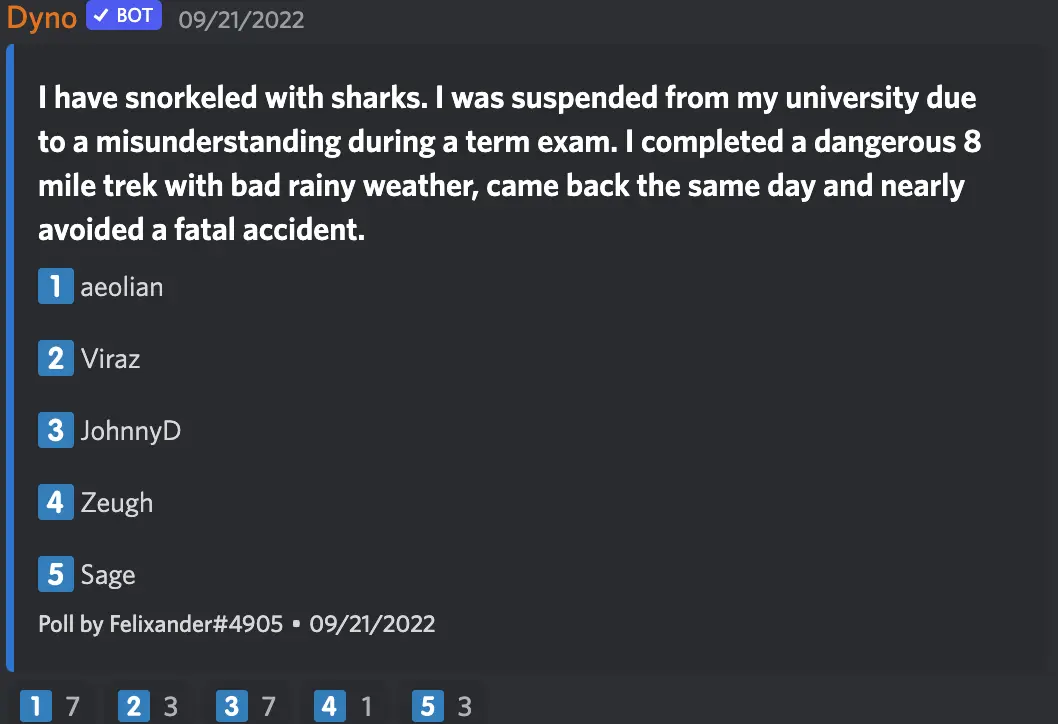
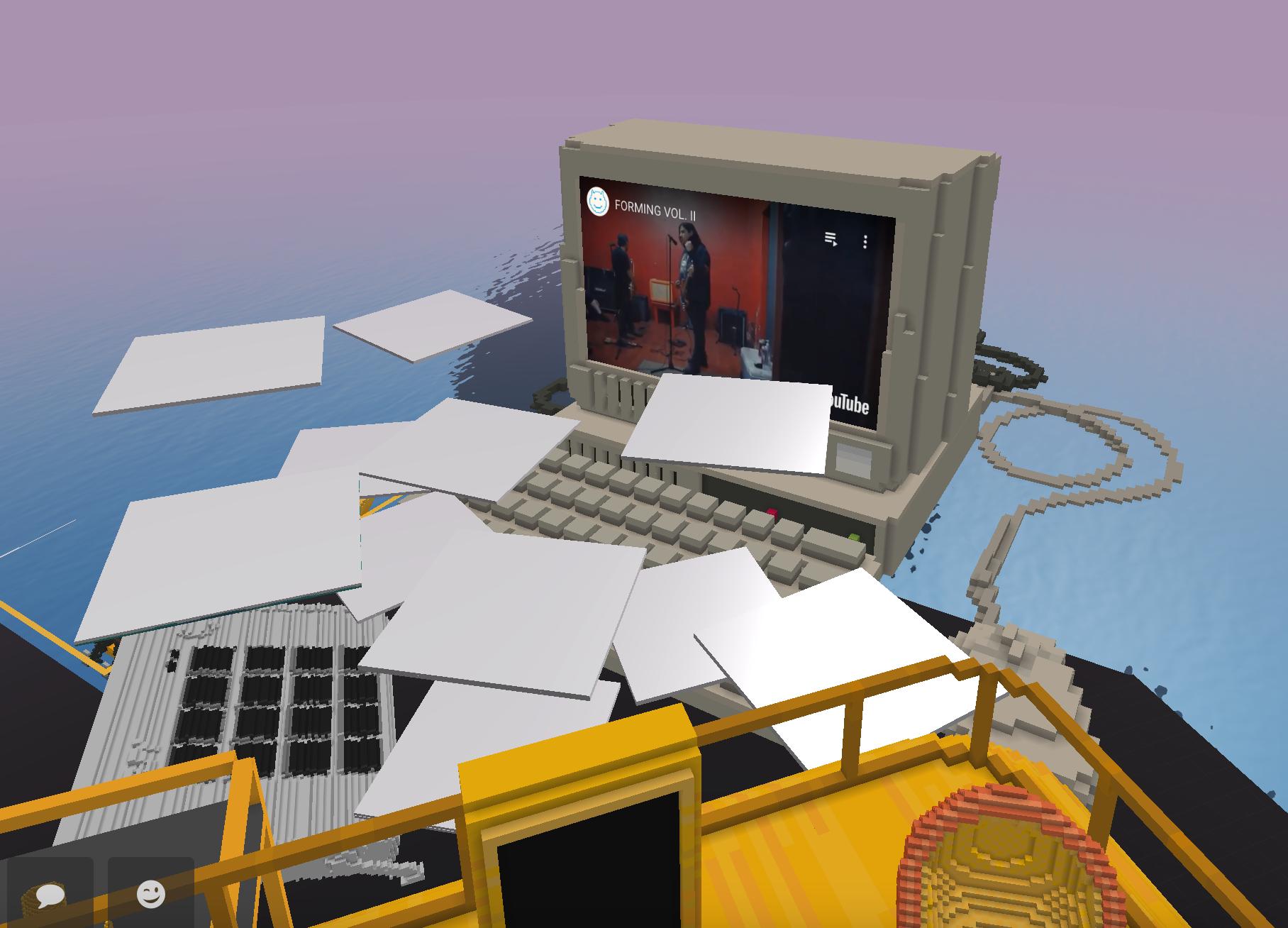
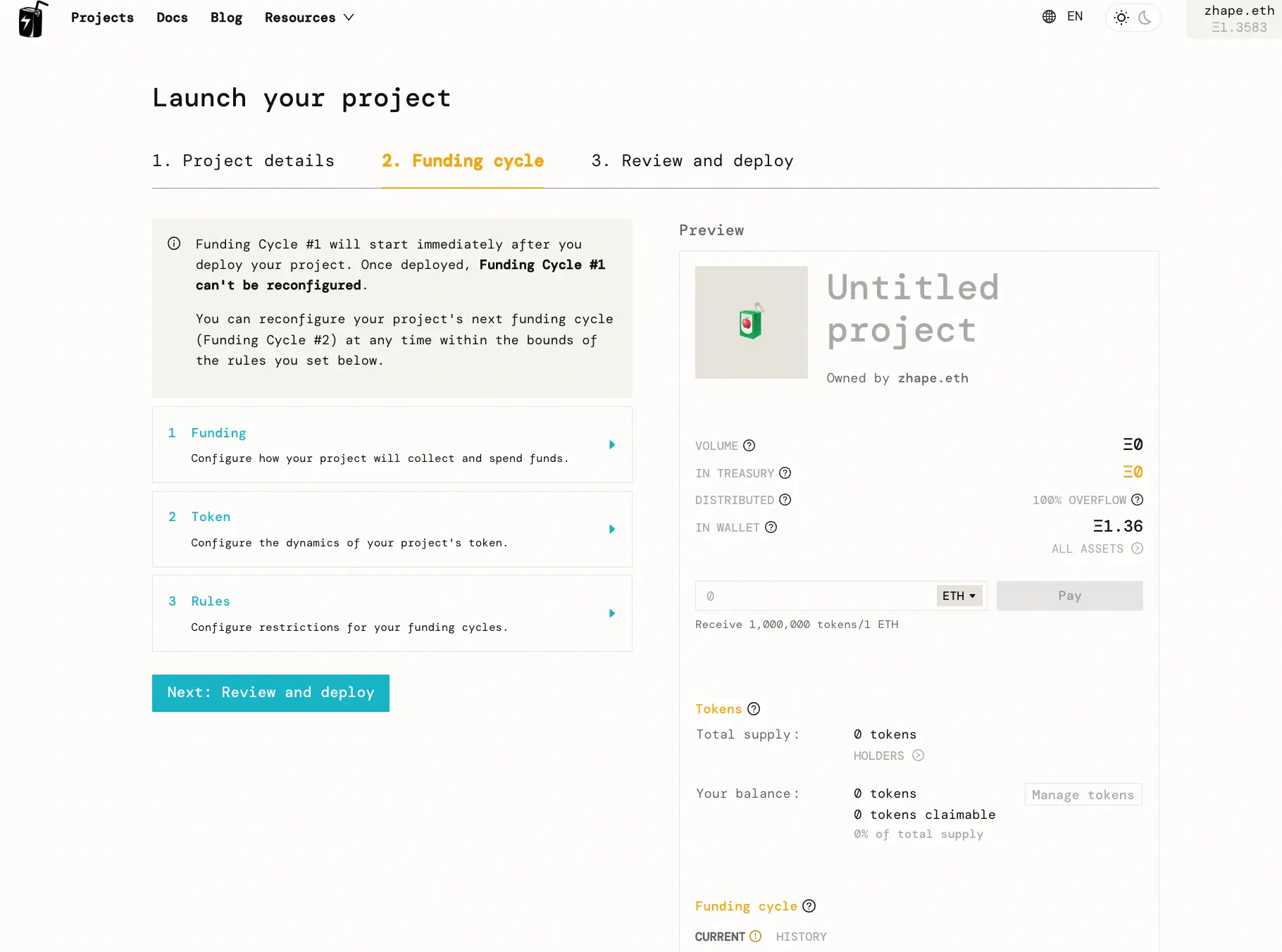
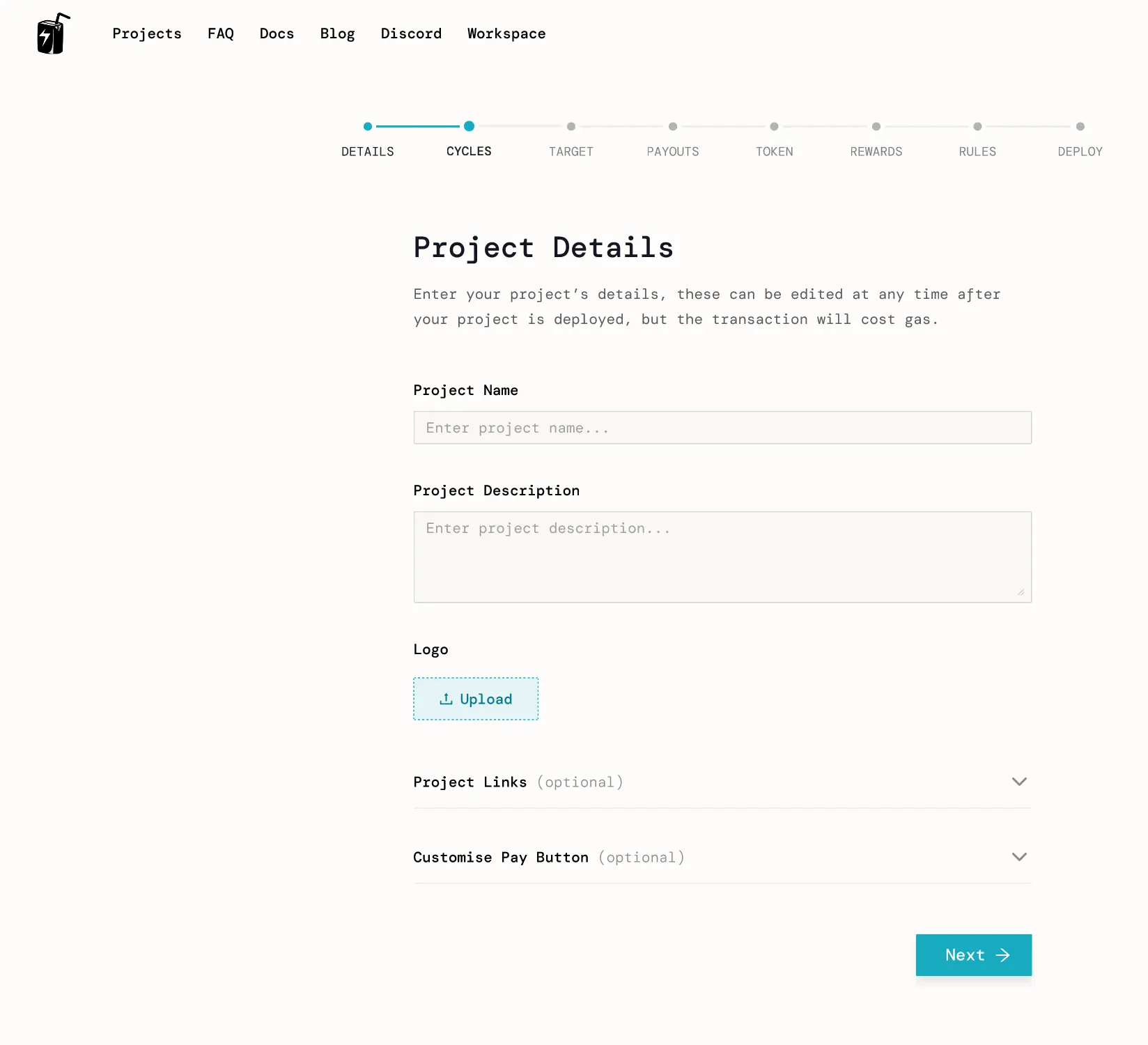
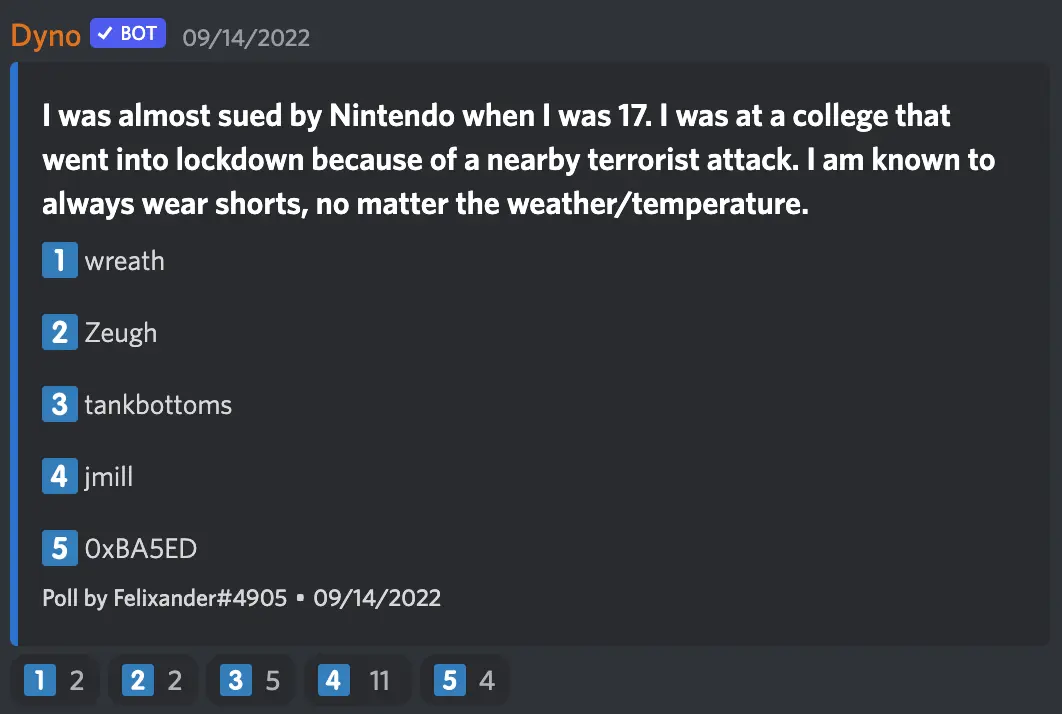
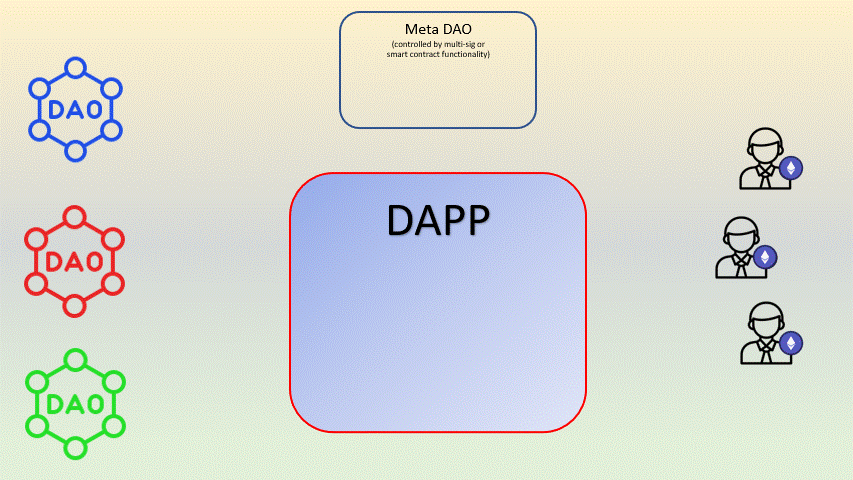
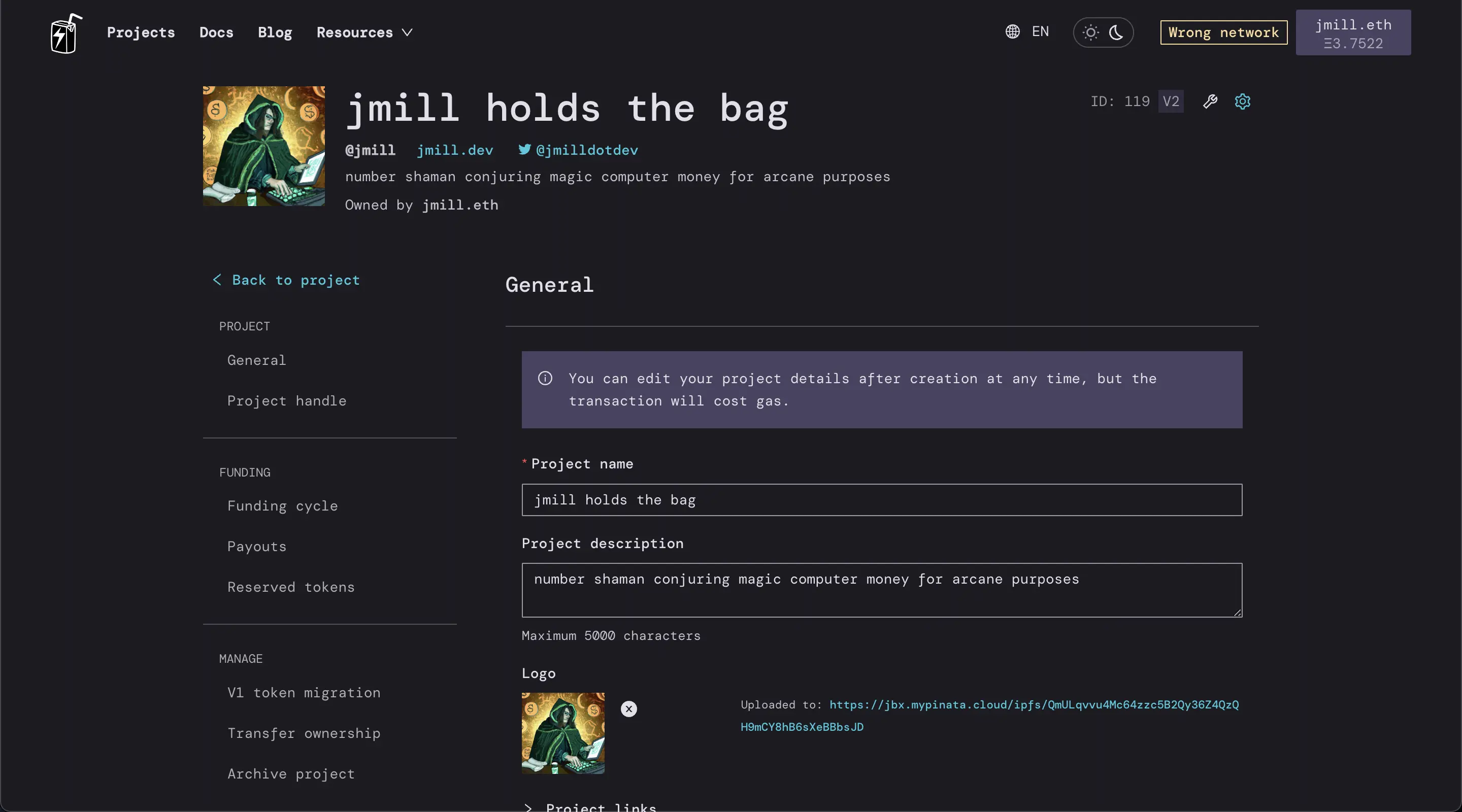
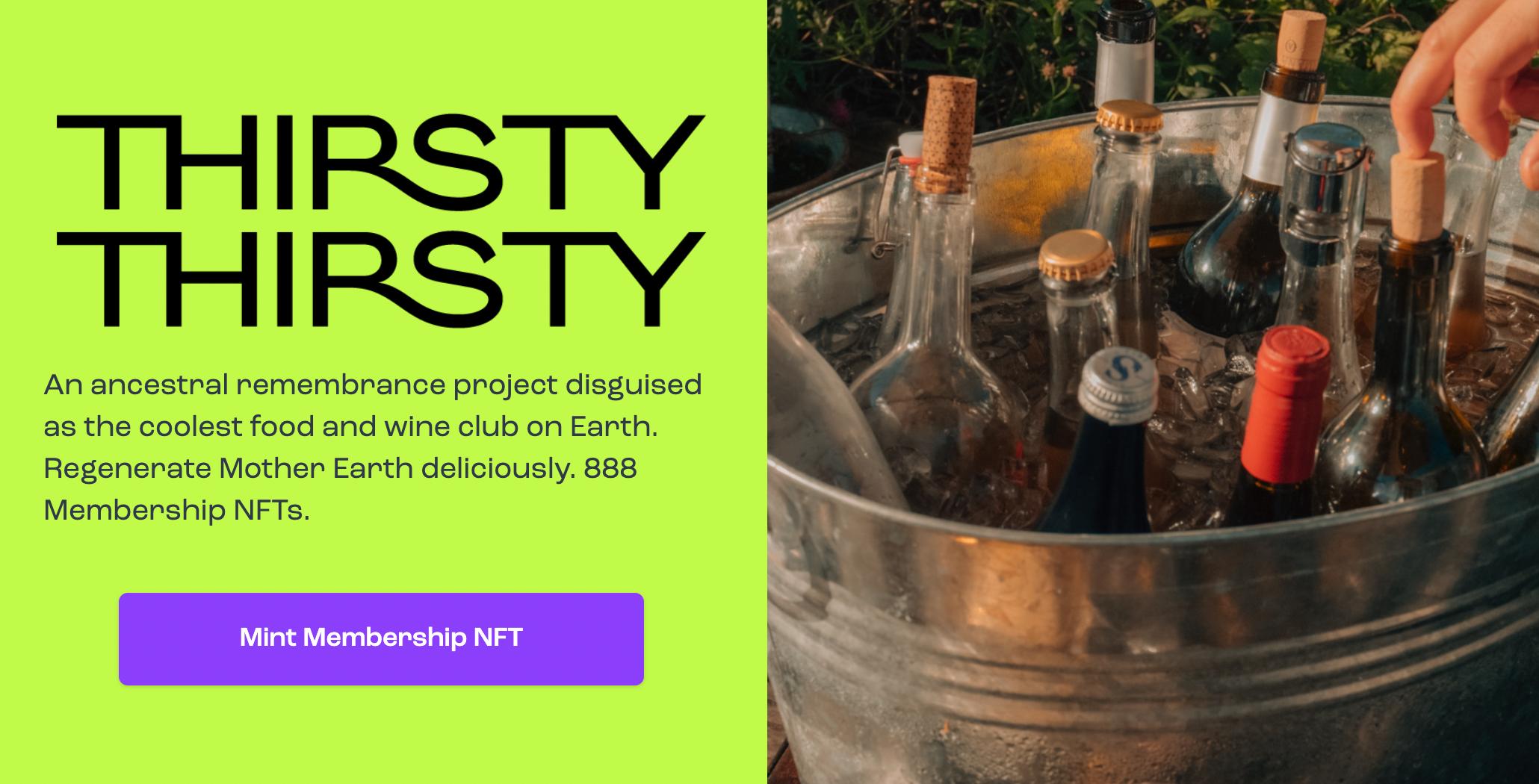
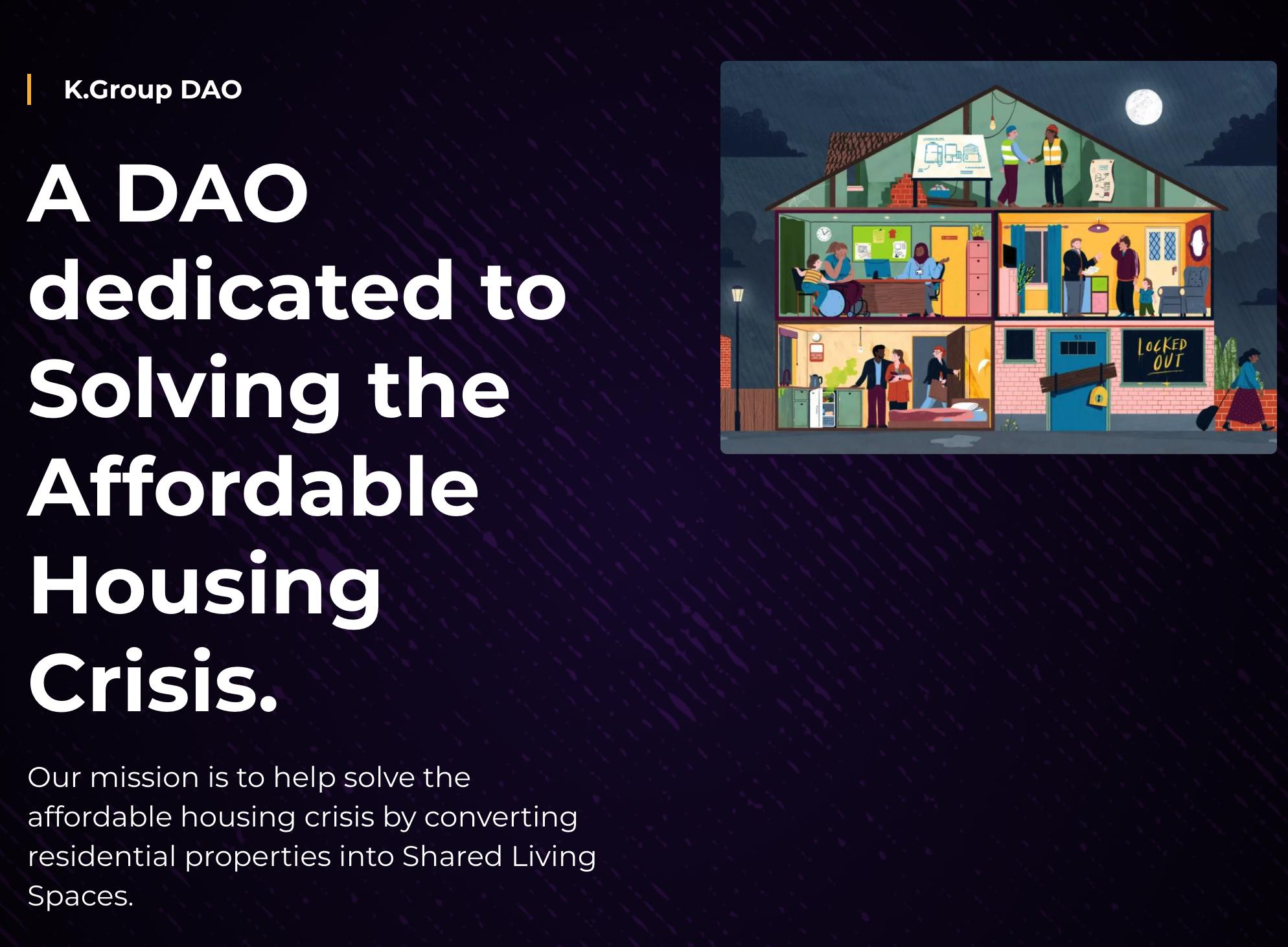
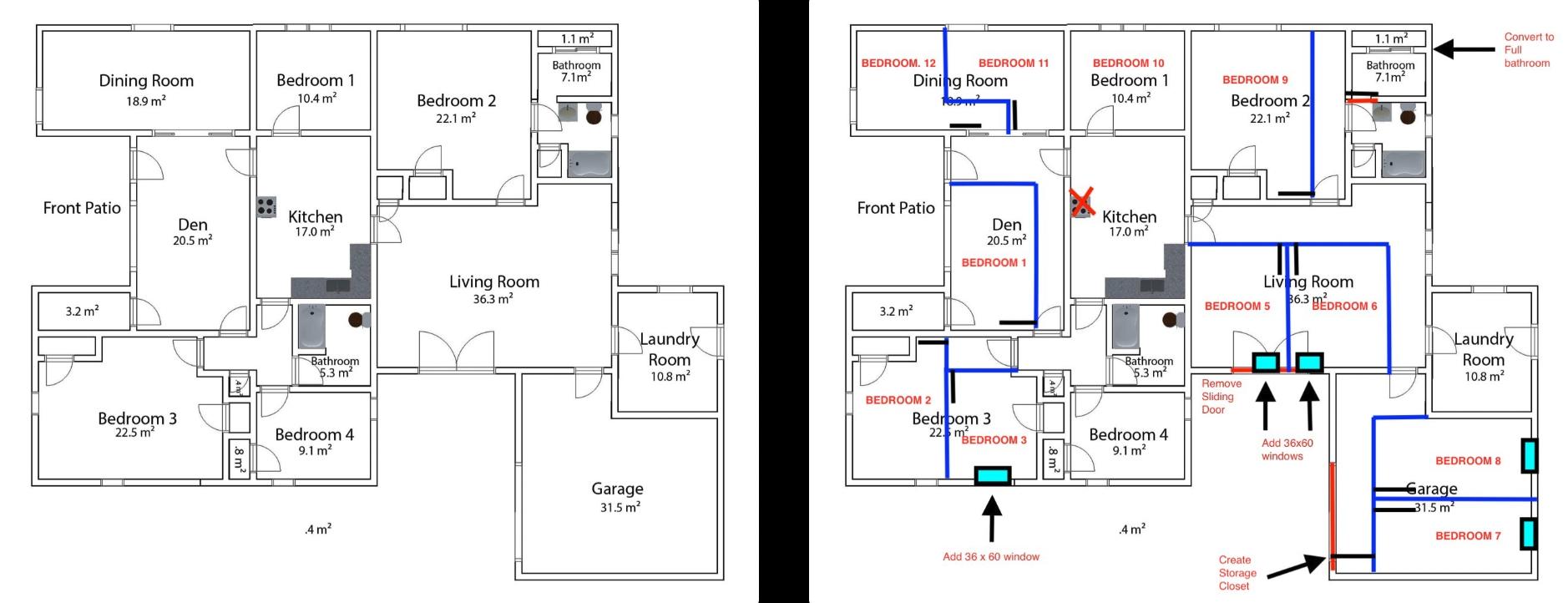

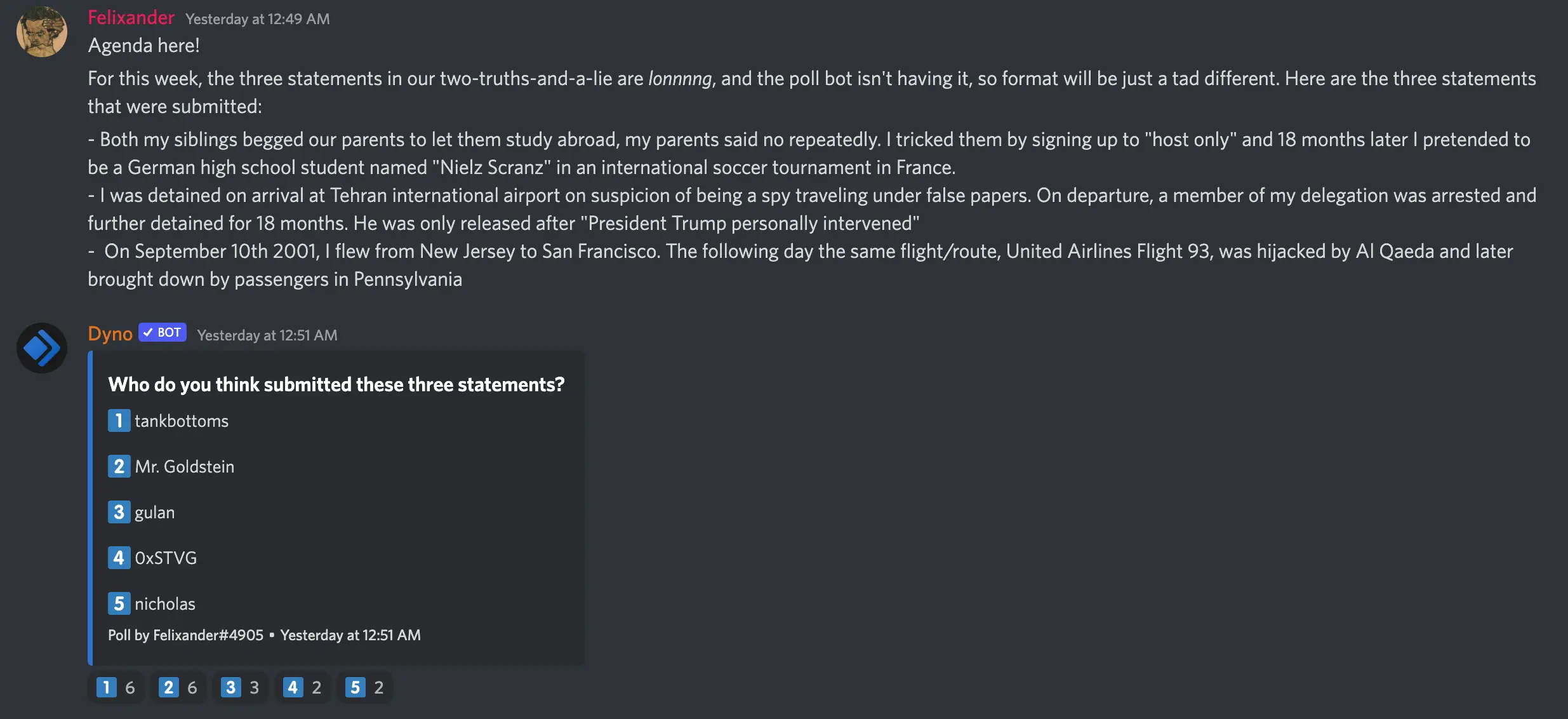
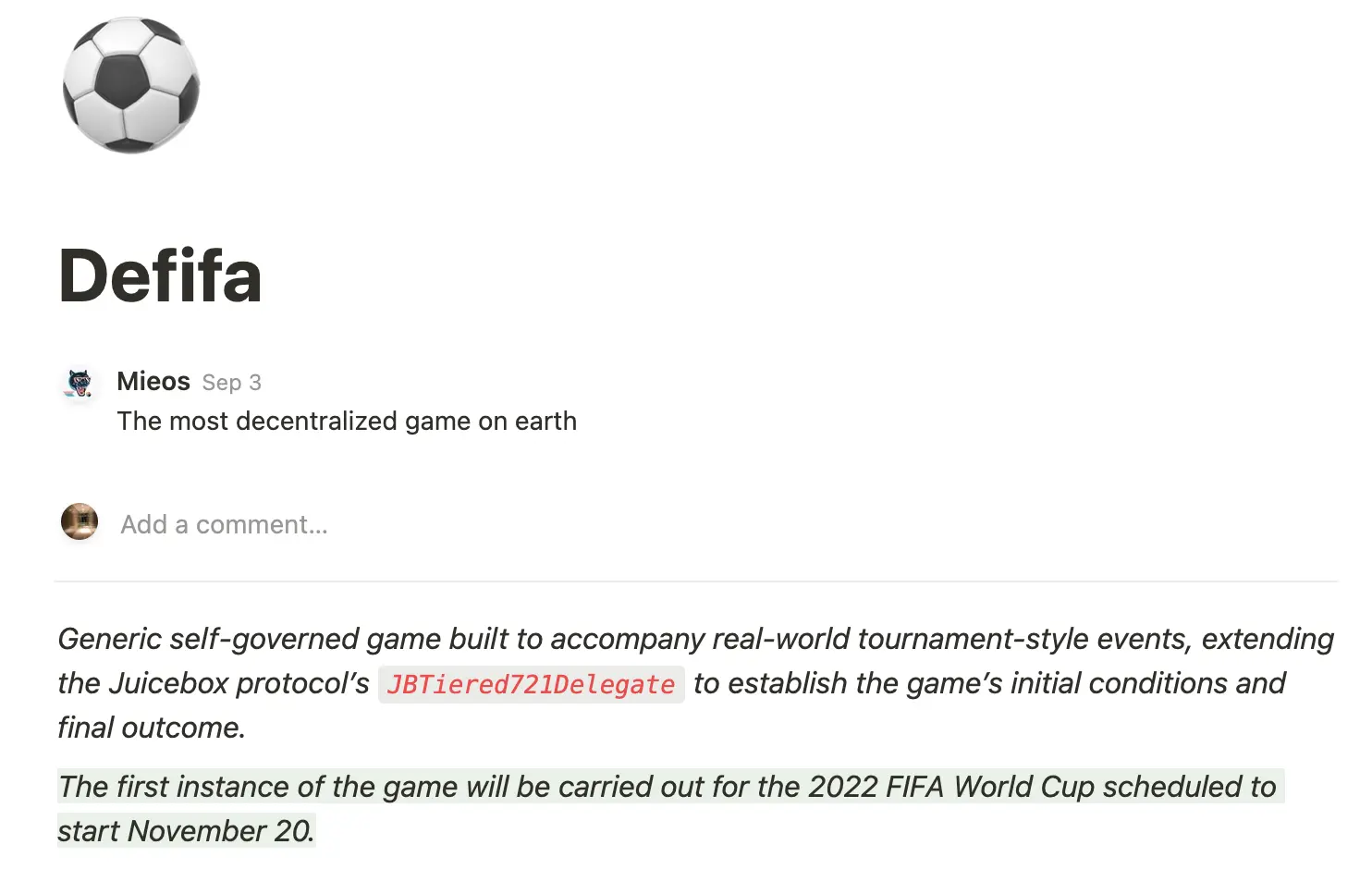
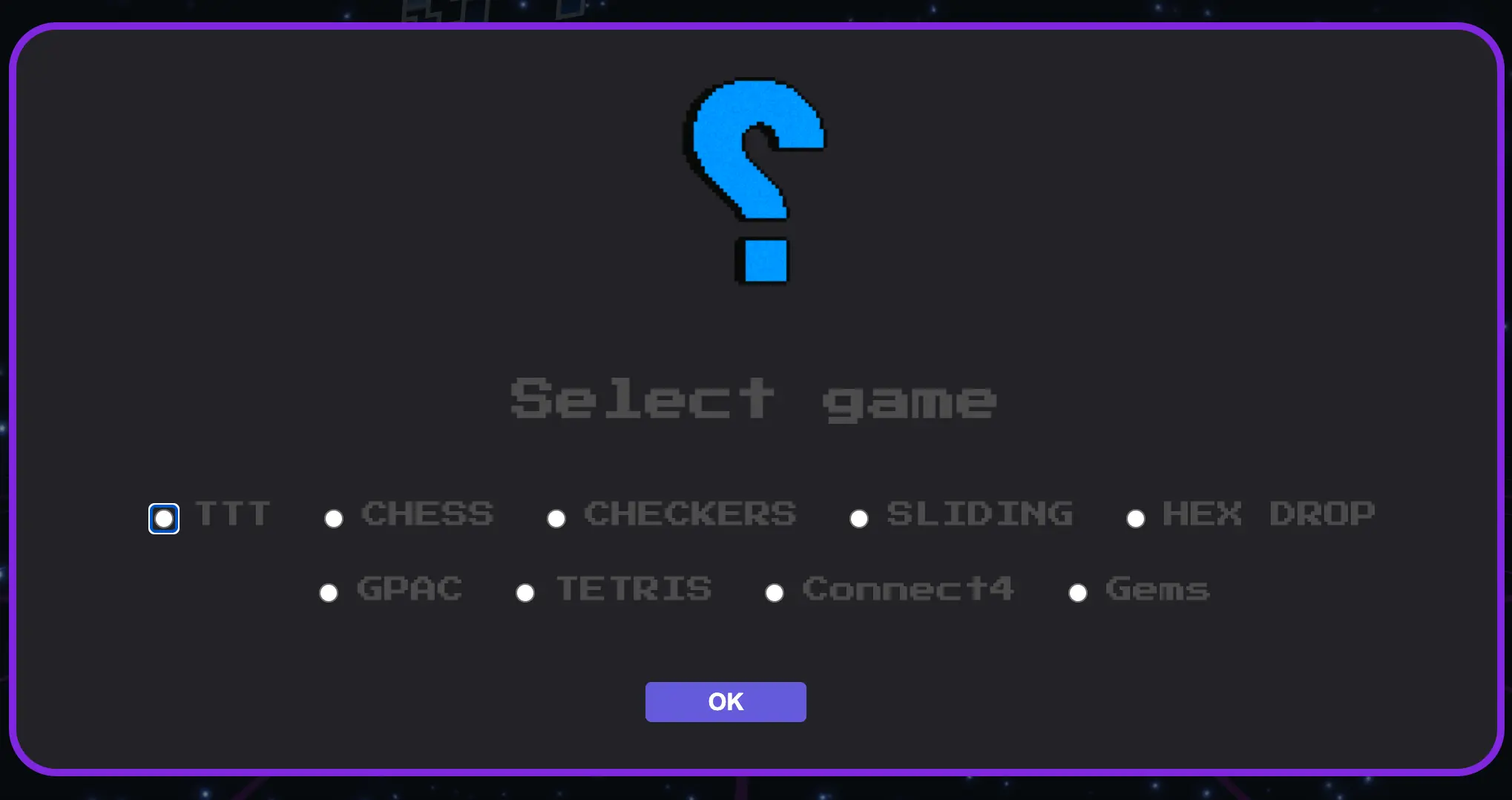
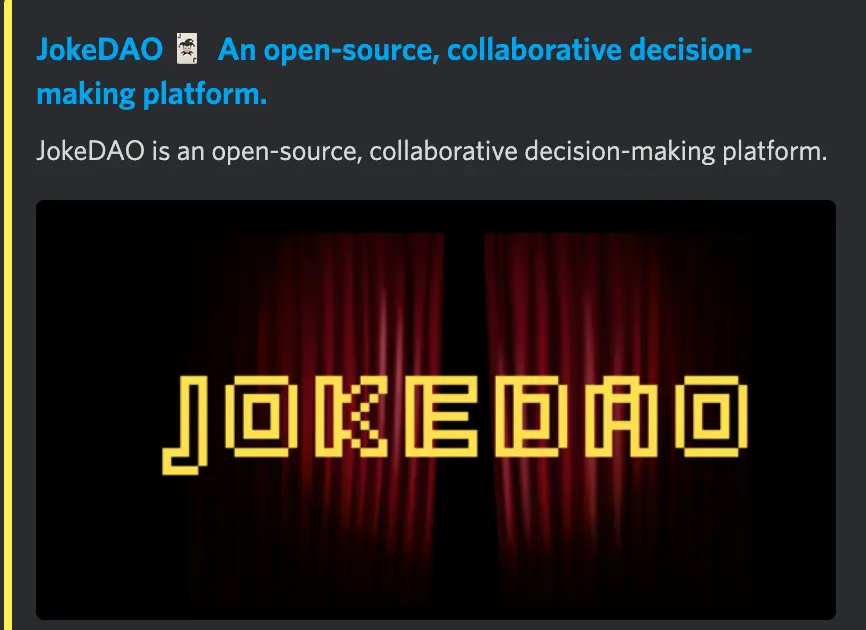
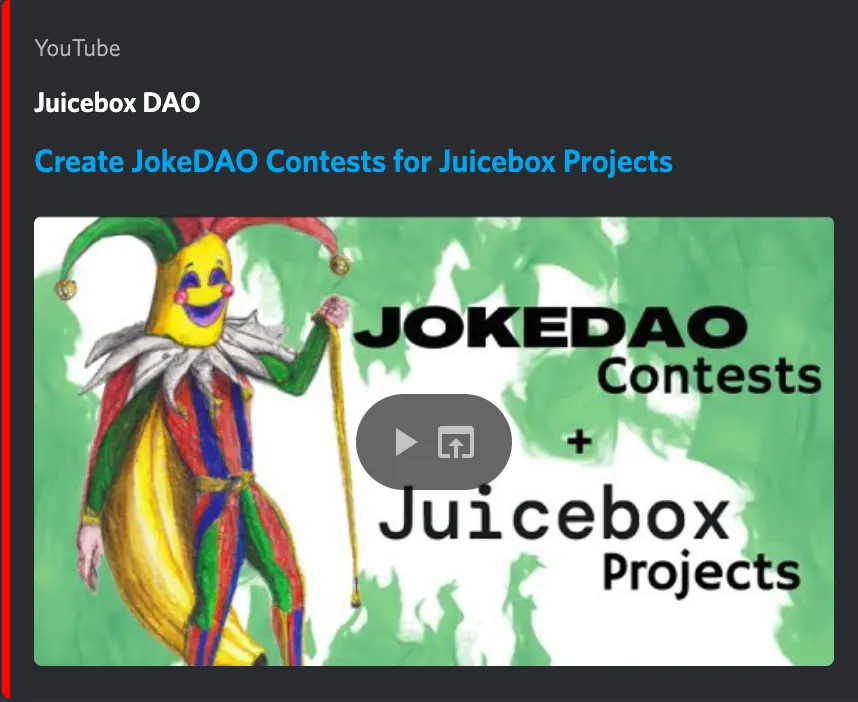

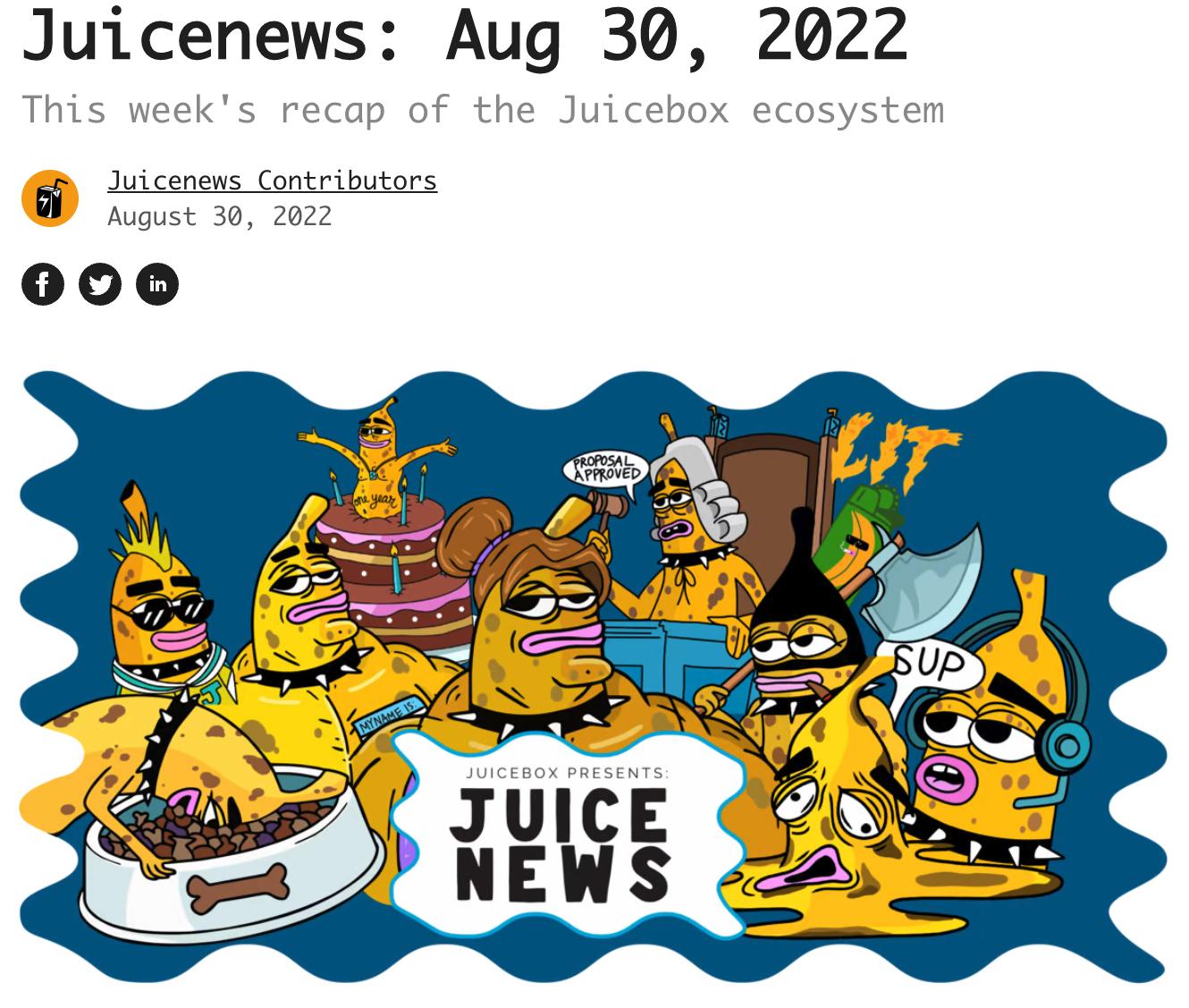
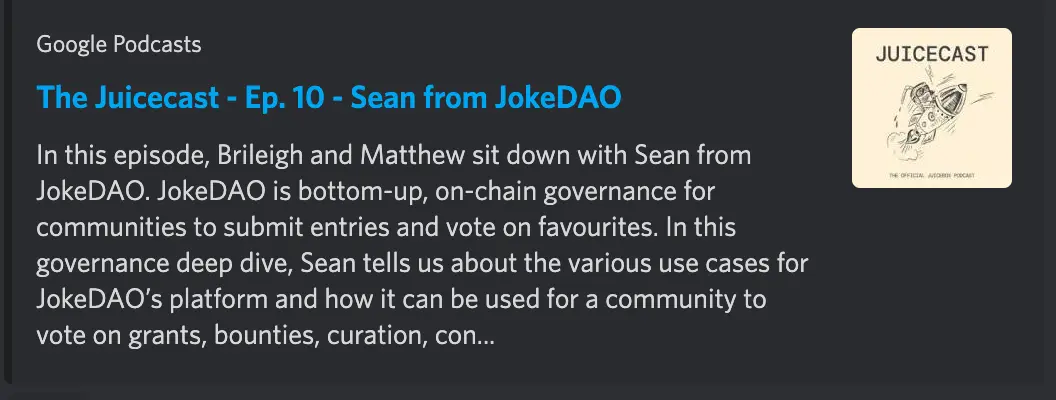
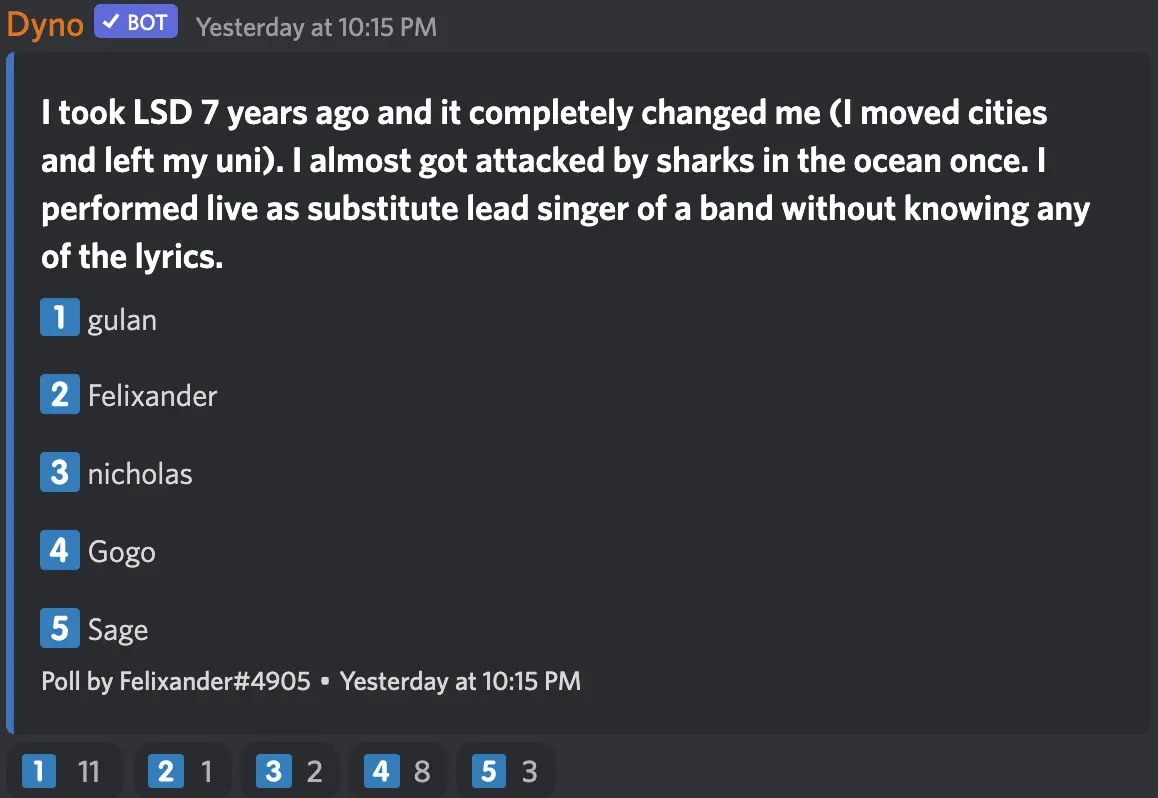
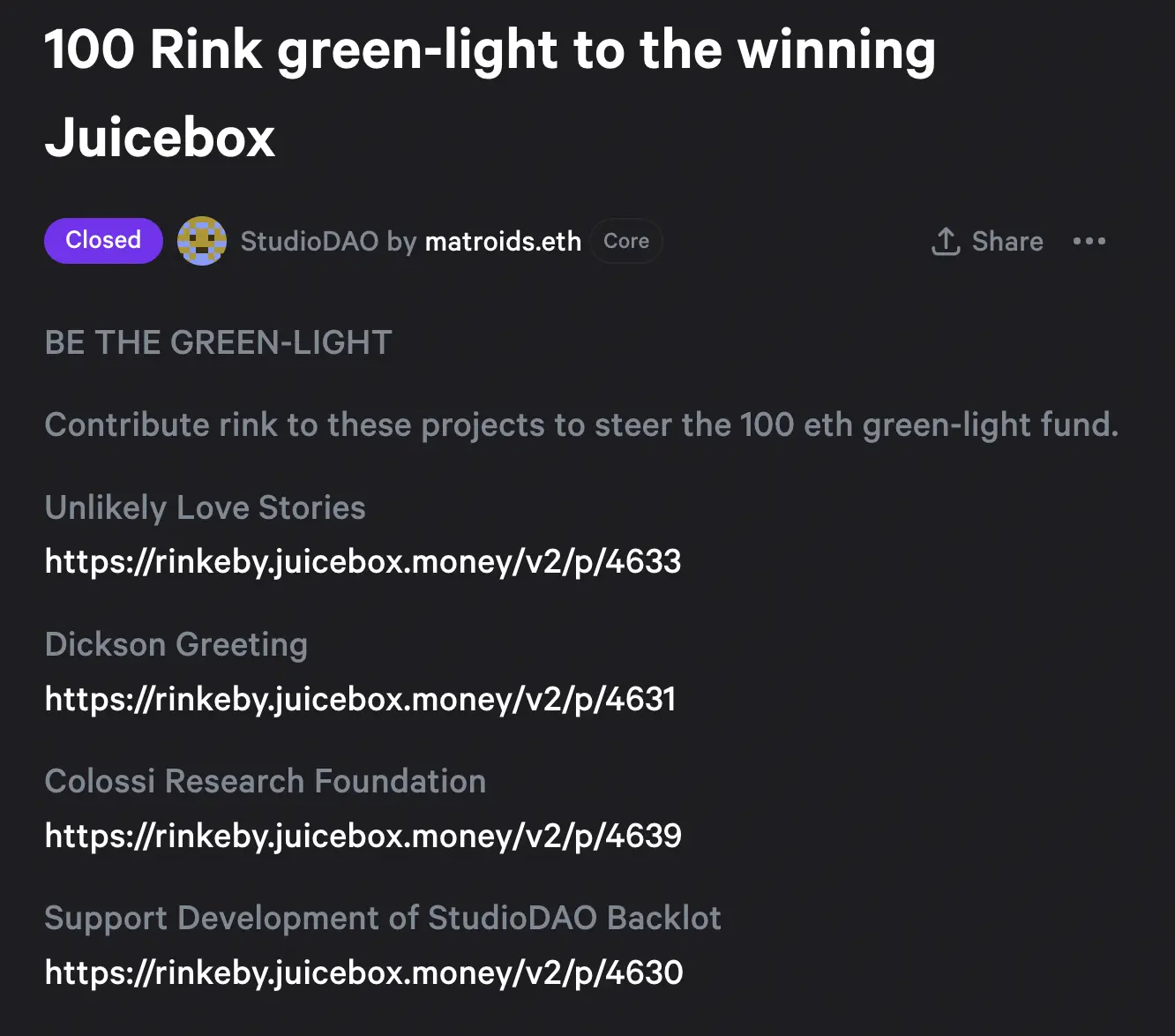
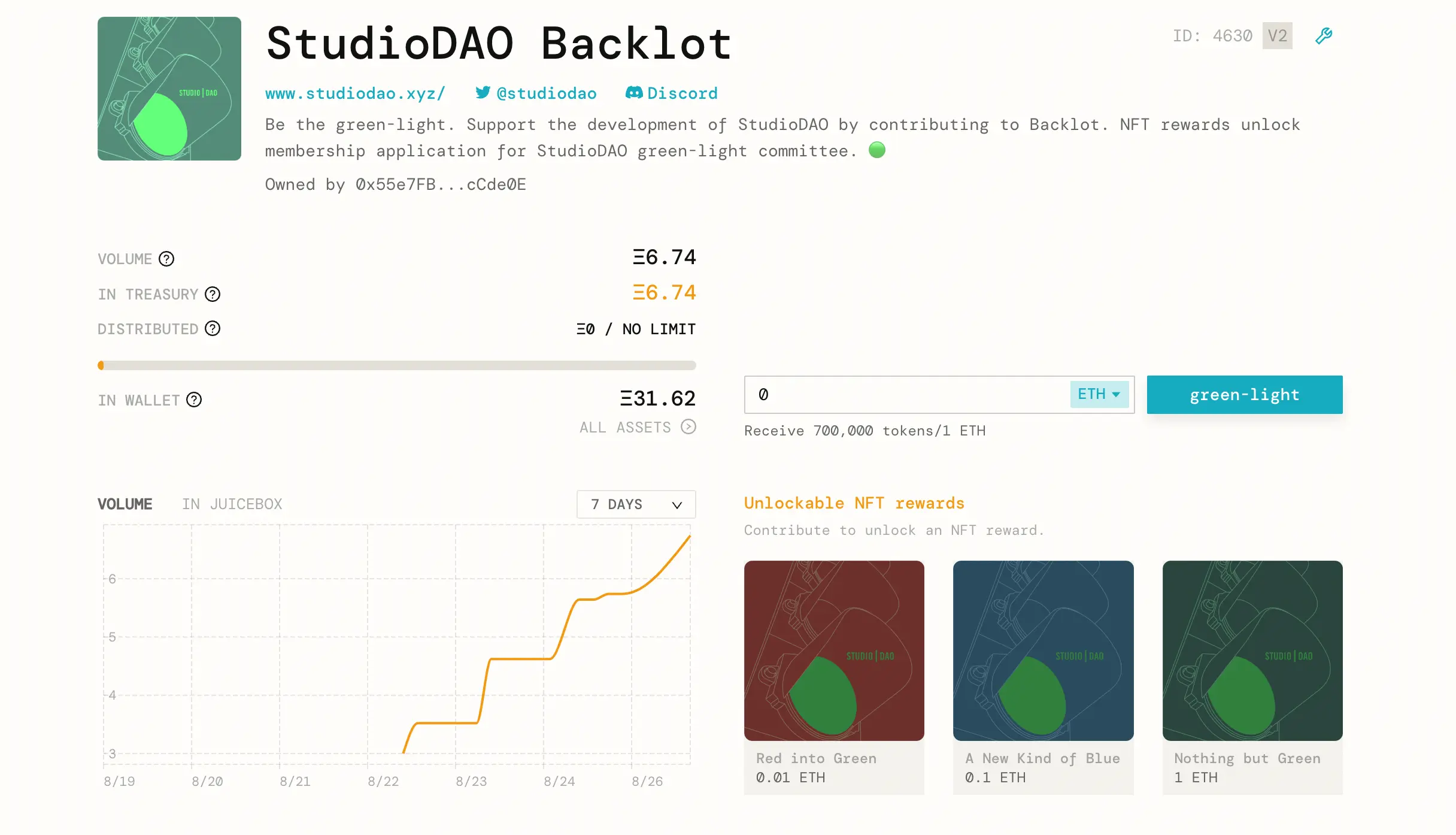
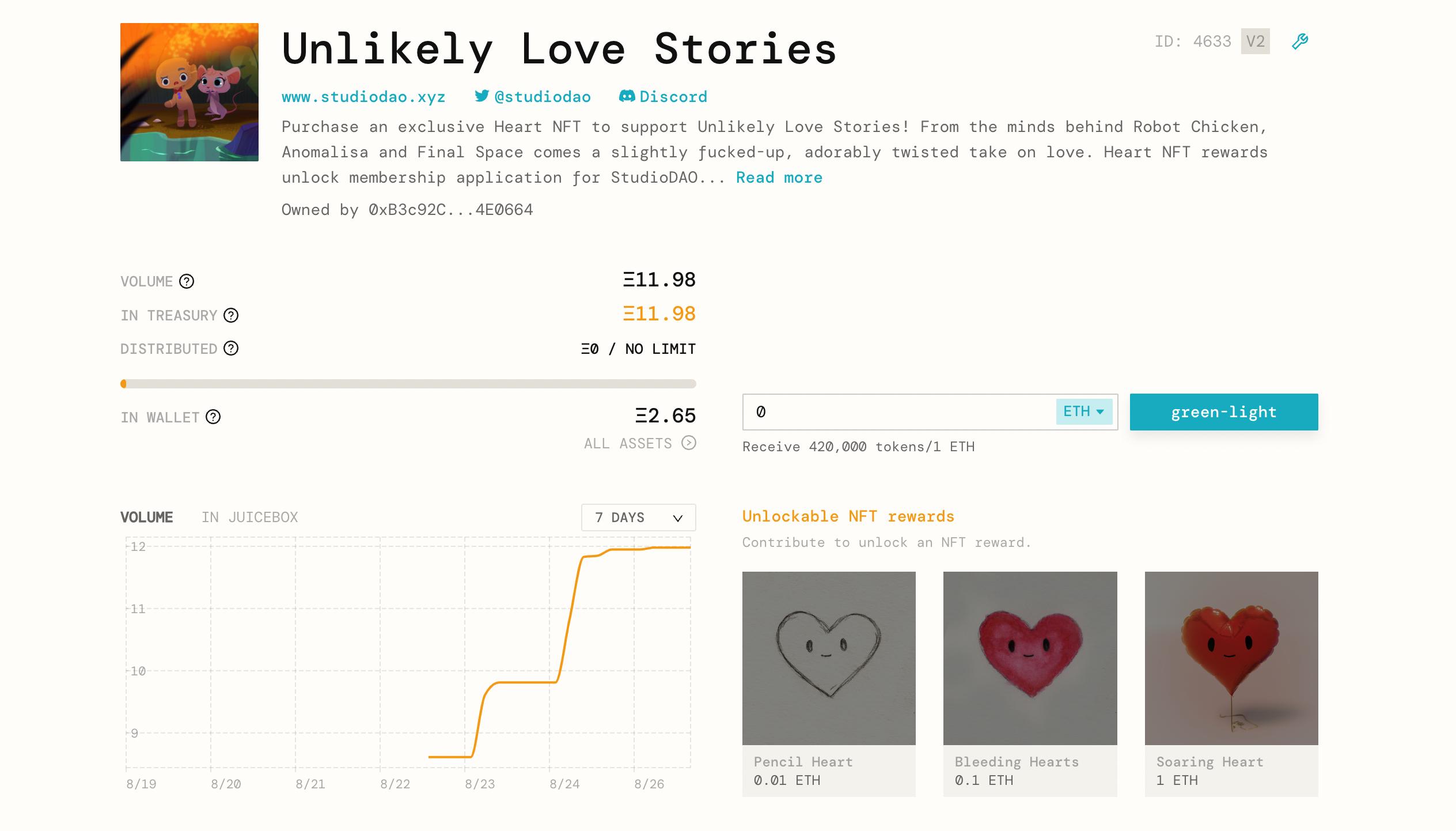
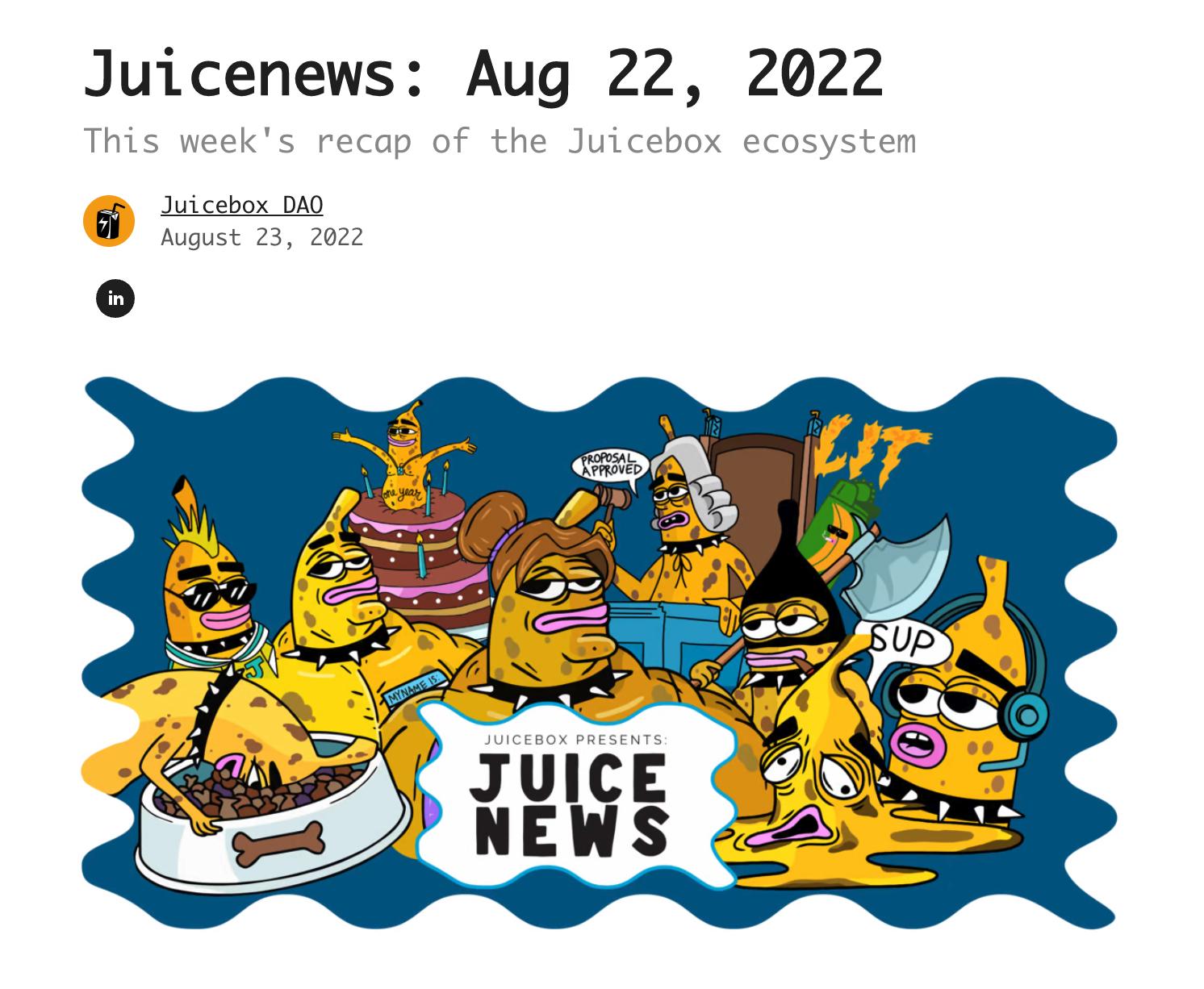
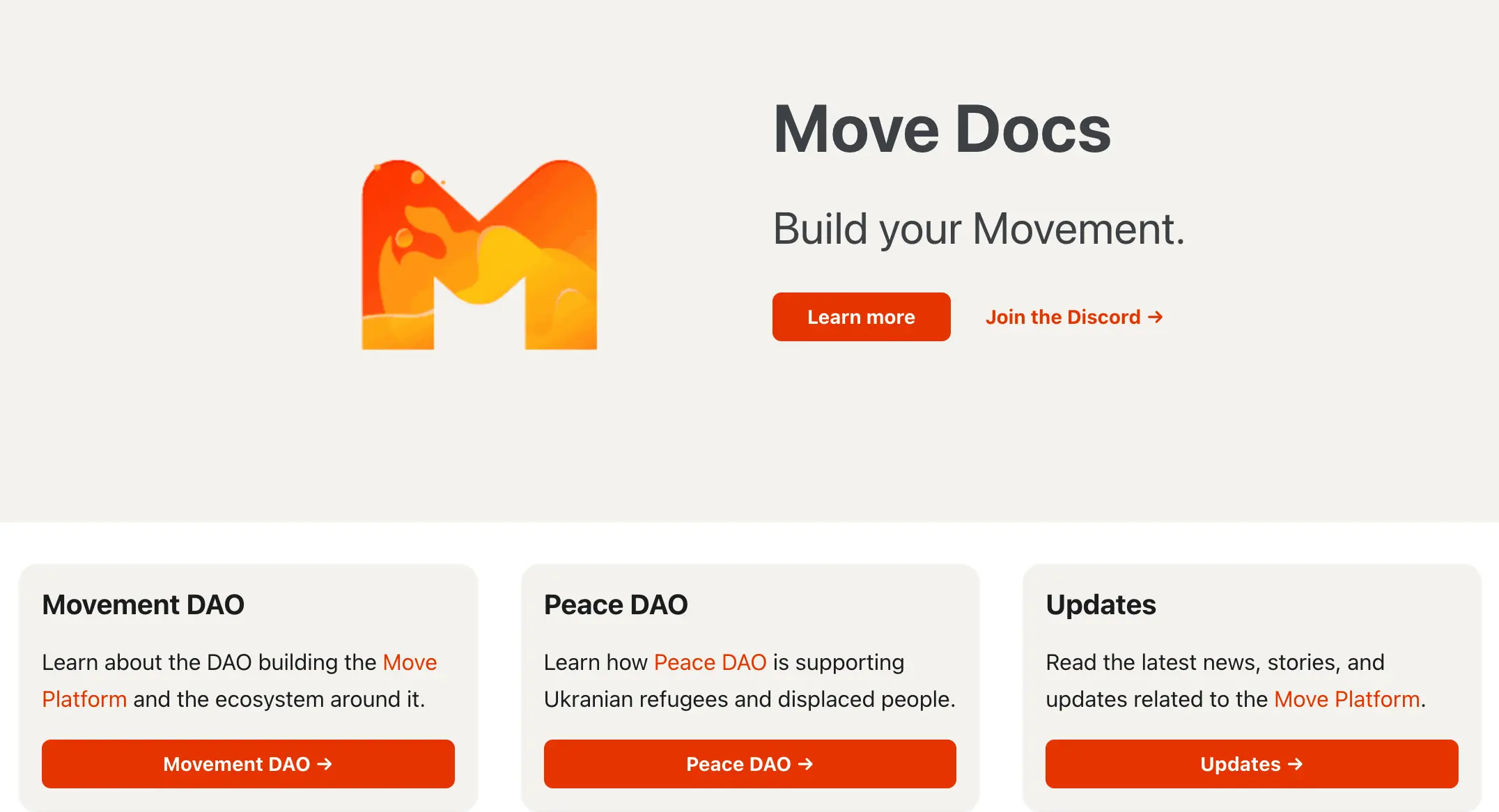
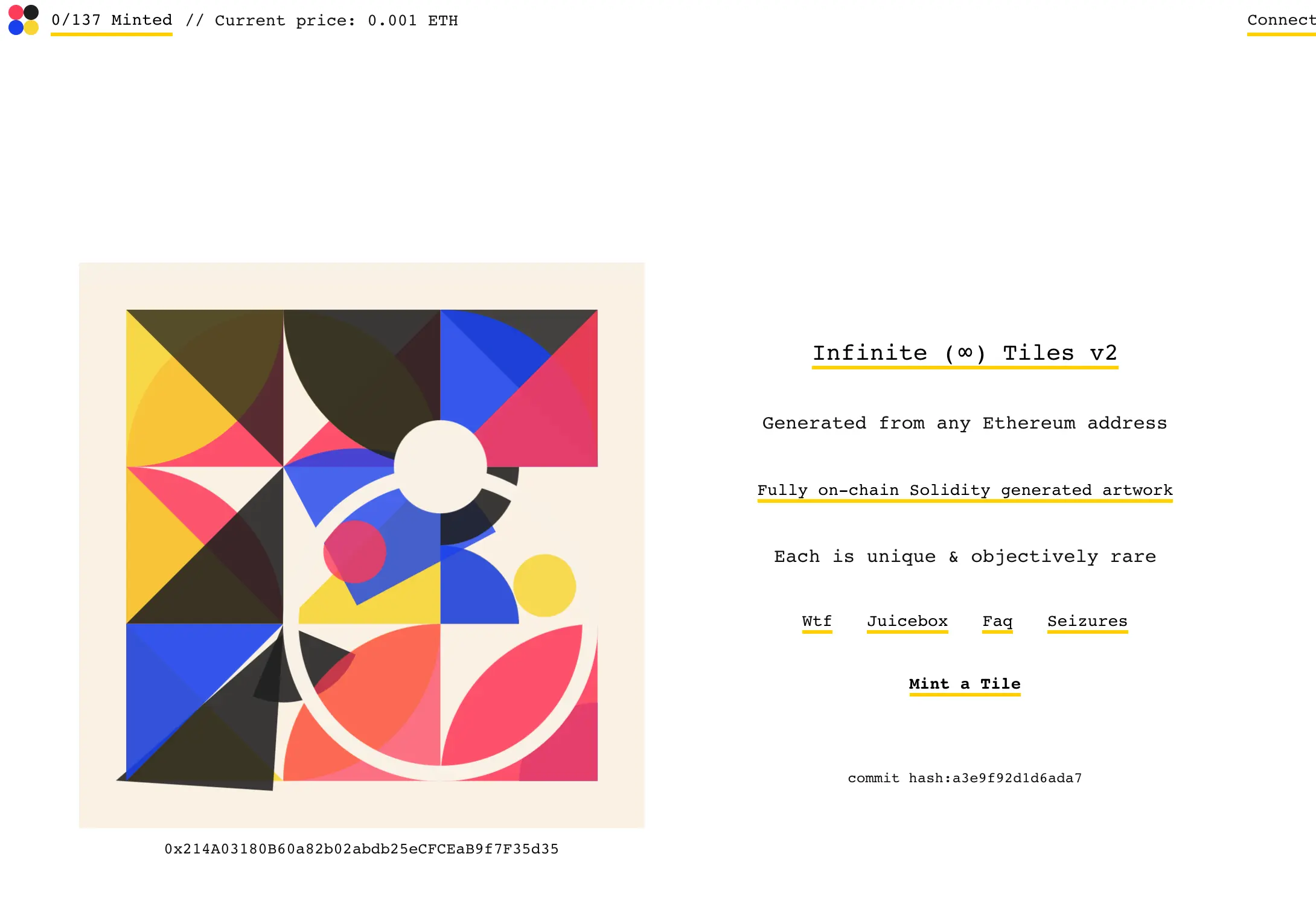


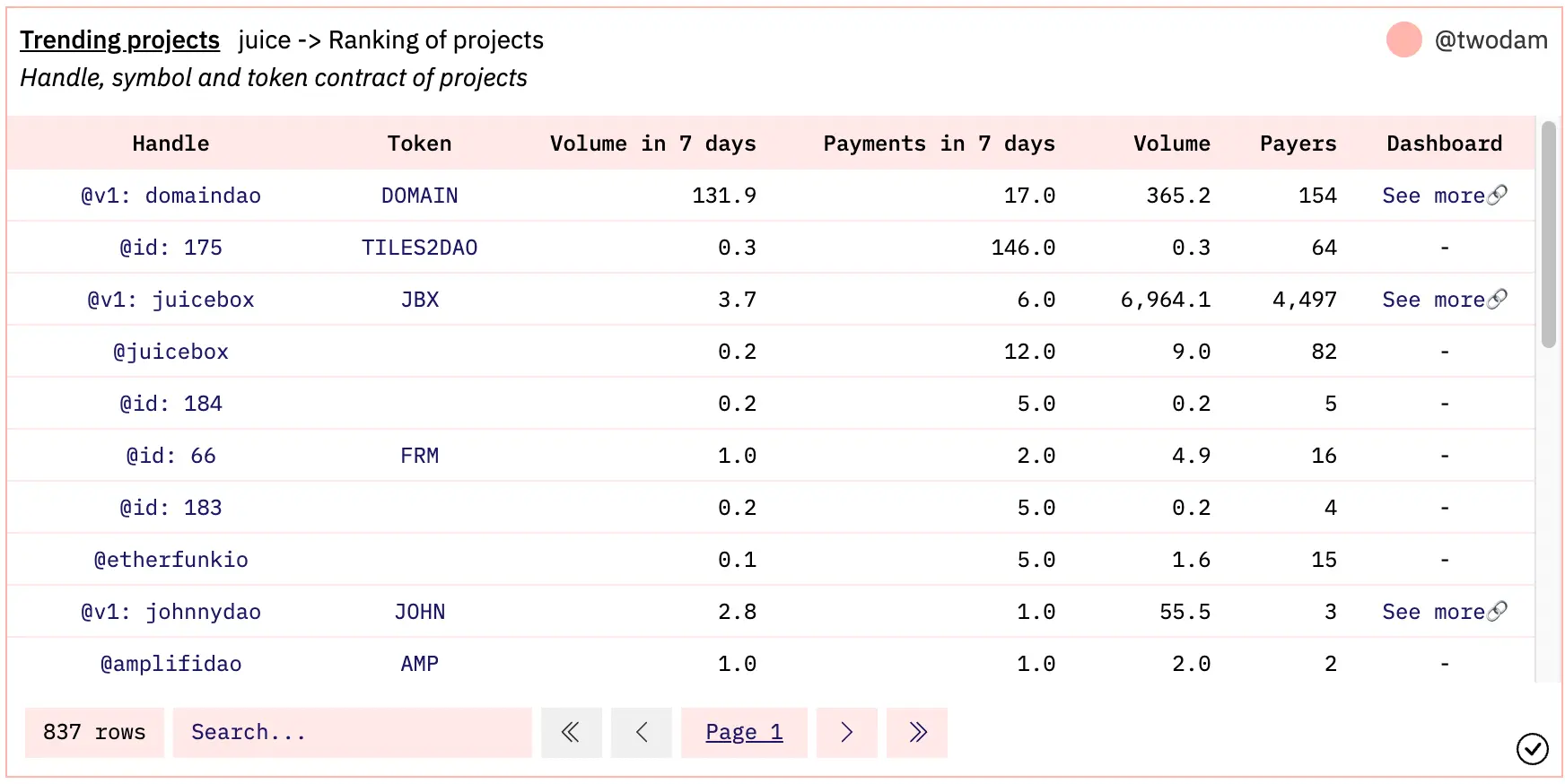
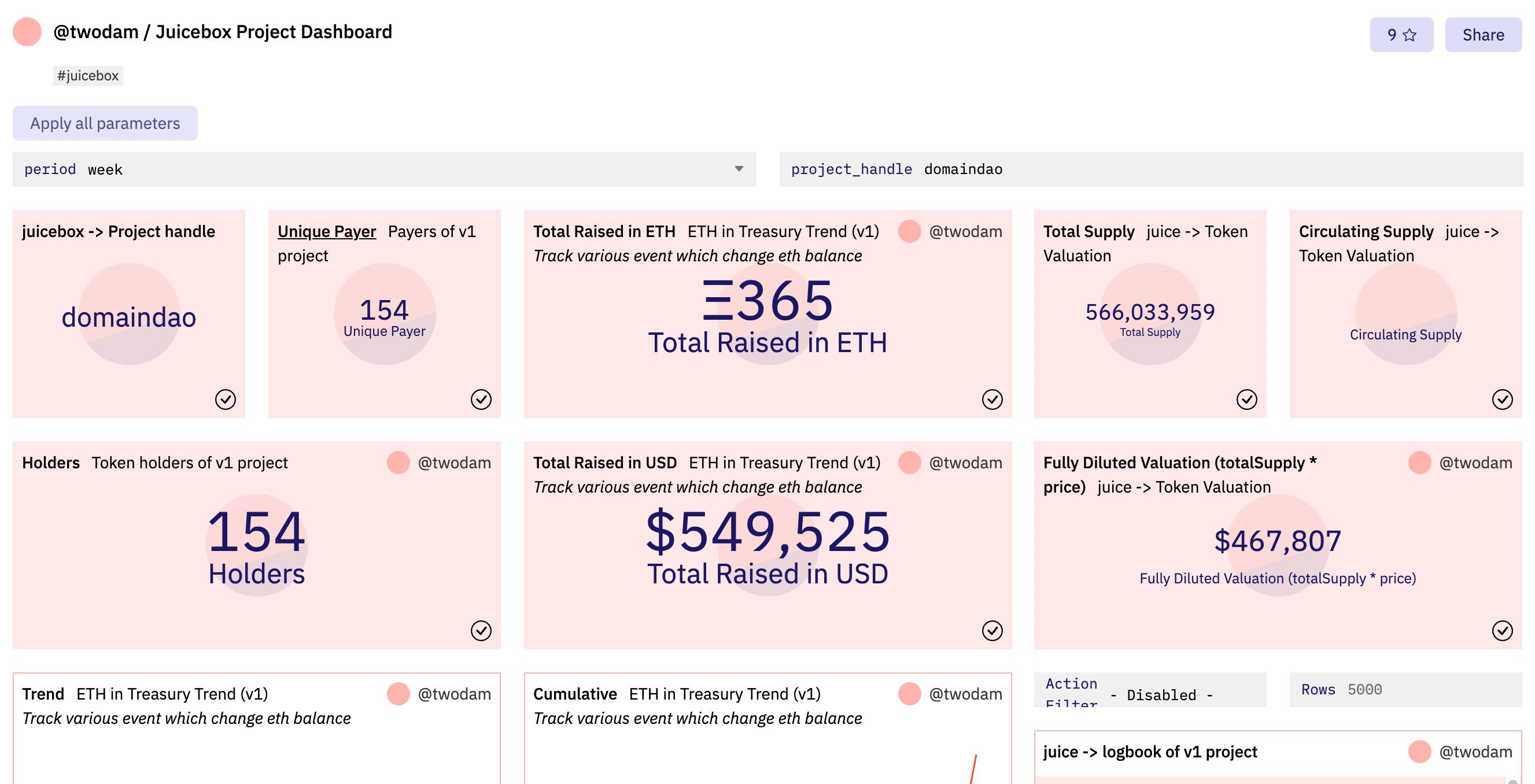
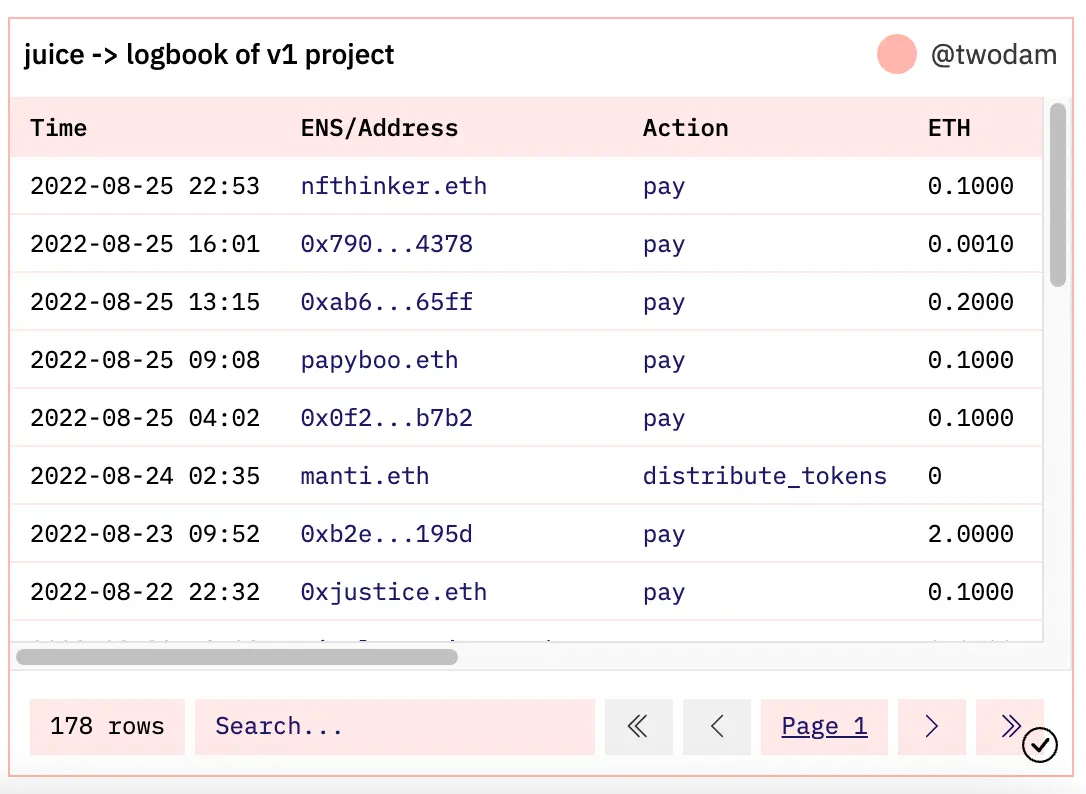
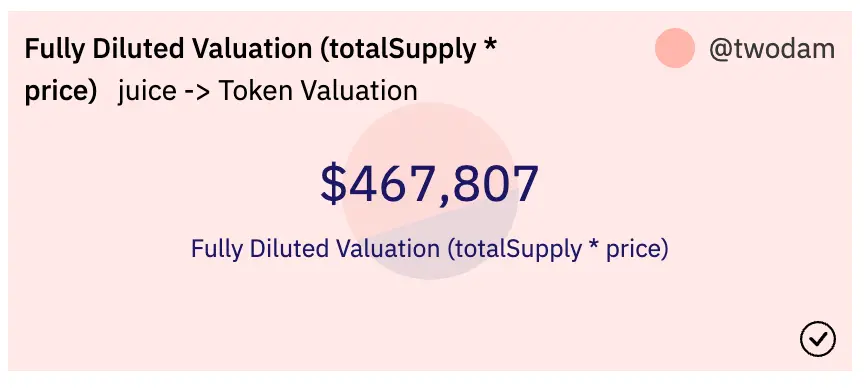
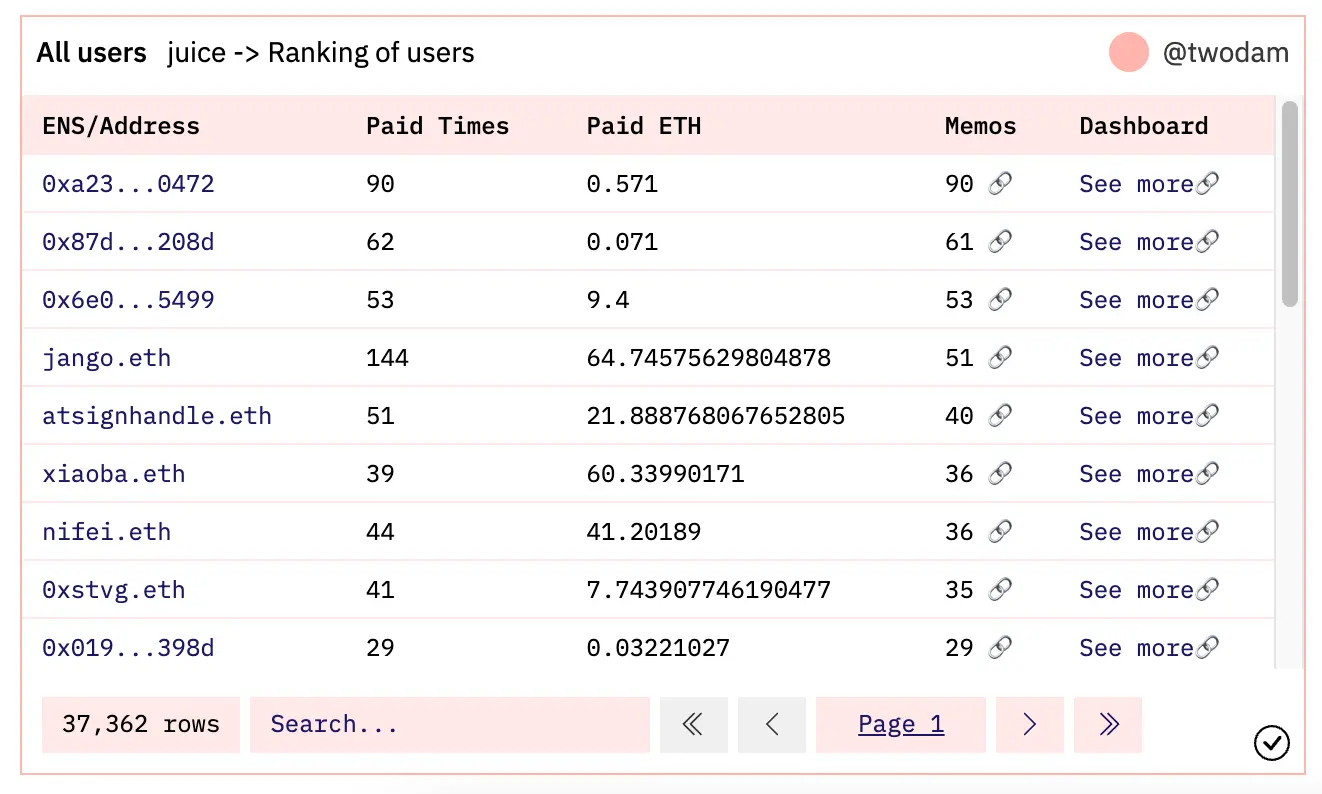 If you click the
If you click the 